Results 1 to 1 of 1
-
03-24-2020, 09:17 AM #1
All Time OIlers Part 4 (87-88 thorugh 89-90)
Hello!
My thread history tells me it's been over a year since I posted part three in this series. I've been lazy. I'll admit two things about writing up these threads: First, it's a lot of fun. Many of the players I know, some I even know a great deal about. Lots of them - especially the more obscure guys - I don't know much of anything. It's a great excuse to learn some interesting stuff about some of these players, and a great excuse to go through my collection again. Second, while giving each player a proper write up is a great way to do this - it's VERY time consuming. Funny thing though..... like a lot of people I'm sure, I've had a little extra free time lately :)
What is this collection? I collect all-time Oilers. My collection is built around having four types of cards for any player who ever played a game for the Oilers: A Rookie Card, and Autograph, a Memoribilia Card, and a card showing them as an Oiler. If I can do this with a single card (i.e. a Devan Dubnyk Cup Rookie/Auto/Patch) I will. If I need four cards to do it, I'll do that too.
Of course not every player has all of those cards. Many never had a card showing them as an Oiler. Well over half never had a game used card. Some players only ever had minor league cards, not real NHL Rookie Cards. I typically try and find their "first minor league card" while avoiding team issues, if possible. Autographs? I prefer pack-pulled, certified autographs. Of course those don't exist for many players either - so I have plenty of TTM / IP type autographs in here. Some of them are even on custom cards, and other are even customer "cut signature" cards. Many thanks to @DnJcards for the work on most of those customs.
Before I get to the new show, I'll link my first three parts, in case anyone wants to see them, and missed them the first time around:
Part 3 (83-84 through 86-87): https://www.sportscardforum.com/thre...hrough-1986-87
Part 2 (80-81 through 85-86): https://www.sportscardforum.com/thre...hrough-1982-83
Part 1 (79-80): https://www.sportscardforum.com/thre...lection-Part-1
And time for part four!
1987-88
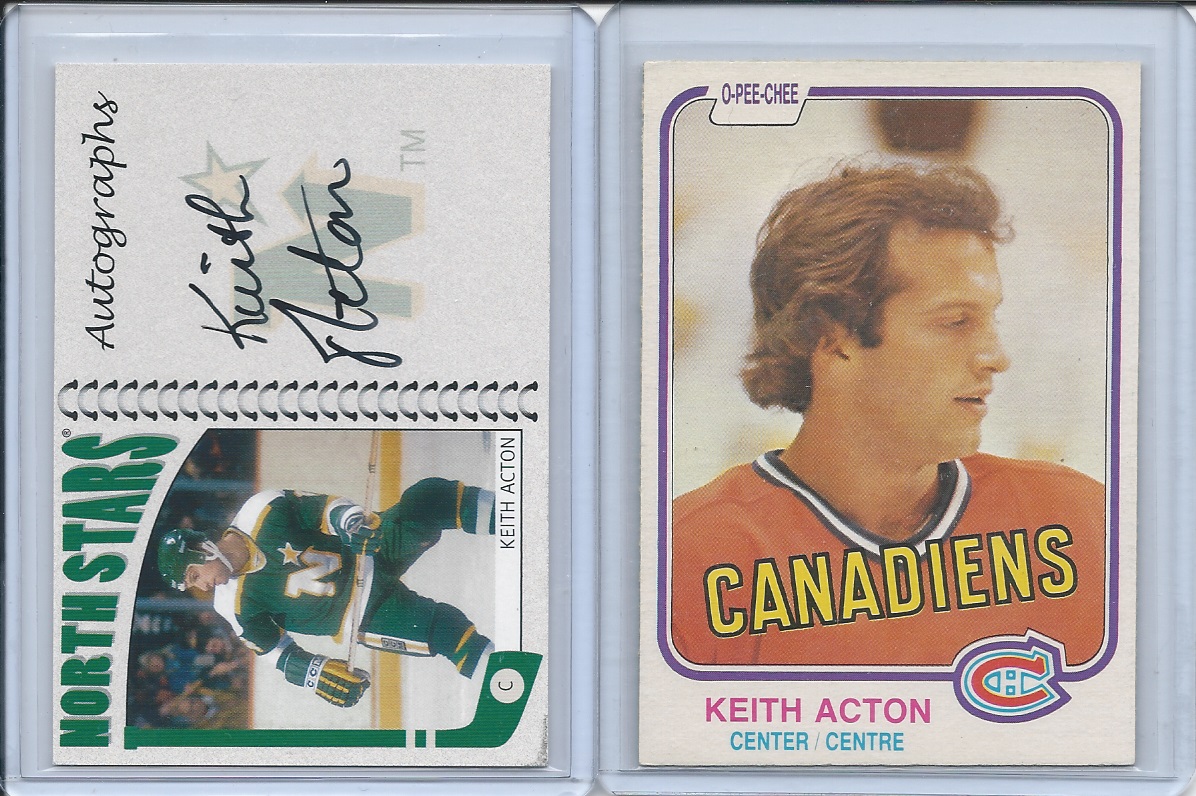
Keith Acton
After racking up 175 points in two and a half seasons with the Peterborough Petes, Keith Acton was picked in the 6th round of the 1978 NHL Entry draft by the Montreal Canadiens.
He'd turn from in the 1978-79 season, playing for the Habs' AHL affiliate, the Nova Scotia Voyagers. He was back with NS the following season, but made his NHL debut with Montreal - playing a pair of games that year, registering his first NHL point.
Acton would start like a typical rookie, low on the depth chart, but his productive play quickly earned him a promotion to the top line in Montreal, where he centered future HOFers Guy Lafleur & Steve Shutt. He put up 88 points in the 1981-82 season, which would be career high.
Only nine games into the 83-84 season, Acton was traded from Montreal in a blockbuster deal. He was packaged with Mark Napier and a draft pick, and sent to Minnesota, for Bobby Smith. Acton continued to score with the North Stars, with 20+ in each of his first three seasons there.
January of 1988 saw Acton traded again. The powerhouse Edmonton Oilers were bulking up for another cup run, and dealt Moe Mantha to get Acton, regarded as one of the best faceoff men in the league. He'd help the Oilers win their 3rd Stanley Cup, in the spring of 1988.
Acton would only be an Oiler for a little more than a calendar year. February of 1989 saw him traded to the Flyers for Dave Brown.
The fall of 1989 would bring two more trades for Acton. First, the Flyers dealt him & goalie Pete Peeters to the Winnipeg Jets for future considerations. Five days later, the Jets sent a package of Acton and goalie Pete Peters to Philadelphia for a 5th round pick & future considerations. These considerations canceled out the considerations owed to Philly from the deal 5 days earlier, as well as what was owed to them from a trade for Shawn Cronin earlier in the summer. Confused? So was I!
The Flyers were stocked with talent, and were afriad of losing players in the annual Waiver draft. They traded Acton & Peeters to Winnipeg (who had unused space, and could protect them) with the understanding that they'd be traded back to Philly five days later. Winnipeg got to erase the futures owed from an earlier deal, and got a 5th round pick for their troubles. The league later fined both teams $10,000 for the illegal "loaning" of players.
Acton was done in Philly after the 92-93 season. He'd play one more year in the NHL, splitting the season with the Islanders & Capitals. He played a dozen games for the Hershy Bears in 1994-95, before retiring from playing, and imediatly taking an assistant coaching job with Philly.
Acton has held coaching jobs with Philadelphia, New York (Rangers), Toronto, Columbus, and Edmonton for as many seasons (18) as he played in the NHL. His son, Will, made his NHL debut for Edmonton in 2013-14.
Pictured are Acton's 81-82 OPC Rookie Card, and his ITG Franchises Autograph.
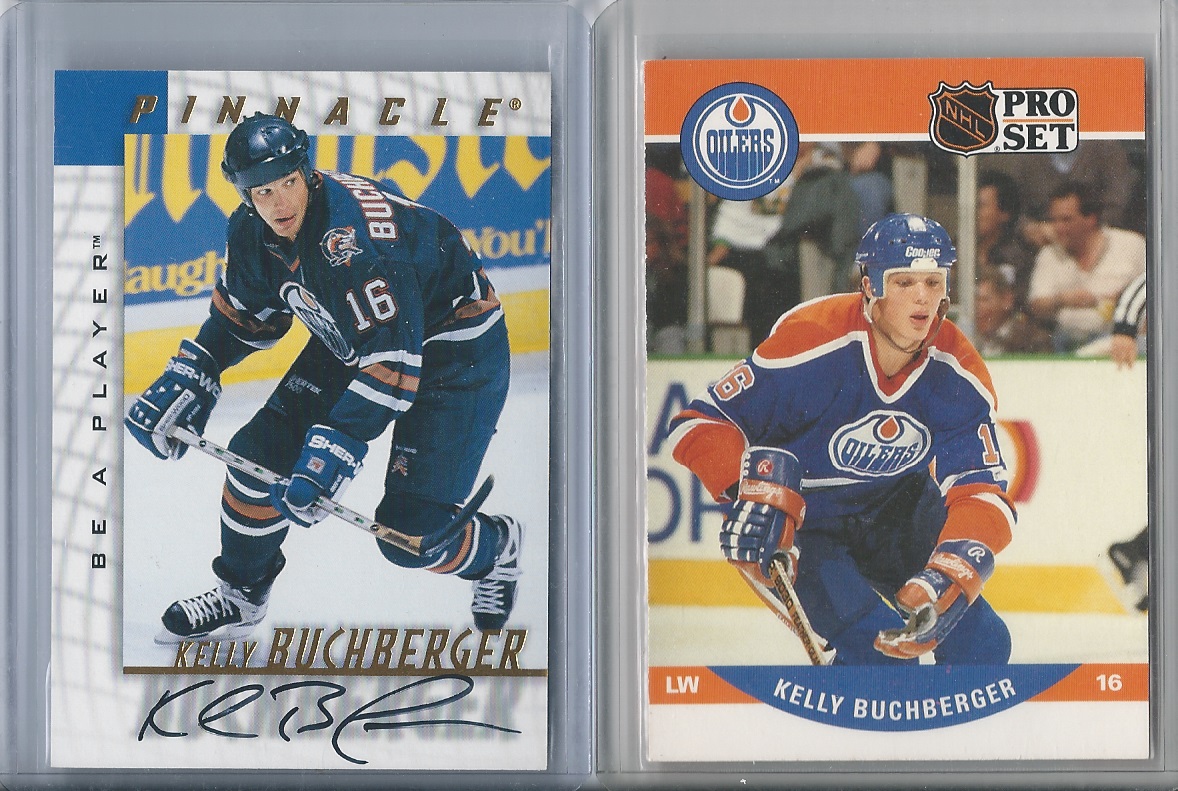
Kelly Buchberger
When we look back at the 1985 Entry Draft, it's probably safe to call Igor Larionov the "steal of the draft". The HOFer was taken in the 11th round, 214th overall. Of course these were different times. Russian players like Larionov were known to be potential superstars, it just wasn't known that they'd ever play in the NHL. The question was simply: When will a team throw away a pick on these guys?
Next up on the steal list? It has to be Edmonton's 9th round pick (188th overall): Kelly Buchberger. Of the 252 players drafted in 1985, only Joe Nieuwendyke logged more games played (1257) than Buchberger (1182).
Kelly would spend one more year in junior, with Moose Jaw, before turning pro in 1986-87 with the Nova Scotia Oilers. He'd spend the entire regular season in the minors, but did play three games in the 1987 Stanley Cup final.
He'd make his regular season debut in 1987-88 (scoring once, in 19 games). The 1988-89 season saw him become a full-time NHLer, something he'd do until retiring following the NHL lockout of 2004-05.
Buchberger played 12 seasons in Edmonton. He's the career leaders in PIMs by an Oiler (1747),and is 6th in games played (795). After Shayne Corson signed with the St. Louis Blues in 1995, Buchberger was named Captain of the Oilers - a role which he took on for four seasons. He was left exposed in the 1999 Expansion draft, and was selected by the Atlanta Thrashers, where he was named Captain for their inaugural season.
He wouldn't finish the season in Atlanta. He was dealt to the LA Kings in March of that season, finsihing the year there. He'd spend two more seasons in Hollywood, before signing free agent deals to play with Phoenix in 2002-03, and Pittsburgh in 2003-04. The NHL was locked out for the 04-05 season, and Buchberger never returned.
Kelly racked up 2297 career PIMs, good for 34th all time. He's one of just 190 NHL skaters to break the 1100 Games Played mark. He won two Stanley Cups with the Oilers (1987, 1990) and was the last player to have won a cup with the Oilers, to still play with the Oilers (though goalie Bill Ranford was resigned for the following season, after Buchberger was claimed). Buchberger would also represent Canada at the World Championships three times: 1993, 1994, and 1996 - Winning Gold in '94, and Silver in '96.
Following retirement, Buchberger got into coaching with the Oilers. Starting with their AHL team in 04-05 as an assistant, he later became the Head Coach in the AHL, before getting promoted to Assistant Coach in the NHL in 2008. He eventually moved into player personnel with the team, before heading to the New York Islanders to coach on Doug Weight's staff in 2017-18. He spend this past season as the head coach of the Tri-City Americans.
Pictured are Buchberger's 1990-91 ProSet Rookie Card, and his 97-98 BAP Autograph.
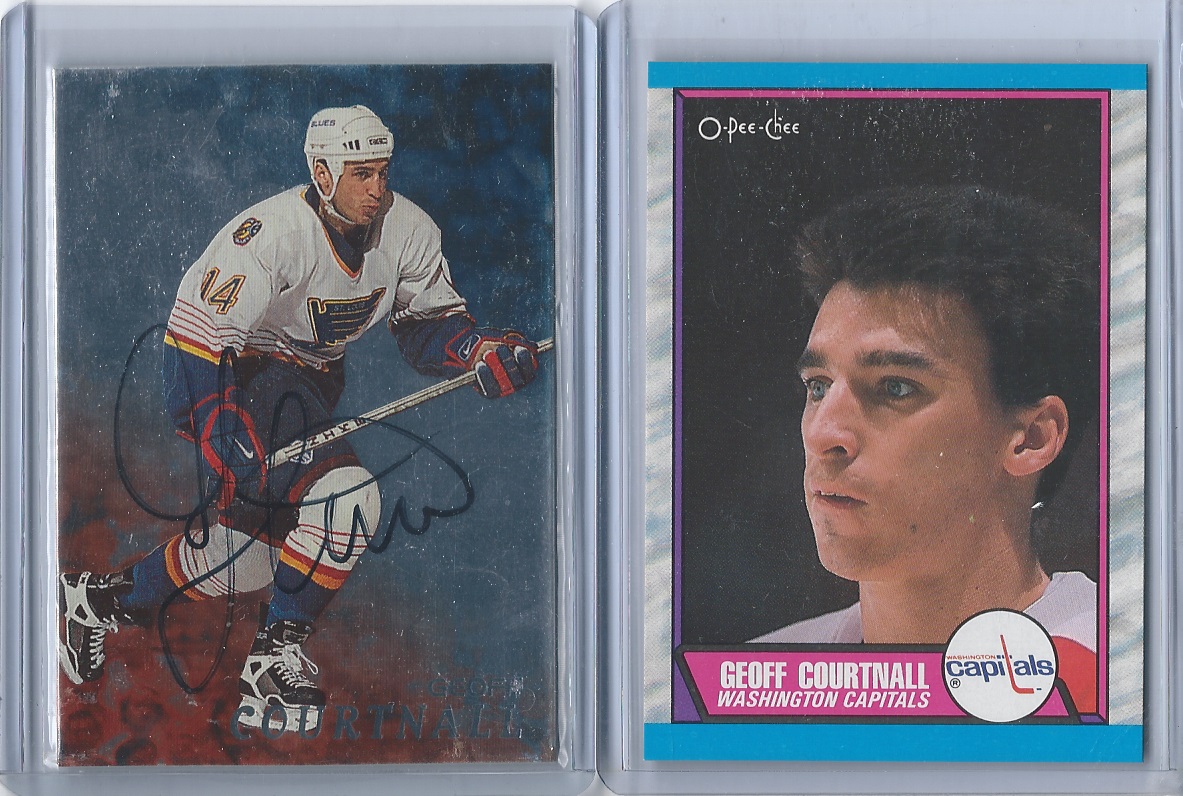
Geoff Courtnall
Geoff Courtnall scored 35 & 41 goals in his final two seasons of junior, with the WHL's Victoria Cougars, but was never selected in the NHL entry draft. He signed with the Boston Bruins as an undrafted free agent. He'd make his NHL debut with the Bruins in 1983-84, when he suited up for 5 NHL games. The next two seasons would Courtall spend the bulk of the year with Boston, but he still had a couple of brief stops in the AHL. The 1986-87 would see him become a full-time NHLer, and he'd never again head back to the minors.
After nearly 5 seasons in the Bruins organization, Courtnall was used as a trade deadline chip. He was a packaged up with Bill Ranford, and dealt to the Oilers for Andy Moog. He'd play a dozen games down the stretch for the Oilers, and was a regular in the lineup for the postseason, where he helped Edmonton win it's fourth Stanley Cup in five years.
Courtnall's time in Edmonton would be short though. After that Cup victory, he was dealt to Washington for Greg Adams.
He'd be traded again after just two seasons in Washington, to the St. Louis Blues for Mike Lalor and Peter Zezel. Not a player that teams "didn't want", he was an asset that teams continued to want to trade for. He spend less than a season with the Blues before moving in another Blockbuster: St. Louis sent Courtnall, Robert Deirk, Sergio Momesso, and Cliff Ronning to the Vancouver Canucks for Garth Butcher & Dan Quinn.
Courtnall would help turn around a Canucks franchise that hadn't had a lot of recent success. After wrapping up the 90-91 season there, he was part of an emerging core that got all the way to the Stanley Cup finals in 1994. After that Cup run, he'd play one more season in Vancouver before leaving as a free agent and returning to St. Louis.
Geoff spent five more seasons in St. Louis, including the 97-98 season when he scored 31 goals & played in his 1000th NHL game. The 98-99 season saw him have trouble with concussions, and limited his games. After fighting to get back to playing, Courntall was concussed again in 99-00, and had to call it a career.
Courtnall has strong family ties in the NHL. His brother Russ was a 1st round pick of the Maple Leafs in 1983, and had a 19 year NHL career with the Leafs, Habs, Stars, Cancucks (where he & Geoff played together for a season), Rangers, and Kings. Geoff's son, Justin, with drafted 210th overall by Tampa Bay in 2007.
Pictured are Courtnall's 89-90 OPC Rookie Card, and a 97-98 BAP Autograph.
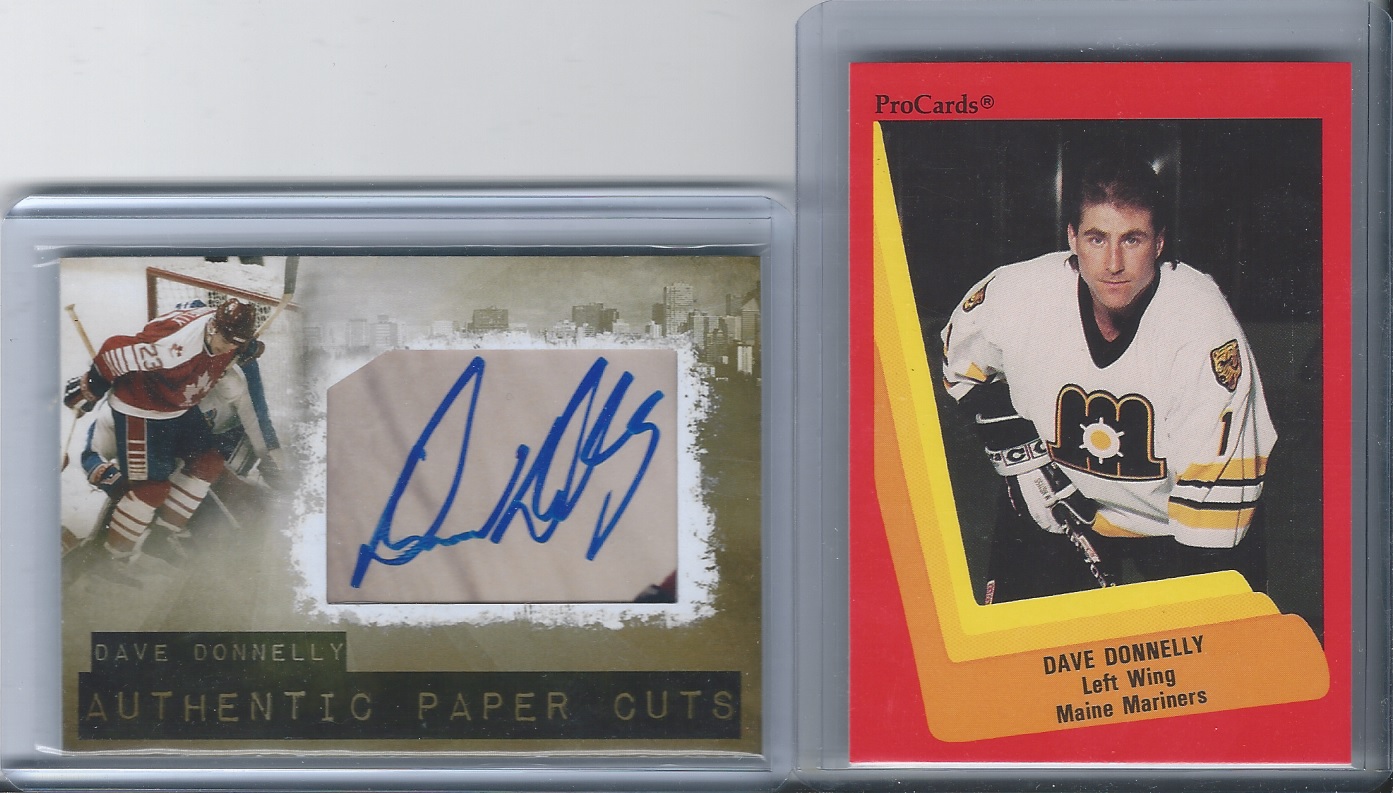
Dave Donnelly
An Edmonton native, Dave Donnelly was drafted by the Minnesota North Stars in the 2nd round of the 1981 NHL Entry Draft, 27th overall. He'd never play for the North Stars though.
Instead of turning pro, he played two seasons with the University of North Dakota, and was traded to the Boston Bruins (as "the future considerations" from an earlier deal). He spent the bulk of the 1983-84 season with the Canadian National Team, represented Canada at the 1984 Winter Olympics, and made his NHL debut with Boston during the 83-84 season.
The spring of 1986 saw Donnelly traded to the Detroit Red Wings, but he never actually suited up for a game there. He signed as a free agent with the Chicago Blackhawks that summer, and played in 71 contests in the 86-87 season. He was dealt to the Edmonton Oilers in October of 1987, but only played four games with the Oilers - his final four in the NHL. He spent the next two seasons in Europe, the 90-91 season with Maine of the AHL, and had one last tour with the Canadian National team in 1991-92.
Donnelly never had any NHL cards. Pictured are his only minor league card, 90-91 ProCards, and a cut signature card made for me by @DnJcards (shows him with the National Team)
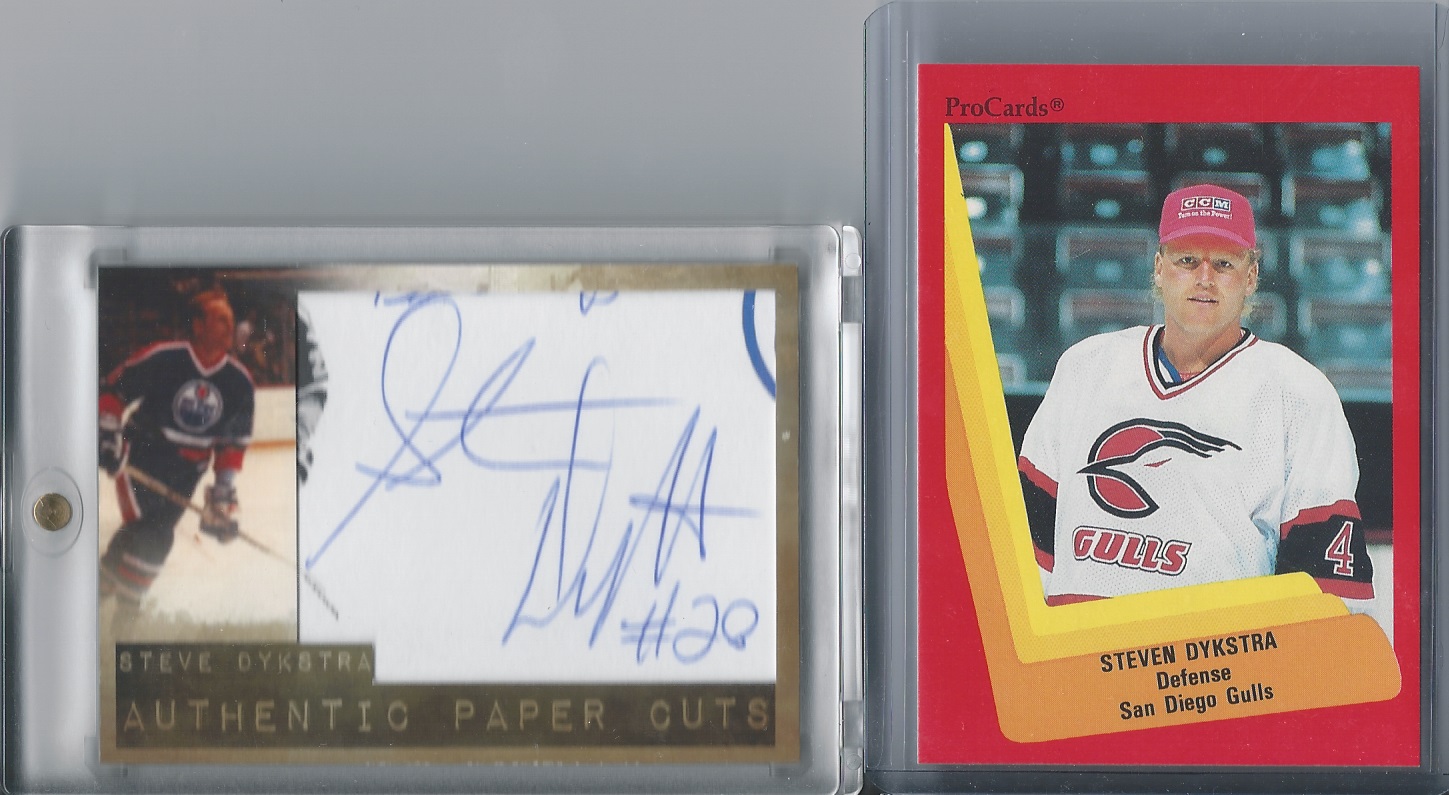
Steve Dykstra
An undrafted Free Agent, Steve Dykstra signed with the Buffalo Sabres in December of 1982. He spent the first few years of his pro-career in the minors - but played 64 games for Buffalo in 1985-86. He split the next two seasons between Buffalo & their AHL affiliate (Rochester Americans) but was mostly a part-time player.
The Sabres traded Dykstra to the Edmonton Oilers in February of 1988. He'd play 15 games for the Oilers down the stretch, but didn't get into any playoff action. He was a member of the team that won the 1988 Stanley Cup, and received a ring, but his name didn't make it on: He played 42 NHL games that year (enough to be included) but only the 15 were with Edmonton.
The Pittsburgh Penguins claimed him off waivers the following fall, and he played 65 games for them that season. He signed with Hartford for the 89-90 season, but only played in 9 games - spending most of his season with the Binghamton Whalers. He was dealt to Boston at the trade deadline, but wasn't promoted from the AHL.
His pro career continued, with stops in the IHL (San Diego Gulls, in 90-91), the ECHL (Toledo Storm 93-94 * 94-95), and in the CHL (Fort Worth Fire in 94-95, 95-96, and again in 97-98). He also played pro-Roller Hockey, with the Los Angles Blades, in 1993.
Dykstra never had any NHL cards. Pictured are is 90-91 ProCards "minor league RC", and a cut signature card made for me by @DnJcards.
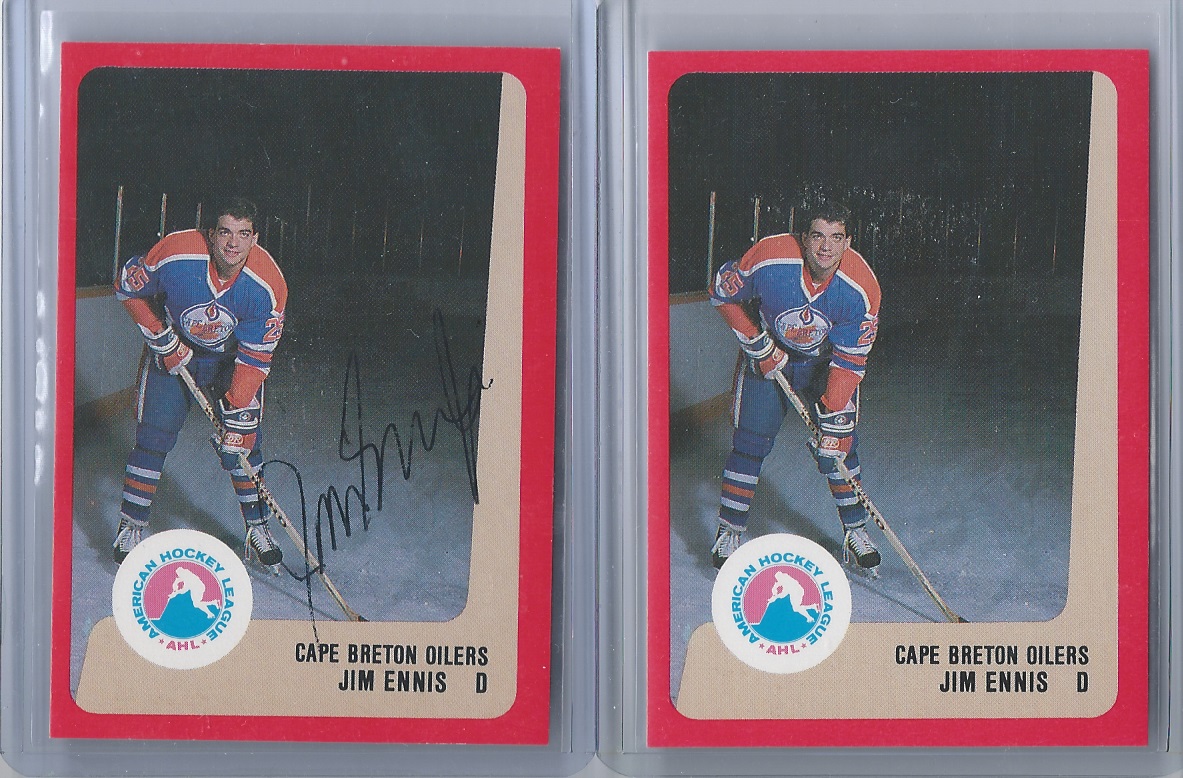
Jim Ennis
Jim Ennis' strong play at Boston University lead to the Edmonton Oilers drafting him in the sixth round of the 1986 NHL Entry Draft. He's spend another season in the NCAA before signing with his hometown team, and turning pro for the 1987-88 season.
Ennis spent most of his first pro season with the Nova Scotia Oilers, of the AHL, but was called up for 5 games with the big club, and he scored his first NHL goal.
The 88-89 season would him sent back to the minors, in Cape Breton, and the Oilers ultimately dealt Ennis to the Hartford Whalers in a swap for Norm MacIver. Ennis never played for Hartford either, spending one season with their AHL club in Binghamton, before retiring.
Pictured are a pair of Jim Ennis' 90-91 ProCards (first Minor League card) showing him with the Cape Breton Oilers. One copy, he was kind enough to sign TTM for me.
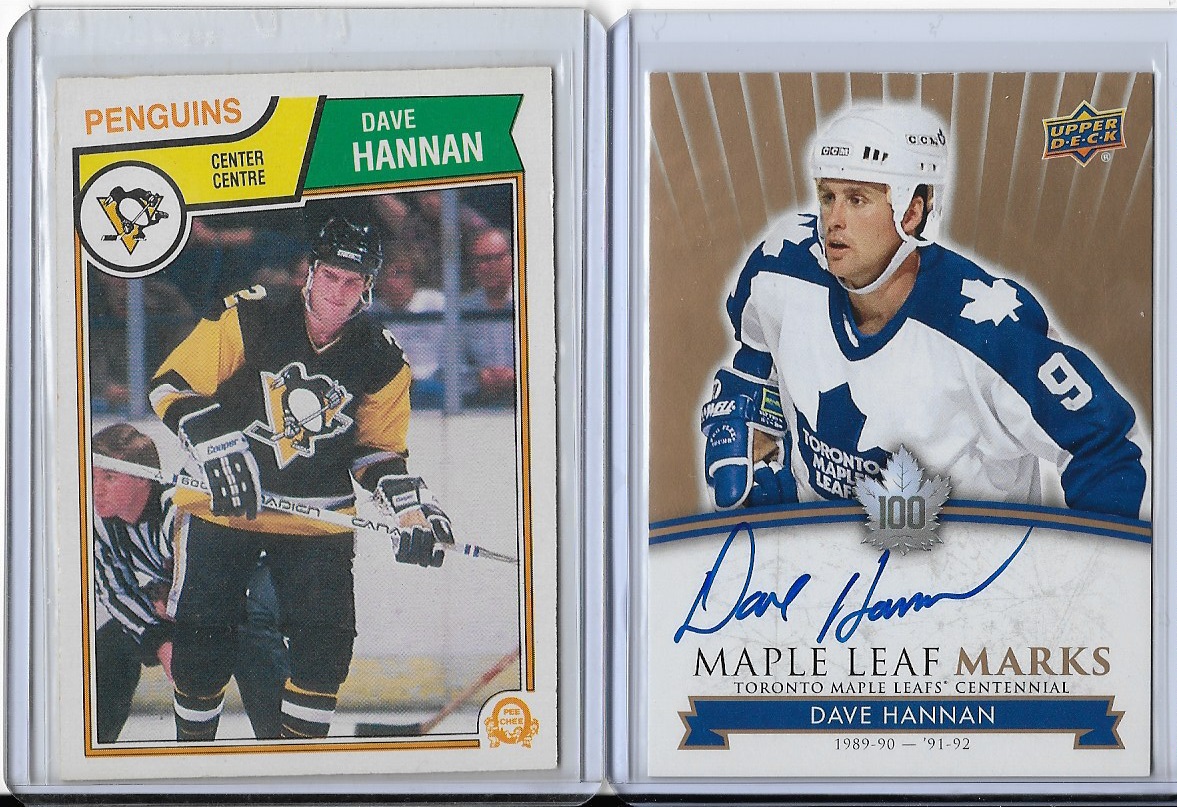
Dave Hannan
Dave Hannan was drafted in the 10th round of the 1981 NHL Entry Draft, by the Pittsburgh Penguins, after scoring a whooping 46 goals for the OHL's Brantford Alexanders in his final year in junior. He'd turn pro the following season, and made his NHL debut in 1981-82, playing a single game for the Pens.
For the next three seasons, Hannan would go back & forth to the minors, playing in 128 NHL contests during those three seasons. The 85-86 season finally saw him stick as a full-time NHLer.
November 24th, 1987, saw the Oilers make a massive trade - when the future HOFers that created a dynasty began to be traded away. Paul Coffey, Dave Hunter, and Wayne Van Dorp were sent to the Pittsburgh Penguins, for a package of Hannan, Chris Joseph, Moe Mantha, and Craig Simpson.
Hannan would score 9 goals, and add 11 assists, in 51 games for the Oilers in 87-88. His only season with Edmonton would end well though, as he helped the Oilers win their fourth Stanley Cup in five years.
The Oilers would put Hannan on waivers, prior to the start of the 88-89 season. He'd be claimed by Pittsburgh who brought him back for one more season. The Pens may have planned to keep him longer, but they too left him exposed for the waiver draft the following year, when he was claimed by the Toronto Maple Leafs. Hannan would spend two full seasons in Toronto, before joinin the Canadian National Team in 1991-92. He represented Canada at the 1992 Albertville Winter Olympics, helping Canada win a Silver medal. After the Olympics, he'd rejoin the Maple Leafs, who would deal him to the Buffalo Sabres at the trade deadline.
Hannan would play the next three seasons in Buffalo, as well as the bulk of the 1995-96 season. His most notable moment with the Sabres was Game 6 vs New Jersey in 1994. The game was scorless, and in its 4th overtime period. Hannan beat Martin Brodeur with a backhand, forcing game 7.
He was traded at the '96 deadline to the Colorado Avalanche, whom he helped win the Stanley Cup. The first for Colorado, and the second for Hannan. He'd play one more season in the NHL, with Ottawa, in the 1996-97 season, before hanging up his skates.
Pictured are Hannan's 83-84 OPC Rookie Card, and his 'Maple Leaf Marks' autograph, from the Leafs' Centennial set.
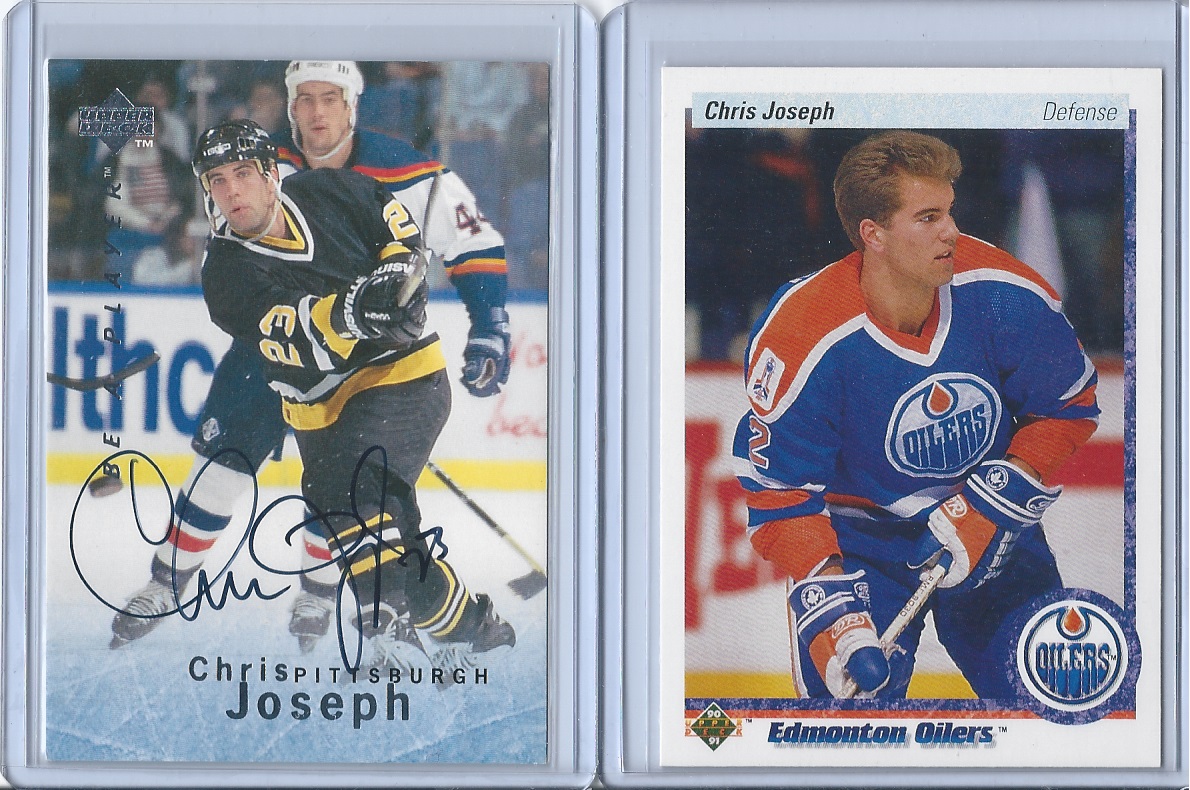
Chris Joseph
Chris Joseph was the 5th overall pick, by the Pittsburgh Penguins, in 1987. He made his NHL debut with the Penguins in 1987, but was traded to the Edmonton Oilers as part of the Paul Coffey trade (just like Dave Hannan).
After the trade, Joseph split the rest of the season between Edmonton (7 games), the AHL's Nova Scotia Oilers (8 games, plus playoffs) and the Seattle Thunderbirds of the WHL (23 games). He would spend the next three seasons going up and down between Edmonton and Cape Breton. The 1992-93 season saw him stick in the NHL permanently.
Joseph began the 93-94 season with the Oilers, but was dealt to the Tampa Bay Lightning in November of 1993 for fellow defenceman Bob Beers. After Tampa Bay, Joseph would play two seasons in Pittsburgh, and one in Vancouver. He's spend the next two seasons in Philadelphia, splitting time between the NHL's Flyers, and the AHL's Phantoms. He'd finsih off 98-99 with the Cincinnati Cyclones.
He'd sign a contract with the Ottawa Senators for the 99-00 season, but never got to play for them. Before the season started, he was claimed by the Vancouver Canucks, so he went back out west. He wound up splitting the season between Vancouver and the Phoenix Coyotes. The 2000-01 was his last in the NHL, when he split it with Phoenix, and the Atlanta Thrashers. He'd play five more seasons in Europe after that, in Finland, Germany, and finally Milan. He retired following the 05-06 season.
Pictured are Joseph's 1990-91 UD Rookie Card, and his 94-95 BAP Autograph.
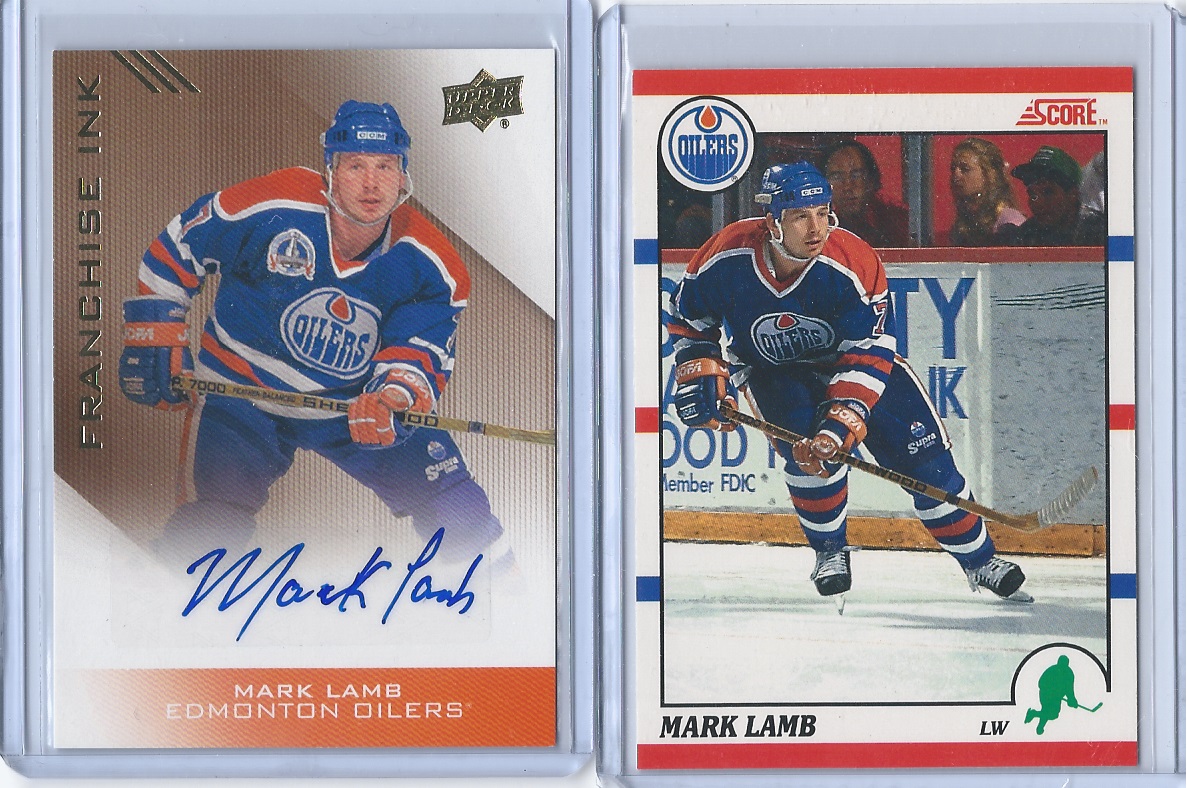
Mark Lamb
Mark Lamb was drafted 72nd overall, in 1982, by the Calgary Flames. He'd turn pro for the 1984-85 season, with Calgary's AHL club in Moncton, and played his first NHL game in 1985-86. His one NHL contest that year would be his only one with the Flames.
He was signed as a free agent by the Detroit Redwings in the summer of 1986, and split the 86-87 season between Detroit and their farm team in Adirondack. He was claimed off waivers by the Edmonton Oilers on the eve of the 1987-88 season. Lamb spent most the season with the Oilers' AHL club in Nova Scotia, but suit up for a pair of NHL games.
The 88-89 season saw Mark play 20 games for the Oilers, plus 6 more in the playoffs, and spending more than half the season in the minors.
Lamb would become a full time NHLer in 1989-90, and helped the Oilers win their 5th Stanley Cup. He'd play two more seasons in Edmonton, before being select in the 1992 NHL Expansion Draft, by the Ottawa Senators.
After two seasons in Ottawa, Lamb would be dealt to the Philadelphia Flyers. Part way through the 1994-95 season he was traded again, this time to the Montreal Canadiens. He'd play his last NHL game in 1995-96, but continued his pro career - spending time with the Houston Aeros in the IHL, and a season with Landshut EV in the DEL. Lamb retired after the 1999-00 season.
After his playing days wrapped up, Lamb got into coaching. First as an assistant with the Oilers (01-02), then the Dallas Stars (02-09). He was the head coach & GM of the WHL's Swift Current Broncos from 2009 through 2016, and was named Head Coach of the Tucson Roadrunners (AHL) for the 2016-17 season.
Pictured are Lamb's 1990-91 Score Rookie Card, and his 2013 UD Edmonton Oilers Franchise Inks autograph.
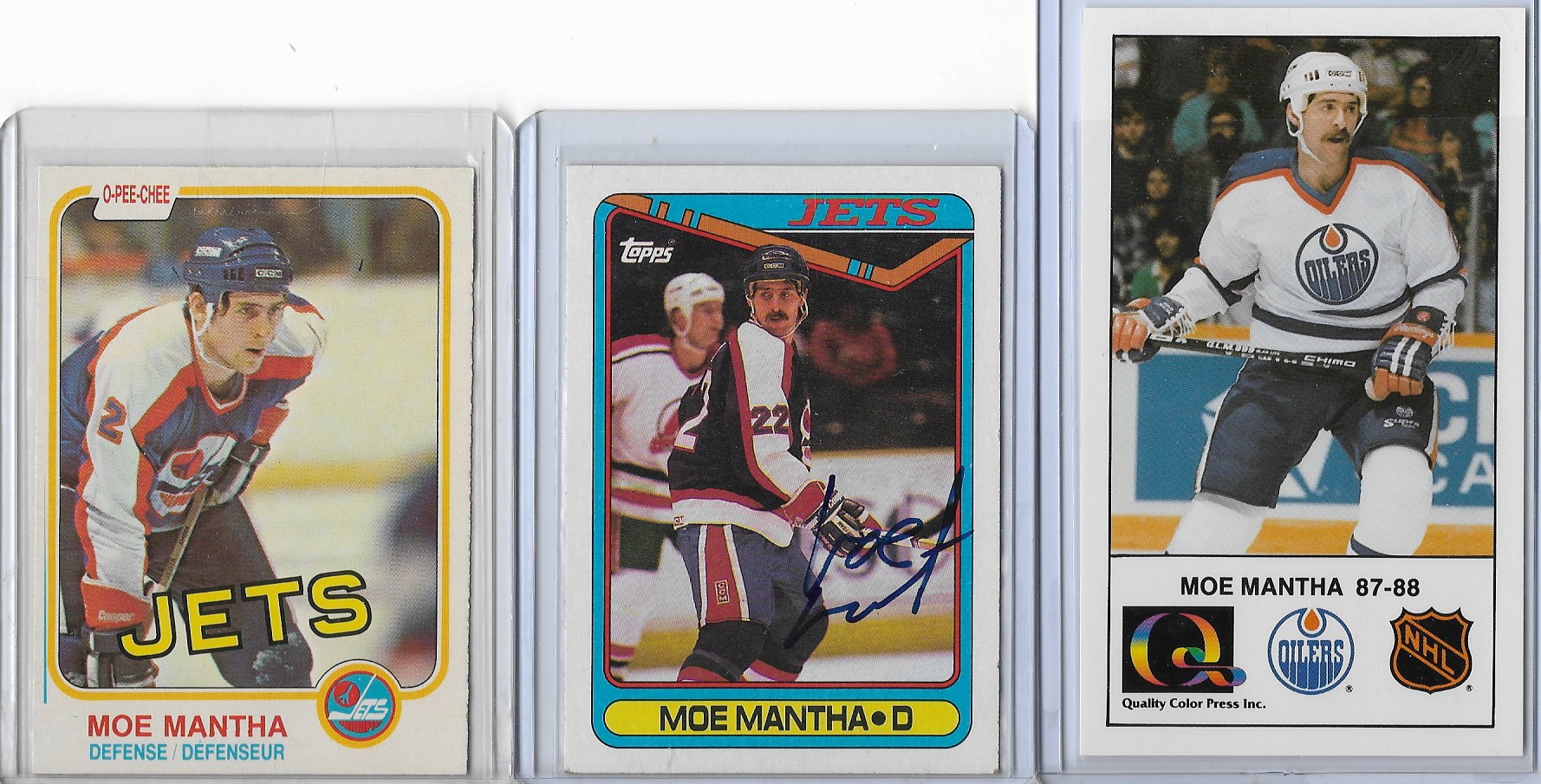
Moe Mantha
Drafted 23rd overall in 1980, Moe Mantha made the jump to the NHL immediately, debuting with the Winnipeg Jets in 1980-81. He's play in Winnipeg until March of 1984, when he was packaged with a 1st round pick in a trade to Pittsburgh, for Randy Carlyle.
Mantha would spend 3+ seasons with the Penguins, until he was made part of the 6 player swap that saw Paul Coffey go to the Penguins. He'd play 25 games for the Oilers in 1987-88, registering 6 assists, and was traded again that season - to the Minnesota North Stars, for Keith Acton.
The North Stars would later flip Mantha to the Philadelphia Flyers. He was lost on waivers to the Winnipeg Jets in October of 1989. He'd play two more seasons with Winnipeg, but was dealt back to Philly in February of 1992. He'd finnsih the season with the Flyers, and retire from playing after that.
Mantha transitioned to coaching right away. He joined the Flyer's AHL affiliate (Hershey Bears, where he play a single game the season before) as an assistant coach in 1993-94. A year later he was named Head Coach of the ECHL's Columbus Chill. He had head coaching stints with Baltimore and Cincinnati in the AHL, the USNTDP Under 18 Team, and then the Windosr Spitfires of the OHL in 2005-06. After a year as an assistant in Rochester (AHL), he spent 5 years as the head coach of the NAHL's Michigan Warriors. He was named interim head coach of the Saginaw Spirit in 2015-16, but wasn't retained. He's since rejoined the NAHL, as Head Coach of the BRookings Blizzard, where he's spent the past two seasons.
Pictured are Mantha's 1980-81 OPC Rookie Card, a signed copy of his 90-91 Topps, and an Oilers 10th Anniversary card.
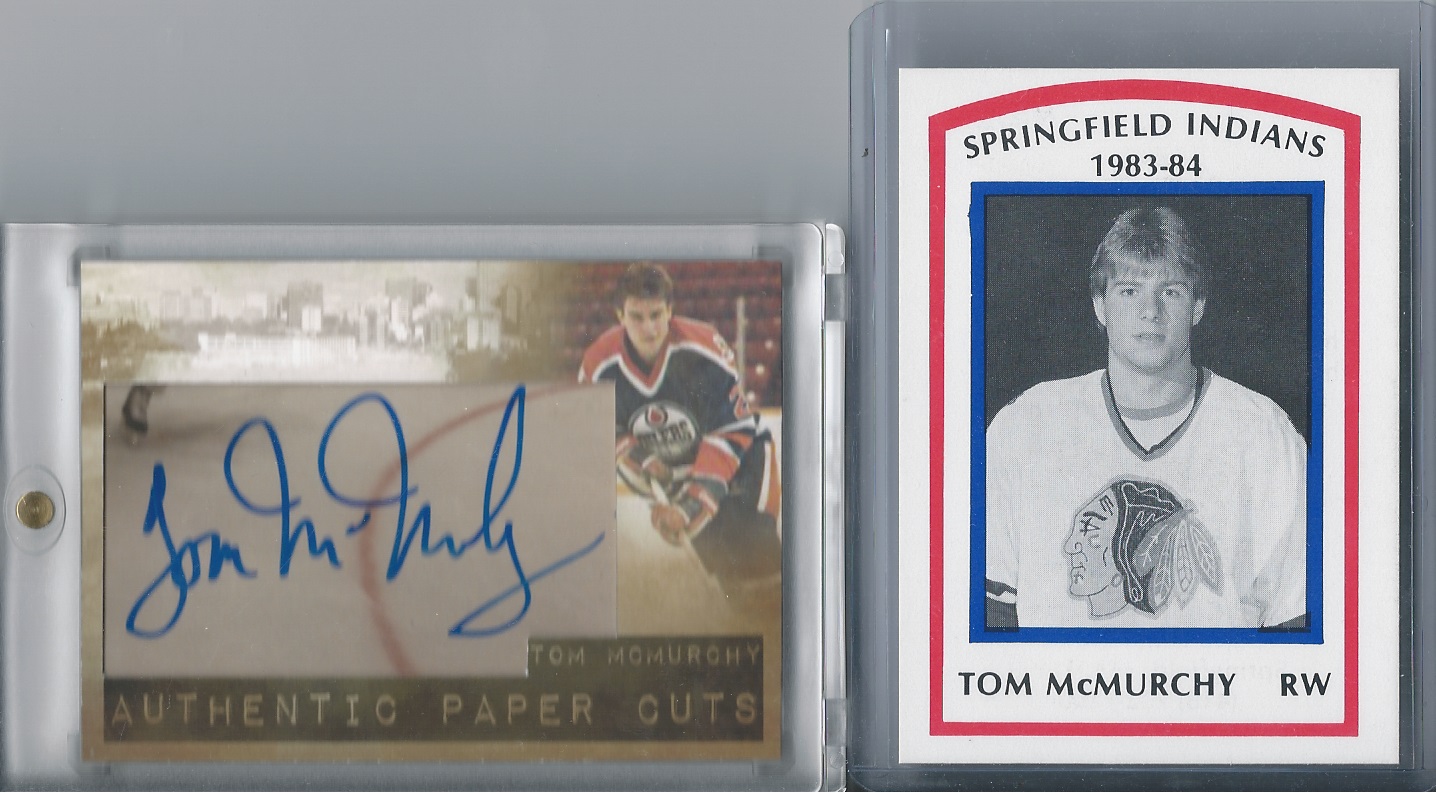
Tom McMurchy
The Chicago Blackhawks made Tom McMurchy the 49th overall pick in 1983, after he put up 59 & 43 goal seasons with Brandon in the WHL.
He made his Blackhawks debut in 83-84 season, playing 27 games, and scoring 3 times. He continued to split time between Chicago and the minor leagues for the next two seasons, until he was traded to Calgary in 1986.
McMurchy never played for the Flames, and instead signed with the Edmonton Oilers. Most of his time in the Oilers' organization was spent in the minors, but he scored 4 NHL goals in 9 games with the Oilers in 87-88.
McMurchy would next play for the Halifax Citadels, before playing two seasons in Italy. He'd retire following the 1990-91 season.
Pictured are McMurchy's first minor league card, an 83-84 Springfield Indians Team Issue, as well as a cut signature made for me by @DnJcards
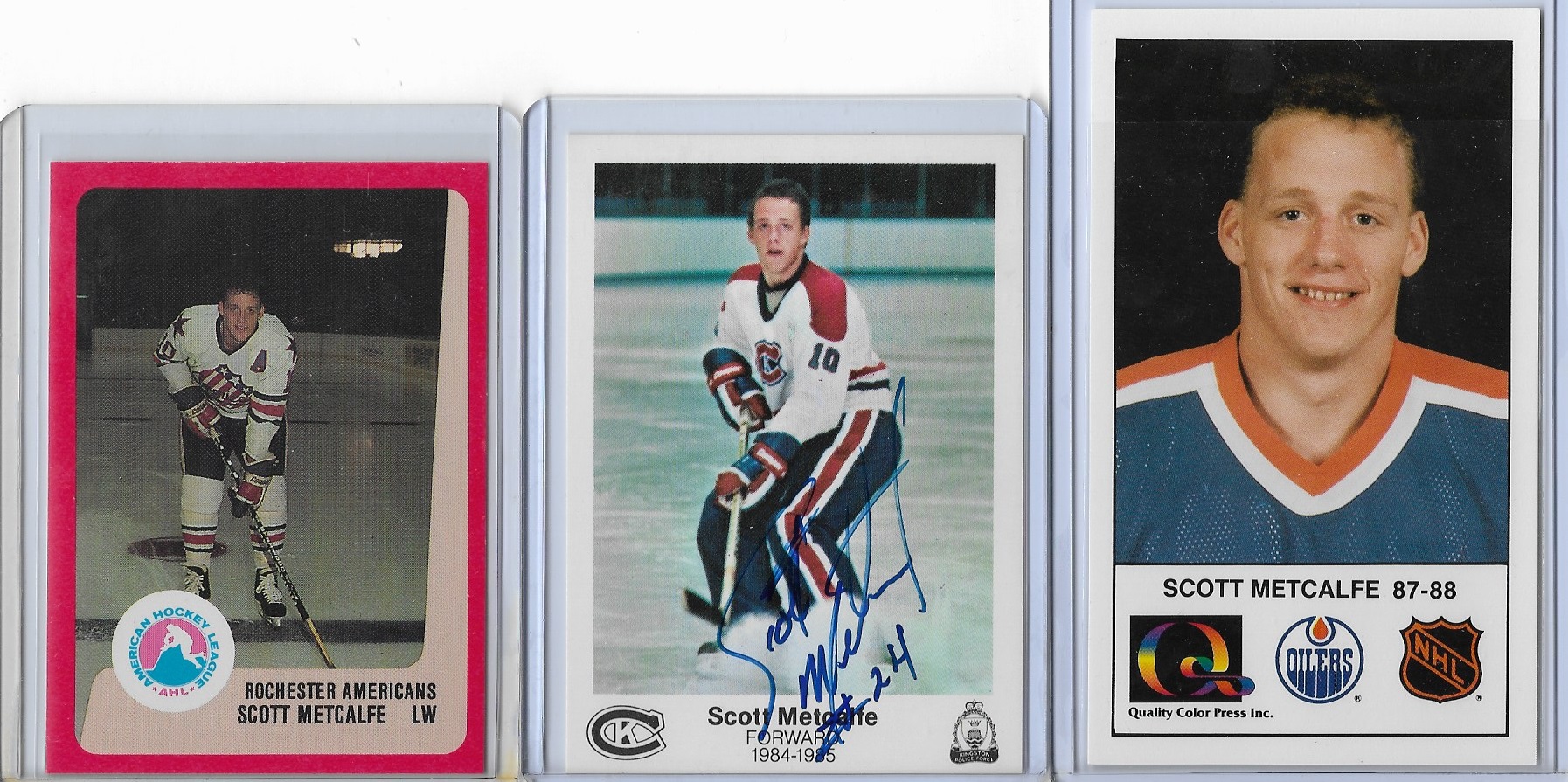
Scott Metcalfe
Scott Metcalfe was drafted in the first round, 20th overall, at the 1985 NHL Entry Draft. He'd already put up back-to-back 25+ goal seasons with the OHL's Kingston Canadians, and played out his final two seasons of Junior scoring 36 and 25 (splitting the 86-87 season between Kingston and Windsor).
He's sign-on to turn pro for the 1987-88 season, and spent a big chunk of the season with the Nova Scotia Oilers. He was called up for a pair of games with Edmonton. In February of 1988, he'd be traded to the Buffalo Sabres, played a single game for them (registering his first NHL point) and spent the rest of season with Rochester.
Metcalfe would spend the next three seasons in the Buffalo organization, but only logged another 16 NHL games. Most of his time was in the AHL.
The 1991-92 season saw him move to Germany for a couple of seasons, which he followed up with five more in the AHL. He played two more seasons in Germany in 98-99 & 99-00, and a year in England in 00-01. The last three games of his career came in 2001-02, when he had a brief stint with the Adirondack IceHawks of the UHL.
Picutred are a trio of Metcalfe's cards: His 88-89 ProCards (first professional card), his Oilers 10th Anniversary card, and a signed copy of 85-86 Kingston Canadiens team issue.
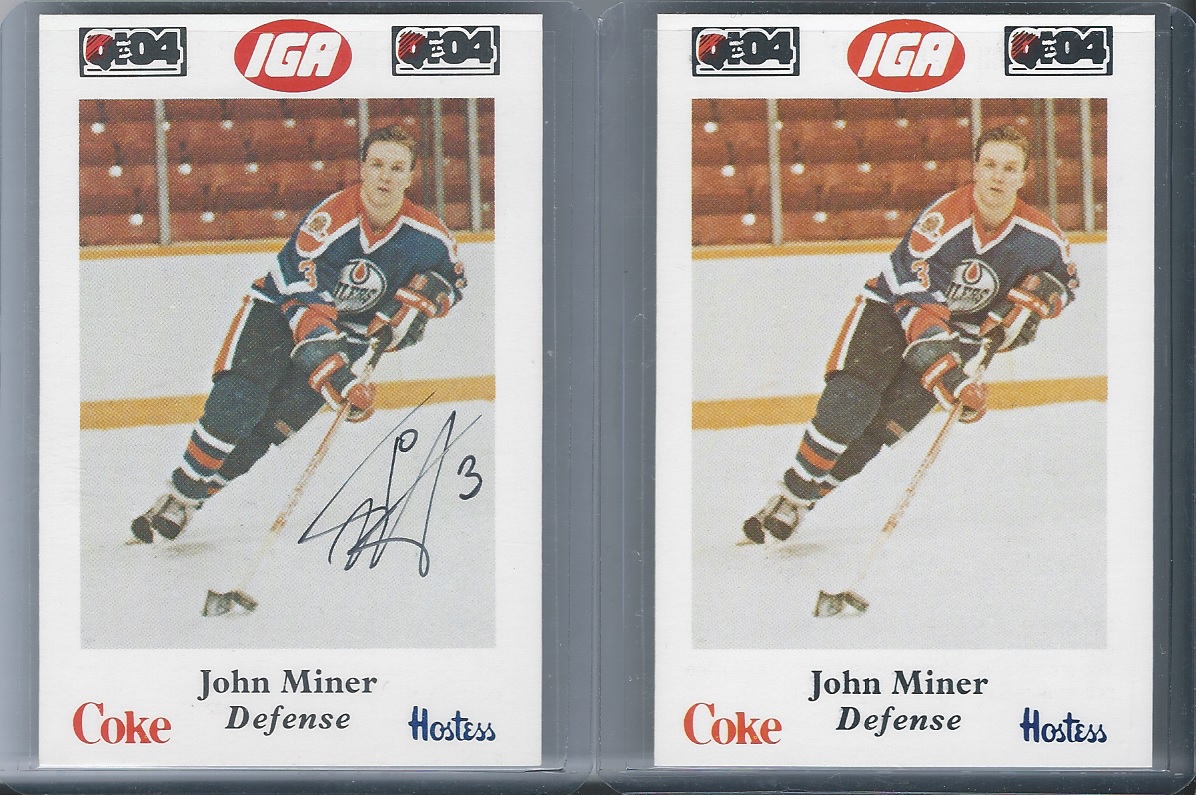
John Miner
John Miner was drafted in the 11th round of the 1983 NHL Entry Draft by the Edmonton Oilers. He was an offensive defenseman with the Regina Pats of the WHL. Following his drat, he put up seasons of 27 and 30 goals, to cap off his junior career.
Miner signed with the Oilers, and played for their AHL club in Nova Scotia for both the 84-85 and 85-86 seasons. The 87-88 season saw him spend most of his time in the AHL, but he was called up several times during the season and played in 14 NHL games, scoring a pair of goals.
That offseason, Miner (whose contract was up) informed the Oilers that he'd be taking his game to Europe, as it didn't seem like he'd be given a shot to crack the NHL lineup, should he resign. In the summer of 1988, he was in Europe, preparing to play in Vienna for the season. On August 9th he got a call, he'd been traded to the Los Angles Kings, alongside Marty McSorley, Mike Krushelnyski, and Wayne Gretzky. Some claim that if the Oilers had refused to include Miner, the deal would have fallen through. Others claim that I made that last line up, in an attempt (a poor one?) at humor.
He would end up playing parts of two seasons with LA's AHL club, the New Haven Nighthawks. He was playing in Vienna in 88-89, got injured, and came back to North America. He finished the season with new Haven, and racked up 15 points in 17 playoff games.
By 91-92, Miner had made his way back to Europe for good. He spent the 13 seasons playing for a variety of teams in Austira, Switzerland, and Germany. He retired after the 04-05 season, but came back for a final season (at age 42) in 2007-08 with Morzine-Avoriaz in France.
Pictured are two copies of Miner's 85-86 Nova Scotia Oilers team issue. He had no NHL Cards, this was his first minor league card. One copy, he was kind enough to sign for me (TTM).
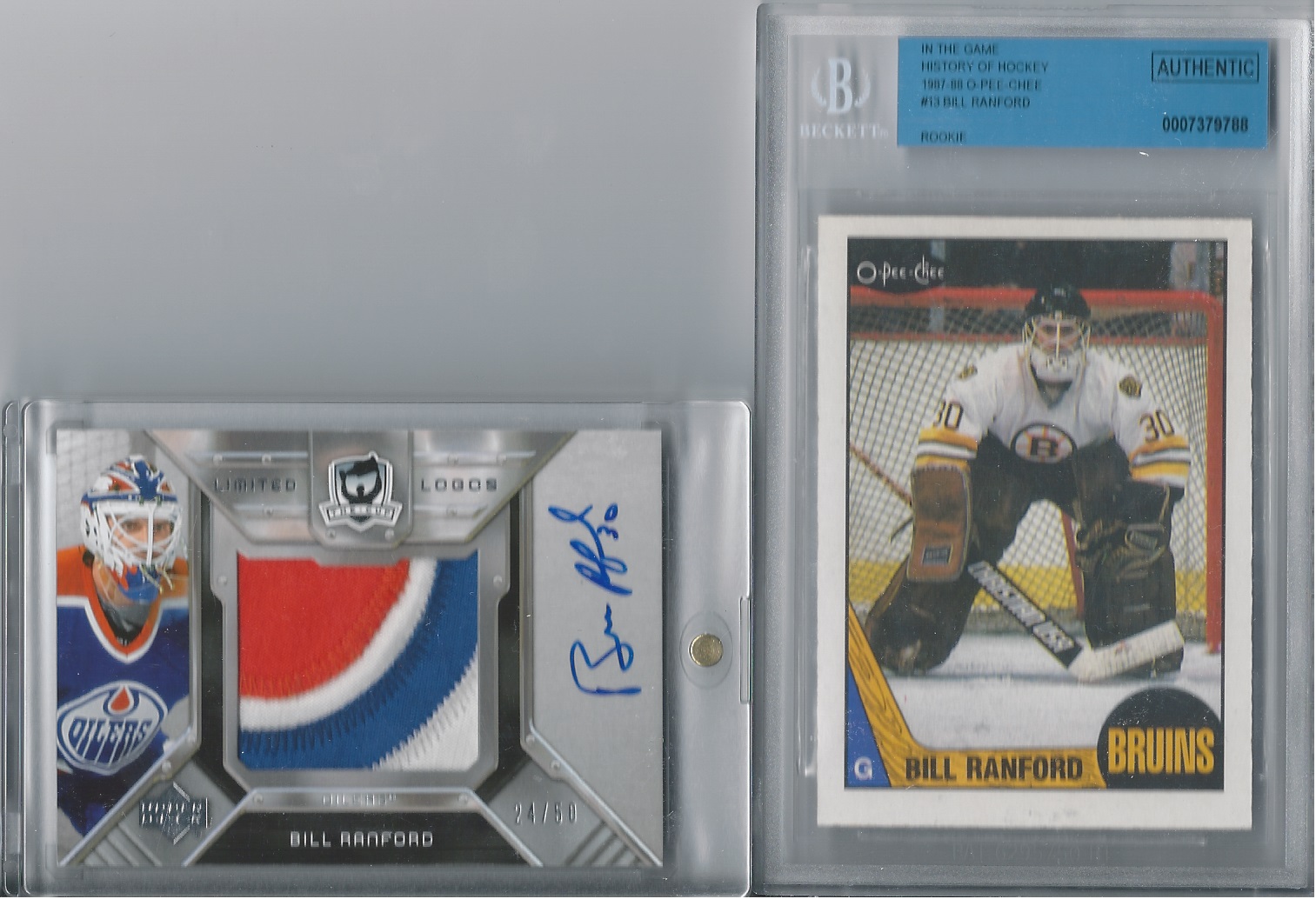
Bill Ranford
Bill Ranford was drafted 52nd overall in 1985, by the Boston Bruins. He made his NHL debut in the 1985-86 season, playing four games for Boston, and another pair in the playoffs. The 1986-87 season saw him take over as the primary starter (he played 41 games). The Bruins fired coach Butch Goring following the 86-87 season, and new coach Terry O'Reilly wasn't as big a fan as the former coach had been. He'd been called the team's goalie of the future by GM Harry Sinden, but the HOF GM opted to deal him to the Edmonton Oilers on March 8th of 1988 along with Geoff Courtnall and a 2nd round pick for allstar Andy Moog, who had been holding out for a trade from Edmonton.
Ranford would be recalled by the Oilers immediately, and never spent another day in the minors. He was firmly behind future HOFer Grant Fuhr on the team's depth chart, and went 3-0-2 in six appearances down the stretch. He would backup Fuhr in the 1988 playoffs, and had his name written on the Stanley Cup for the first time.
Ranford would remain an Oilers' backup until the 1989-90 season, when Grant Fuhr was injured. 23 years old at the time, Ranford had to step in and replace one of the best goalies in the world. How would he respond? With 24 wins in the regular season, and another 16 in the playoffs. Bill won the 1990 Conn Smythe Trophy as playoff MVP, as the Oilers won their 5th Stanley Cup in 7 years.
The imminent goalie controversy was delayed in Edmonton for a year, when off ice issues kept Fuhr out of the lineup for most of the season. Ranford cemented his status in the NHL's upper echelon of goalies, and Fuhr was traded to the Toronto Maple Leafs prior to the start of the 91-92 season.
The early & mid 90s brought a total rebuild in Edmonton. The club iced very competitive teams in 90-91 & 91-92, making it to the conference finals both times. By 92-93, the dismantling of their dynasty had taken it's toll on the roster. Leading scorer in 89-90 (Messier) had been traded. Leading scorer from 90-91 (Tikkanen) was traded during the 92-93 season. Leading scorer from the 91-92 season (Damphousse) had been traded. The 1990 Cup team had been lead in scoring by future HOFers Messier, Kurri, and Anderson. The 92-93 boasted Petr Klima, Shayne Corson, and Craig Simpson has it's highest point producers. The result? Ranford, while still considered an elite goalie, was no longer in a position to put up big win totals.
The summer of 1995 saw team Captain sign an offersheet with the St. Louis Blues. The Oilers were to be awarded four first round picks as compensation, but agreed to take Mike Greir and the rights to Curtis Jospeh instead. Cujo was in an interesting spot. He was without a contract, and started the season playing in Las Vegas for the IHL's Thunder, after the Blues has signed former Oiler Grant Fuhr. There was little chance that the cash strapped Oilers were going to keep both Joseph & Ranford.
January of 1996 saw the Oilers get Cujo under contract, and a trade of Ranford back to where they got him from: The Boston Bruins. The Oilers received Mariusz Czerkawski, Sean Brown, and a 1st round pick. Harry Sinden's earlier prediction that he'd be Boston's goalie of the future had come true!
Ranford was on fire after the trade, putting up a record 21-12-4 for the Bruins. He played a total of 77 games that season, with a record of 34-30-9. His first winning record since the 91-92 season. The Bruins were loaded with talent, including future Hall of Famers like Adam Oates, Ray Bourque, Joe Mullen, and Cam Neely. They finished 2nd in the Northeast Division, and had a first round matchup against the Florida Panthers. They lost in five games, and the Panthers went on to play in the Stanley Cup final.
The Bruins wern't nearly as good the following season, and decided to start a rebuild of their own. On March 1st of 1997, Ranford was involved in a 6 player blockbuster, as the Bruins sent him along with Adam Oates & Rick Tocchet to the Washington Capitals for Jim Carey, Anson Carter, Jason Allison, and a draft pick. The Caps were loaded with talent, but also rife with injuries. The missed the playoffs by two points.
The 97-98 season would see Ranford come back as the #1 goalie in Washington, on a team expected to be very strong. The team was great: Oates, Dale Hunter, and Phil Housley all registered their 1000th career point that season, while Peter Bondra lead the team in goals & points. The injuries were minimal except one: Ranford was hurt during the opening game of the season. Like he had done to Grant Fuhr 8 years prior, Olaf Kolzig took the starting job away from Bill, who was now relegated to backup status, as the Captials reached the 1998 Stanley Cup final.
With Kolzig firming in the #1 spot, the Capitals traded him to Tampa Bay that summer, for a couple of draft picks. Ranford wouldn't find much success in Tampa, where the team in front of him was pretty weak. He'd be traded to the Stanley Cup Champs on March 23rd of 1999, when the Detroit Red Wings were looking for goalie depth. It was one of a pair of trades between the Lightning & Red Wings that day: Tampa sent Ranford & Wendel Clark to Detroit, and brought back draft picks & Kevin Hodson.
Ranford would get his final taste of playoff action that spring, when Chris Osgood was injured. He'd post a 2-2 record, including his 4th career playoff shutout.
The summer of 1999, Ranford would sign a 1 year contract to return to Edmonton. He'd retire at the end of the 99-00 season.
On top of his NHL accomplishment, Ranford also represented Canada on the world stage. He was named Tournament MVP at the of the Canadian team that the inaugural World Cup of Hockey in 1996, but was the 3rd stringer behind Curtis Joseph and Martin Brodeur.
An All Star in 1991, Ranford is the Oilers career leader in games played by a goalie, and 2nd in career wins.
Since retiring, Ranford has played for the Oilers in pair of Heritage Classic games. His stand-up style was similar enough to that of Jim Craig's that he acted as Eddie Cahill's "stunt double" - doing the on-ice scenes in the movie Miracle. After two seasons as the goalie coach for the WHL's Vacouver Giants, he was hired as the goalie coach for the Los Angles Kings in 2006, getting his name on the Stanley Cup for a 3rd and 4th time in 2012 & 2014. His nephew, Brandon, was drafted by the Philadelphia Flyers in 2010. He played 7 years in the AHL, and a single game with Dallas in 14-15. He's since joined Eisbaren Berlin in the German DEL.
Pictured are two of the thousand, or so, Ranford cards I have. This copy of his 1987-88 OPC Rookie Card was slabbed and inserted into ITG's "History of Hockey" in 2012-13. Also shown is a 2006-07 Limited Logos card from the Cup. Great patch & autograph!
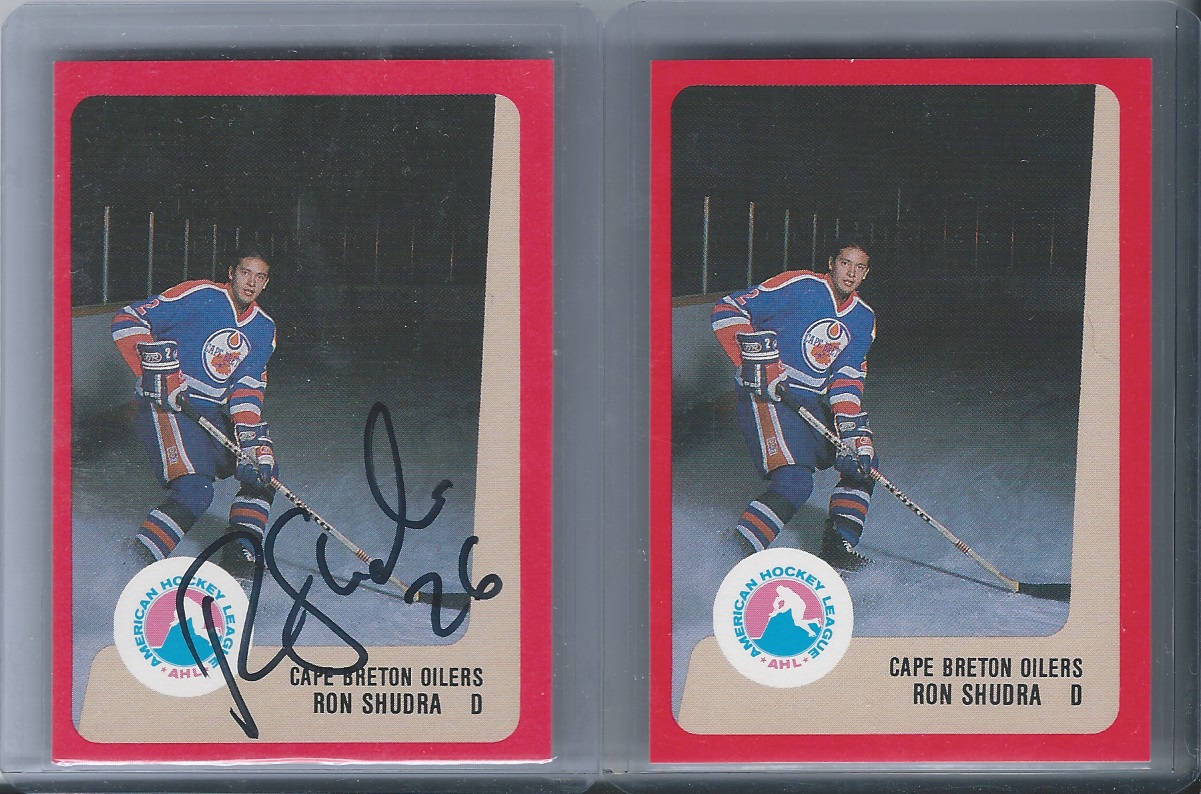
Ron Shudra
Ron Shudra was drafted by the Edmonton Oilers in the 3rd round, 63rd overall, in the 1986 Entry Draft. He'd play one more season for Kamloops, scoring 49 goals, before turning pro in the 1987-88 season.
Shudra was called up and played 10 games for the Oilers during the 87-88 season, registering 5 assists. He spent most of the year in the AHL. The 88-89 season would see him start the season with the Cape Breton Oilers, but five games into the season he was traded to the New York Rangers, for Jeff Crossman. The Rangers would assign him to Denver, in the IHL. He'd spend the 89-90 season with the Fort Wayne Komets (IHL), and in the 1990-91 season took his act to England.
Shudra's first couple of years in England had him play for the Solihull Barons, but in 1991-92 he moved ot the Sheffield Steelers. The Steelers were playing in the British 3rd division at the time. Shudra, a defenceman, scored a whooping 78 goals - and added 70 assists - in just 32 games. Sheffield was promoted to the 2nd division the following year as a result.
He'd star for the Steelers until the end of the 98-99 season, when he left to join the Hull Thunder as a player / coach. He'd hold that role for two seasons, played briefly with Edinburgh, before retiring. He'd join Sheffield's front office once his playing days were done. On December 15th of 2001, the Steelers lineup was decimated by injuries. There former Captain "Rocket Ron" came out of retirement, and skated as a winger. He's score a goal that night, which earned him a standing ovation from the crowd. He'd finish the season with Sheffield, playing 25 games total. His career was officially back on, and he played another 6 seasons in England, mostly in Sheffield. He retired for good following the 07-08 season.
Shudra's NHL career never really took off, but he's a member of the British Hockey Hall of Fame, after being inducted in 2010.
Pictured are two copies of Shudra first minor league card: 1988-89 Pro Cards, showing him with the Cape Breton Oilers. One is signed.
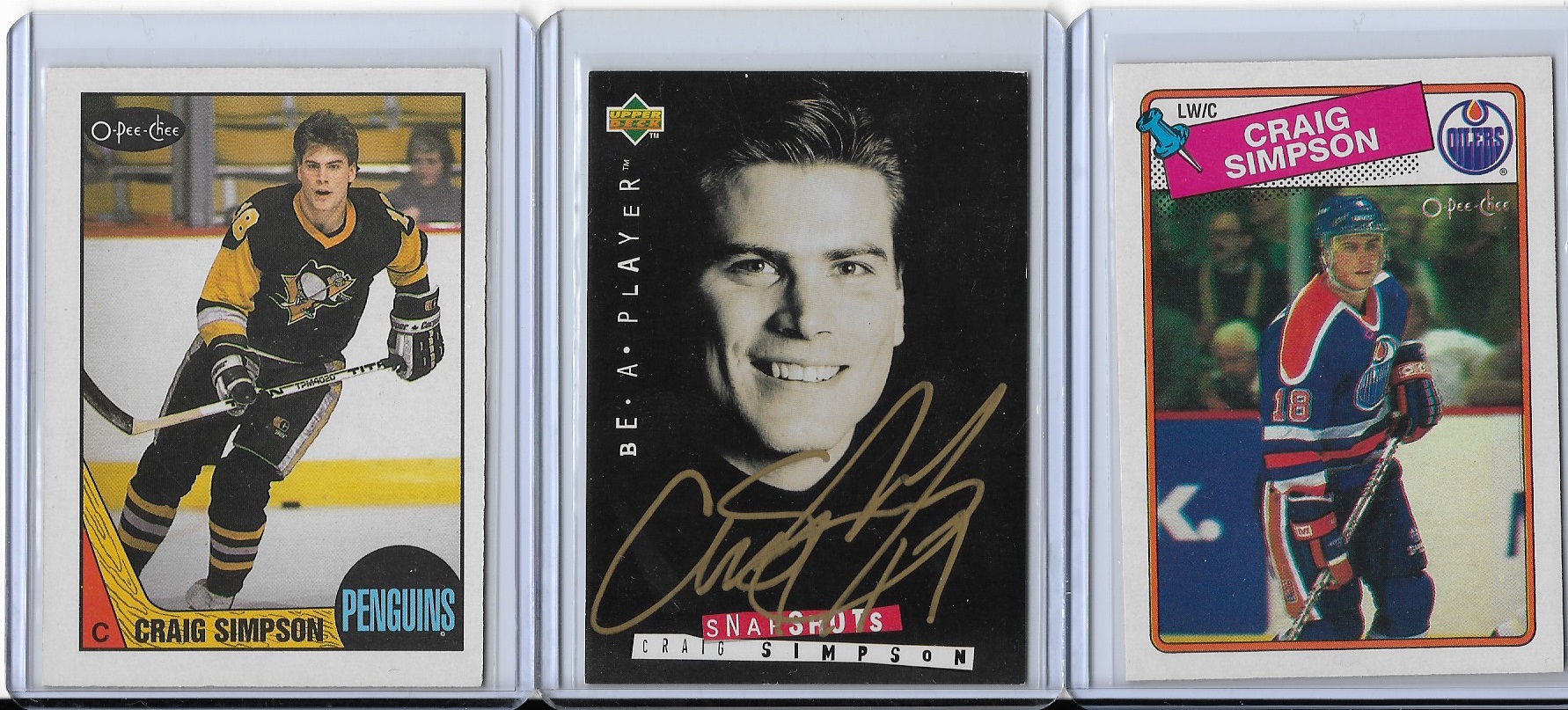
Craig Simpson
Craig Simpson was drafted 2nd overall by the Pittsburgh Penguins in 1985. He was the key piece of the package that the Penguins traded to the Oilers for Paul Coffey.
After two seasons with Michigan State, Simpson was drafted by the Penguins and made the jump to the NHL as a teenager. He never spent a day in the minors. His first two seasons in the league with Pittsburgh saw him score 11 and then 26 goals. Pretty good numbers for a guy that only turned 20 years old during his 2nd NHL season.
Simpson's 3rd year in the league is when he really took off. He has scored 13 goals with the Penguins, in 21 games, before being traded to the Oilers. He played 59 games the rest of the way through, popping another 43. His 56 goals that year would be a career high. He tallied 13 more in the playoffs that year, winning his first Stanley Cup in 1988.
Simpson continued to be a great goal scorer in Edmonton, posting totals of 35, 29, 30, 24, and 24 over the next 5 seasons. The 1990 playoffs saw Simpson tied for the team lead in points (with Mark Messier, 31 in 22 games) and he had the outright lead in goals (16).
The Oilers, in a full rebuild, dealt Simpson to the Buffalo Sabres before the start of the 1993-94 season. They got back Jozef Cierny & a 4th round pick. The deal ended up working out terrible for both sides. The Oilers did nothing with the pick, and Cierny would only play a single game for the club, but Simpson injured his back on December 1st of 1993, in a game against Tampa Bay, and was never the same player again.
Simpson played only 22 games in his first season with Buffalo, and 24 in his second, scoring a total of 12 goals. The back injury forced him to retire after the 1994-95 season.
Craig made the move to the broadcasting booth, joining FOX as an analyst. He moved to Sportsnet in 1998, as a colour commentator for Oilers games, and weekly national broadcasts.
In 2003, he'd leave broadcasting to become an assistant coach with the Oilers, and was part of the staff when they made their run to the 2006 Stanley Cup final. He left coaching after the 06-07 season, and returned to broadcasting with CBC. When Rogers took over NHL broadcast rights in 2014, he & partner Jim Hughson shifted to Sportsnet with those rights. One notable highlight from the duo's broadcasting career: On March 22, 2008, they called the game between Edmonton & Colorado at 1 pm Mountain time. Following the game they hopped on a plane, and went to Calgary, where they called another game at 8 pm. Doing two games in one day is believed to be a first in the NHL.
Simpson also did colour commentating on EA Sports NHL video games, and appeared on CBC's "Battle of the Blades" in 2009. He wound up marrying his partner on the show, Jamie Sale.
Simpson's son, Dillon, was drafted by the Edmonton Oilers in the 4th round of the 2011 NHL Entry Draft. One of just two father & son duos to have played for the Oilers.
Pictured are Simpon's 1987-88 OPC Rookie Card, his 88-89 OPC card (first showing him as an Oiler), and his 1994 BAP Autograph.
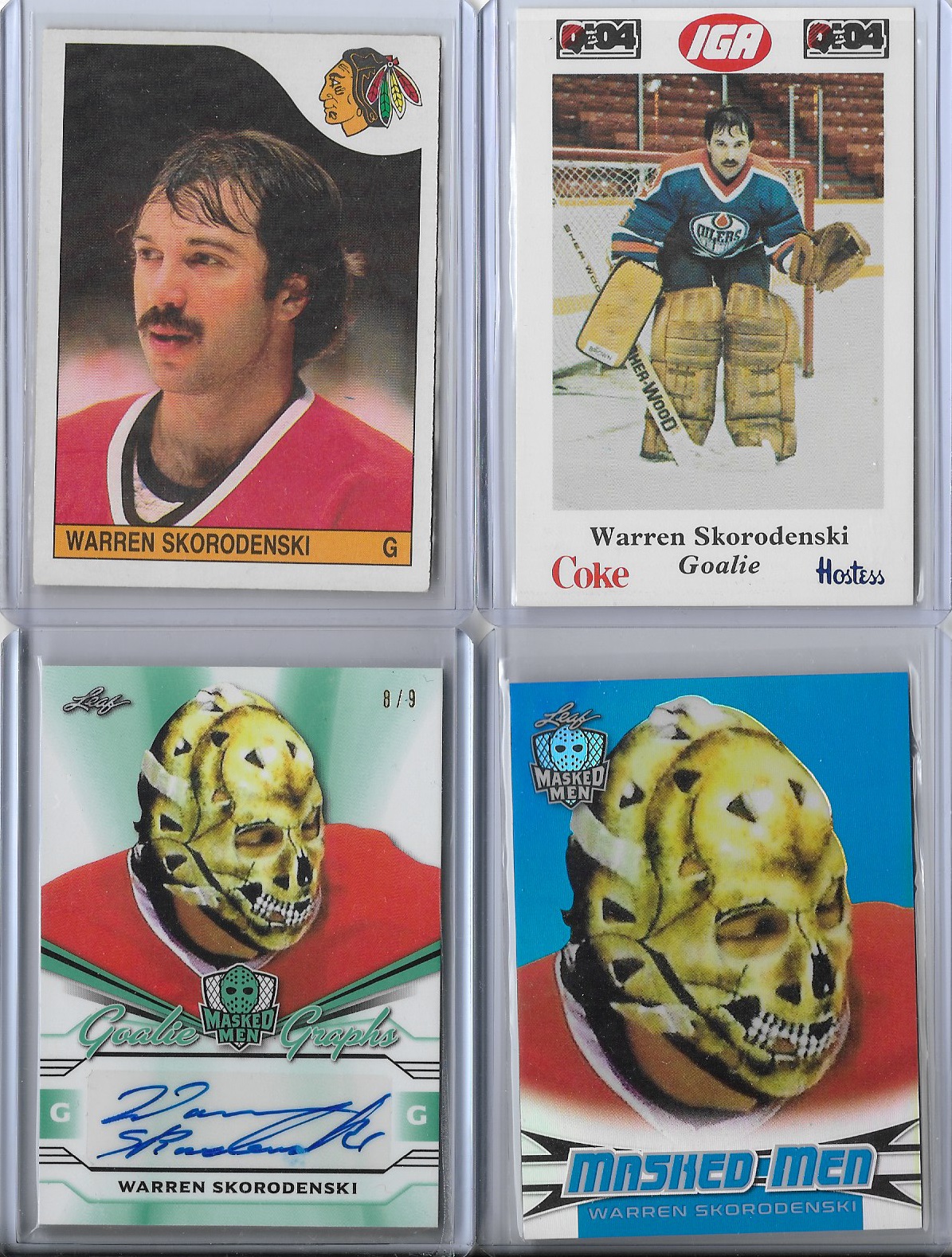
Warren Skorodenski
After two seasons with the WHL's Calgary Wranglers, Warren Skorodenski signed with the Chicago Blackhawks as a free agent in 1979. He spent one more season in Calgary before turning pro
Skorodenski made his NHL debut in the 1981-82 season playing one game for the Hawks, but spent the rest of the season in the AHL with the New Brunswick Hawks. That season, he was the co-winner of the Harry "Hap" Holmes Memorial Award (with Bob Janecyk) for the lowest goals against.
After having played with both the AHL's New Brunswick Hawks, and the IHL's Flint Generals, The next few years saw Skorodenski play in the AHL and CHL with several teams. He made stops with other minor league clubs like the Springfield Indians, Birmingham South Stars, and Sherbrooke Jets.
Skorodenski played the entire season in Chicago in 1984-85, getting action in 27 regular season games, and 2 more in the playoffs. 85-86 & 86-87 saw him spend most of the seasons in the minors, but he did play another 4 games for Chicago.
Warren signed with the Edmonton Oilers in October of 1987. He spent most of the 87-88 season in Nova Scotia, but was called up briefly to make his Oilers debut, playing in three games. After spending the 88-89 season in the minors, Skorodenski signed on to play with the Canadian National team for the rest of the season. He'd spend two more years on the international circuit, before finally hanging up his pads for good.
Shown are four cards for Skorodenski. His 85-86 OPC Rookie Card, and his 85-86 Nova Scotia Oilers team issue, along with two cards from 2018 Leaf Masked Men. One is a certified autograph, and the other is a Masked Men card. Normally I wouldn't include something like the Masked Men insert, but that mask was so awesome I had to keep the card.
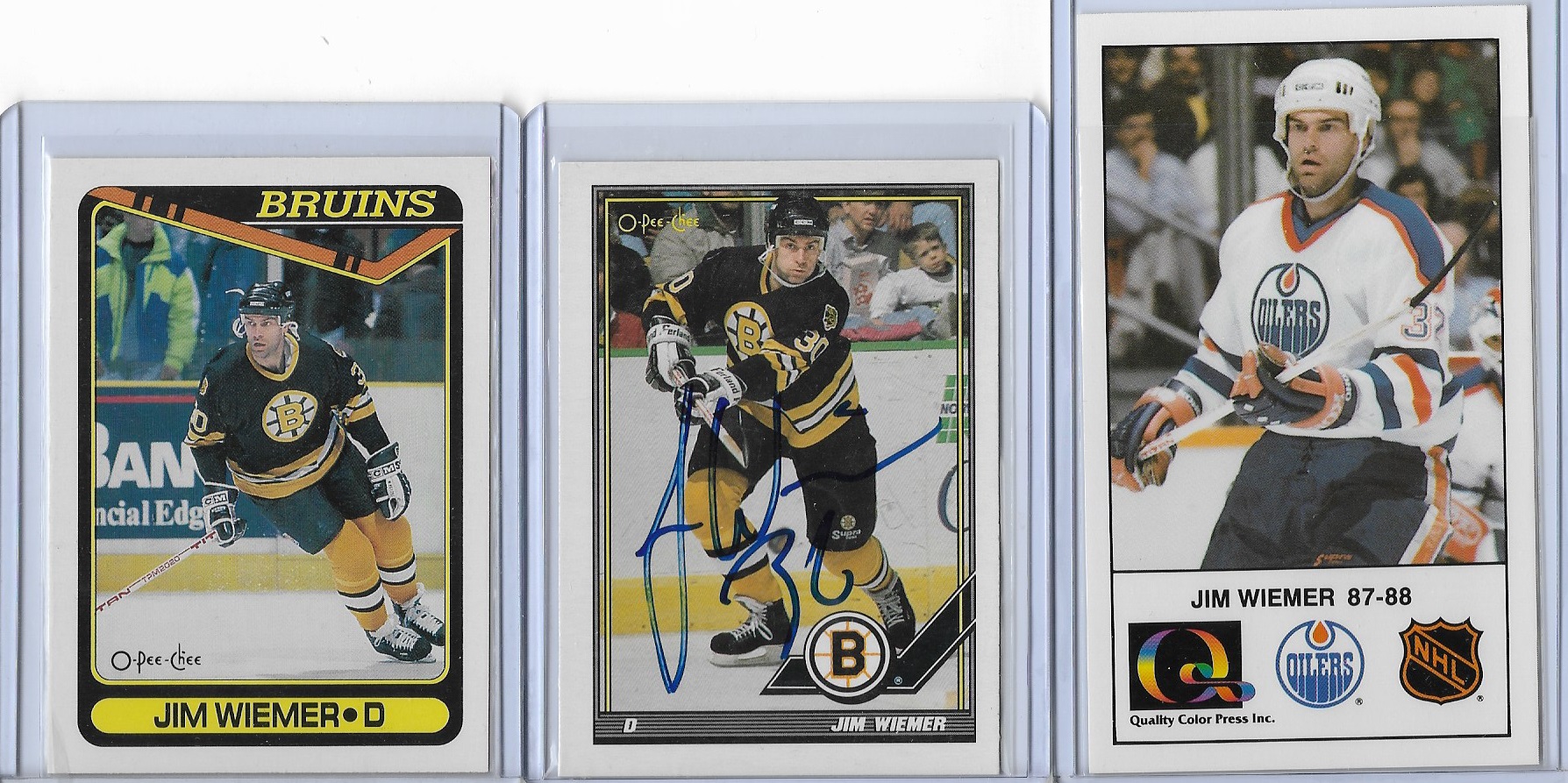
Jim Wiemer
Jim Wiemer joined the Peterborough Petes of the OHL in 1978, and helped the junior squad win a Memorial Cup in 1979. The Buffalo Sabres made him the 83rd pick in the 1980 NHL Entry Draft, and he followed that up with 95 point (41 goals) campaign in Peterborough, to cap off his junior career.
Wiemer would start his professional career in 1981-82 with Buffalo's AHL affiliate, the Rochester Americans. It was Rochester head-Coach Mike Keenan that decided to move Wiemer to the blueline, instead of playing forward like he did in junior. The move paid off: He won the Eddie Shore award as AHL defenceman of the year in 1983, while helping Rochester win the Calder Cup, as AHL champs.
The 1983 NHL playoffs saw Wiemer make his NHL debut too. He was called up for a single game with Buffalo.
After a 59 point season, and all the accolades, in the minors: Wiemer spent most of the 1983-84 season with Buffalo. He logged 64 games for the Sabres. He was sent back to the minors late, and helped Rochester reach another Calder Cup final - where there were beaten in a rematch by the Maine Mariners.
After splitting the early part of the 84-85 season with Buffalo (10 games) and Rochester (13 games) Wiemer was traded to the New York Rangers. He'd play 22 NHL games for the blueshirts that season, plus 33 more for their AHL club, the New Haven Nighthawks. The 85-86 season saw him play just seven NHL games, spending most of the season in the AHL.
The 1986-87 saw Weimer traded again, but to the Edmonton Oilers, as part of a seven player swap on October 2nd. He played exclusively for the Oilers farm team in Nova Scotia for the rest of the season. He'd make his Oilers debut in 1987-88, playing twelve regular season games and two more in the playoffs. He earned a Stanley Cup ring that spring, to go along with his rings from winning the Calder & Memorial Cups.
The 88-89 season saw him back in the AHL, and he was eventually traded to Los Angles. He played nine games for the Kings that season, and left as a free agent that summer. He'd sign with the Boston Bruins for the 89-90 season, and was primarily an NHLer for them for the next four years, lacing them up in 61, 61, 47, and 28 games. He'd play his final four NHL games, with Boston, in the 1993-94 season. He signed to playoff with Rochester in the AHL for the 1994-95 season, and retired at the end of the year.
The trio of cards pictured includes Weimer's 1990-91 OPC Rookie Card, a signed copy of his 91-92 OPC, and his Oilers 10th Anniversary card.
1988-89
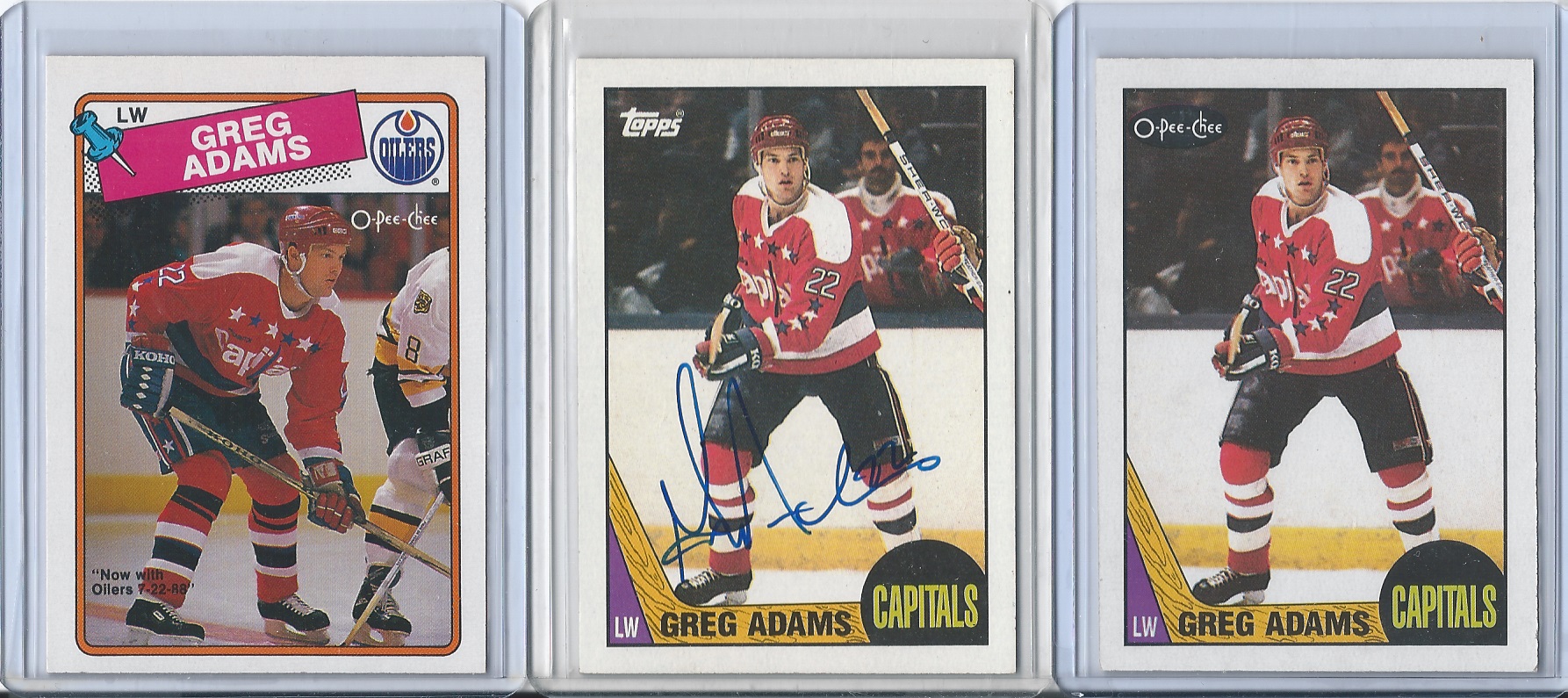
Greg Adams
No, No, No, No! The OTHER Greg Adams! Yup, there were two of them in the league, and much of their careers overlapped.
Not to be confused with the other Greg Adams, who played for Vancouver, New Jersey, etc: This Greg Adams was never drafted, and signed with the Philadelphia Flyers as a free agent in 1979. He made his NHL debut in 80-81 with the Flyers, scoring three goals in six games.
He spend most of the following season in the minors, but 19 points in 33 games certainly made him noteworthy. Noteworthy enough that he was traded to Hartford as part of a package for Mark Howe.
Adams was a regular in the Whalers lineup for the 82-83 season, playing in 79 games that year, and registering 10 goals. He didn't stick in Hartfor long though, and was traded to the Washington Capitals. He'd spend the next five seasons of his career with the Caps.
The Capitals dealt Adams to the Edmonton Oilers in the summer of 1988, for Geoff Courtnall. He played he bulk of the season with the Oilers, scoring four times in 49 games, and was traded to the Vancouver Canucks in March of '89.
I would love it if someone could tell me how the backs of both Greg Adams' jerseys looked for the end of the 88-89 season. Probably the only time when two players with the same name skated for the same team.
Adams would split the early part of the 89-90 season between Quebec & their AHL club in Halifax, and was traded to the Detroit Red Wings mid-season. He retired after the 89-90 season.
Pictured are two copies of Adams' 87-88 OPC Rookie Card (his only NHL card). One signed, and one not.
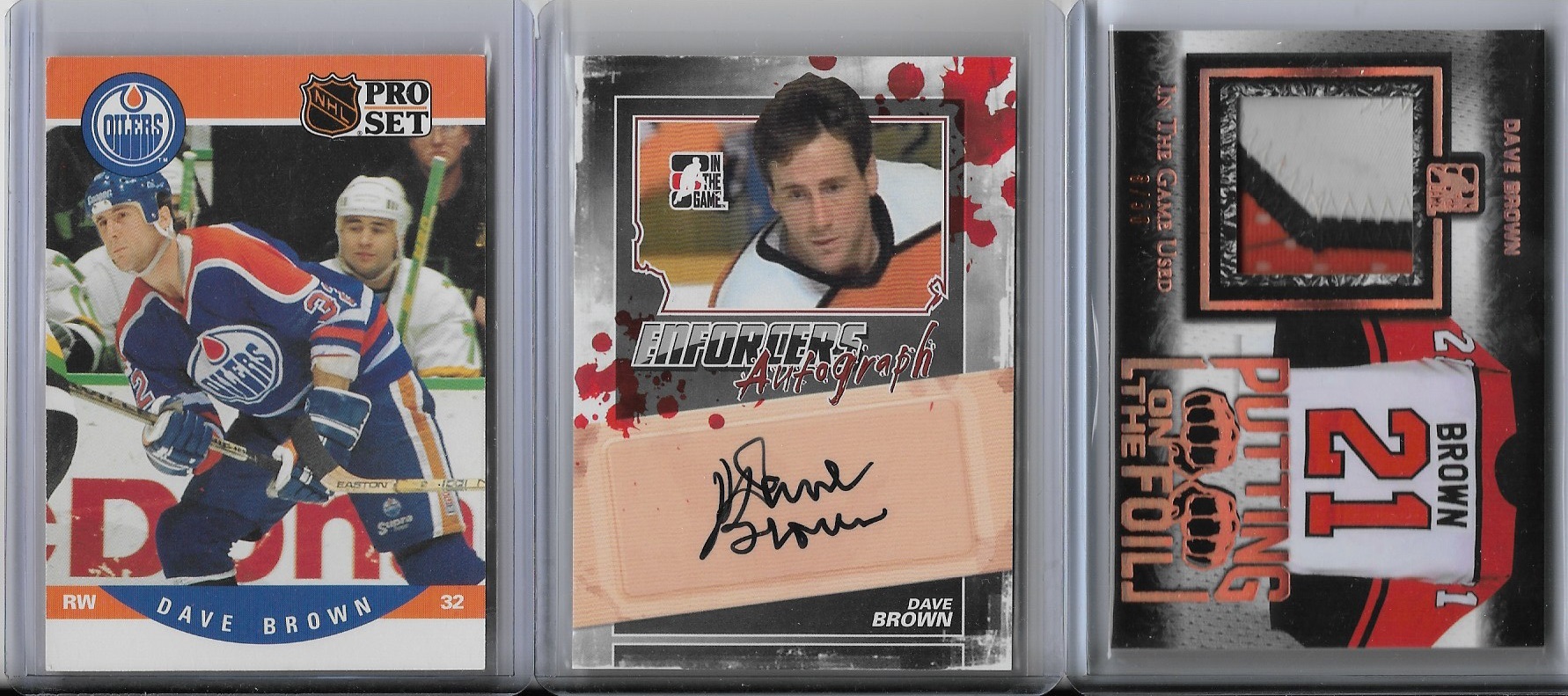
Dave Brown
Dave Brown logged 344 PIMs playing for the WHL's Saskatoon Blades in 1981-82. That got him noticed, and the Philadelphia Flyers made him a 7th round pick in 1982, 140th overall.
It proved to be a great use of a late pick by Philly. Brown would make his NHL debut the following season, playing two games for Flyers. A match in Boston on 3/12/1983 would see Brown drop the gloves for the first time in his NHL career, sqaring off against the Bruins' Gord Kluzak.
The 1983-84 season would see him still spent most of the season in the minors, but his NHL game count was up to 19, where he racked up a whooping 98 PIMs. It would be the last time he'd spend anytime in the minors.
The 84-85 season would see Brown as a fulltime NHLer, and Enfocer. It was a roll he'd play for the Flyers for the next four and a half seasons - when he was traded to the Edmonton Oilers (along with a draft pick) for Keith Acton.
Brown spent the rest of the 88-89 season, and the entire 89-90 & 90-91 seasons with the Oilers. 361 PIMs in 140 games gave the Oilers back the toughness they lossed when they traded Marty McSorley to the Kings.
Brown was a member of the Stanley Cup winning team in 1990. He played 16 playoff games, had a helper, and 30 PIMs.
The 1991 offseason would see the Oilers trade Brown back to Philly. He was part of a package, along with Corey Foster and Jari Kurri, that saw the Oilers bring back Craig Berube, Craig Fisher, and Scott Mellanby.
Brown would play another four seasons in Philadelphia, and was as fearsome as ever. He play one final season in 1995-96, after inking a free agent deal with the San Jose Sharks.
He retired with 729 games played, 45 goals, 52 assists, and 1789 PIMs.
Pictured are his 1990-91 Pro Set Rookie Card, and ITG Enforcers Autograph, and a Leaf ITGU Puttin' On The Foil Patch Card
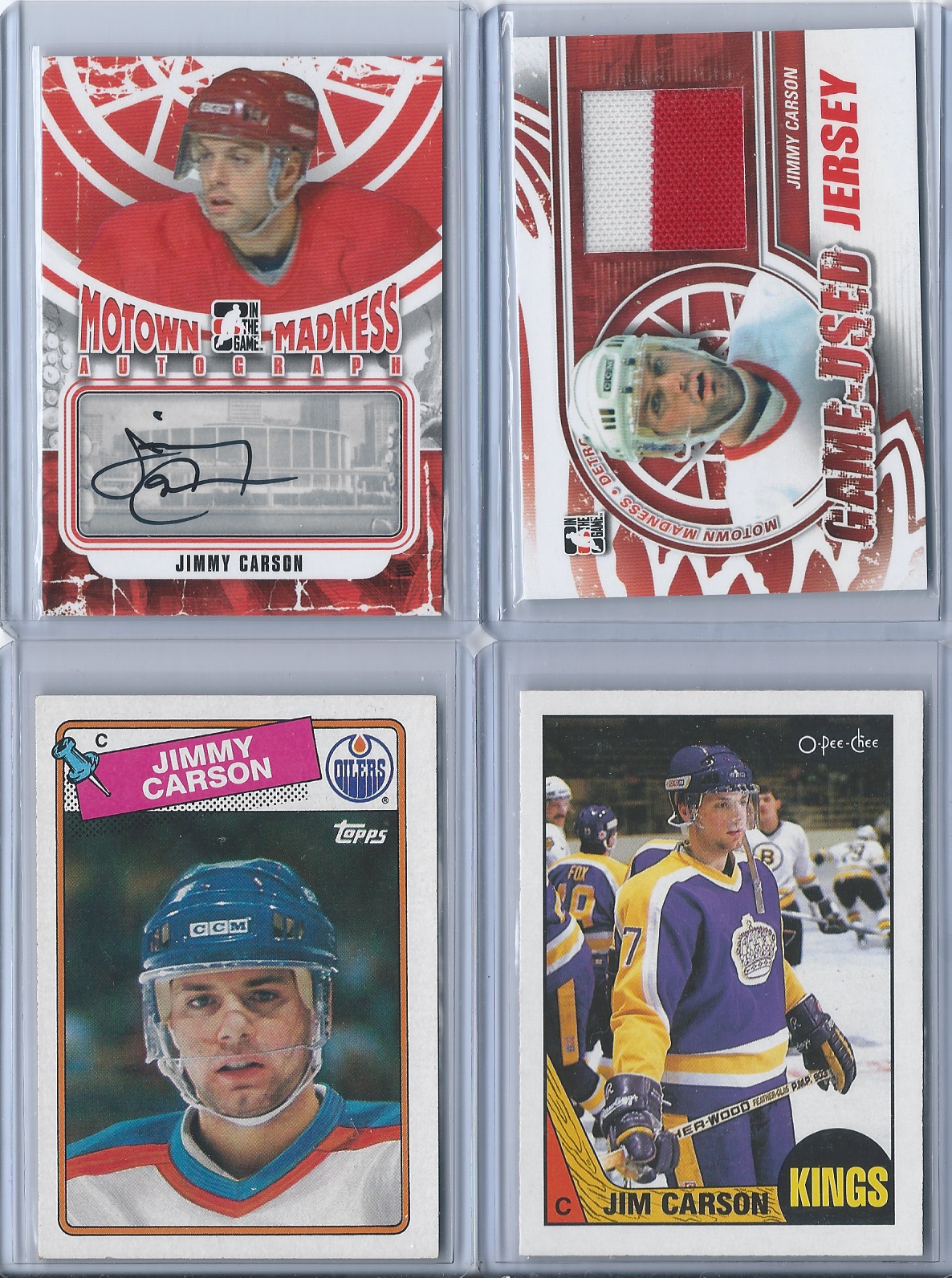
Jimmy Carson
Jimmy Carson was the 2nd overall pick in 1986. The Los Angles Kings put him on the Roster as an 18 year old in 1986-87, and he rewarded them with 37 goals. Carson didn't get the memo that you're supposed to have a sophmore slump: He followed up his rookie campaign by scoring another 55 for the Kings.
The Kings had marked Carson as a cornerstone of their young core, but a trade opportunity came along they couldn't pass up. He became the centre piece of a trade made on August 9th, 1988; the Kings made him part of the package they sent to the Edmonton Oilers for Wayne Gretzky.
Carson wasn't thrilled with his trade to Edmonton, but he didn't disappoint. The 1988-89 season saw him play in all 80 games (for the 3rd straight season) and he scored 49 goals, for a total of 100 points. He was definitely a piece for the Oilers to build around, but he never really wanted to be there.
The 89-90 season would start with Carson still wearing Orange & Blue, but he played only four games for the Oilers (scoring a single goal, giving him 50 with Edmonton) before he was given his wish, and he was traded. They sent him to his hometown team: The Detroit Red Wings.
Carson, Kevin McClelland, and a 5th round pick were sent to Motown, in exchanges for a package of Jeff Sharples, Adam Graves, Patr Klima, and one player taken ahead of him in 1986: Joe Murphy. While Carson wasn't part of the Oilers Cup win in 1990, the package they got for him certainly was.
Jimmy would play the 89-90 season with Detroit, along with two and a half. After 52 games in Detroit during the 1992-93 season, he was sent back to Los Angles (along with Gary Shuchuk and marc Potvin) for Sylvian Coururier, Jim Hiller, and former Oiler great Paul Coffey.
He'd finished the 92-93 season with the Kings, and start the 93-94 season with them, but midway through the 93-94 season he was traded north of the border once again: this time to the Vancouver Canucks, for Dixon Ward and a draft pick.
Carson would finish the year in Vancouver, and then sign a free agent deal with Hartford the following summer. He played the shortened 94-95 season i nHarford, along with part of the 95-96 season. He ended the 95-96 season in Switzerland, and completed his career by playing two season with the Detroit Vipers of the IHL.
Carson finsihed his NHL career with 275 goals, 286 assists, and 561 points.
Pictured are Carson's 1987-88 OPC Rookie Card, and 88-89 Topps card showing him as an Oiler, and then a pair of ITG Motown Madness cards: An autograph & a jersey card.
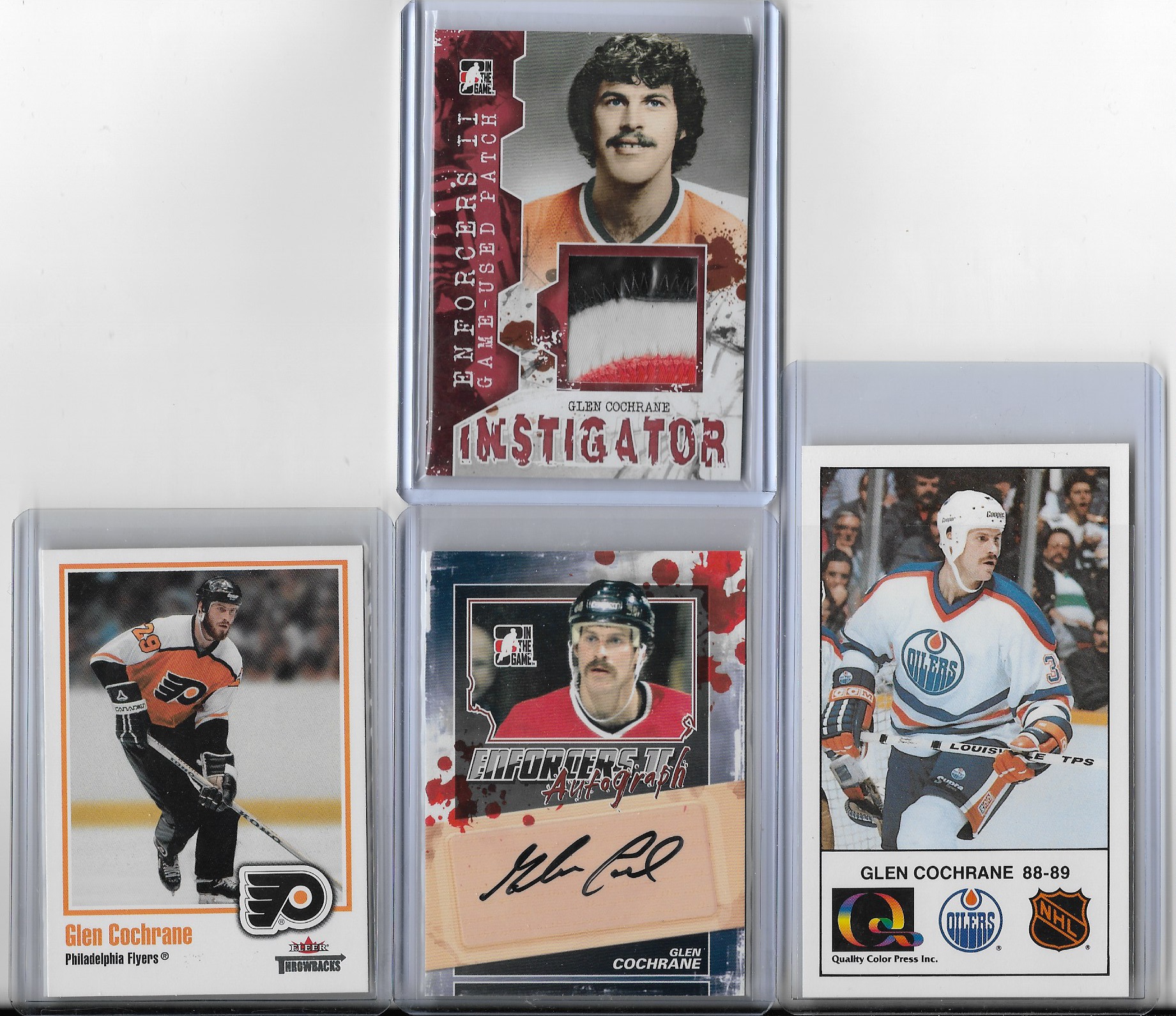
Glen Cochrane
The Philadelphia Flyers made Glen Cochrane a third round pick (#50) in the 1978 draft. He made his NHL debut the next season, playing one game for them during the 1978-79 season.
Cochrane split time between the Flyers & their AHL affiliate in Main during the 80-81 season too, but was a full time NHLer by 81-82.
He was a feared enforcer with Philly until the the 1985 trade dealine, when he was dealt to the Vancouver Canucks for a 3rd round pick.
He spent the 85-86 & 86-87 seasons with Vancouver, before the Chicago Blackhawks made him a waiver claim priot to the star of the 87-88 season. He stuck in Chicago until the early part of the 88-89 season, when Edmonton made him a waiver claim. He'd play a dozen games for the Oilers, logging 52 PIMs. He retired following the 88-89 season.
Pictured are four cards of Cochrane. The Oilers 10th anniversary (program insert) card is the only one made of him while he played, and the only one showing him as an Oiler. He got a true Rookie Card in 2002-03 Fleer Throwbacks. There's also a pair of ITG Enforcers cards: an Autograph, and an Intigator Patch.
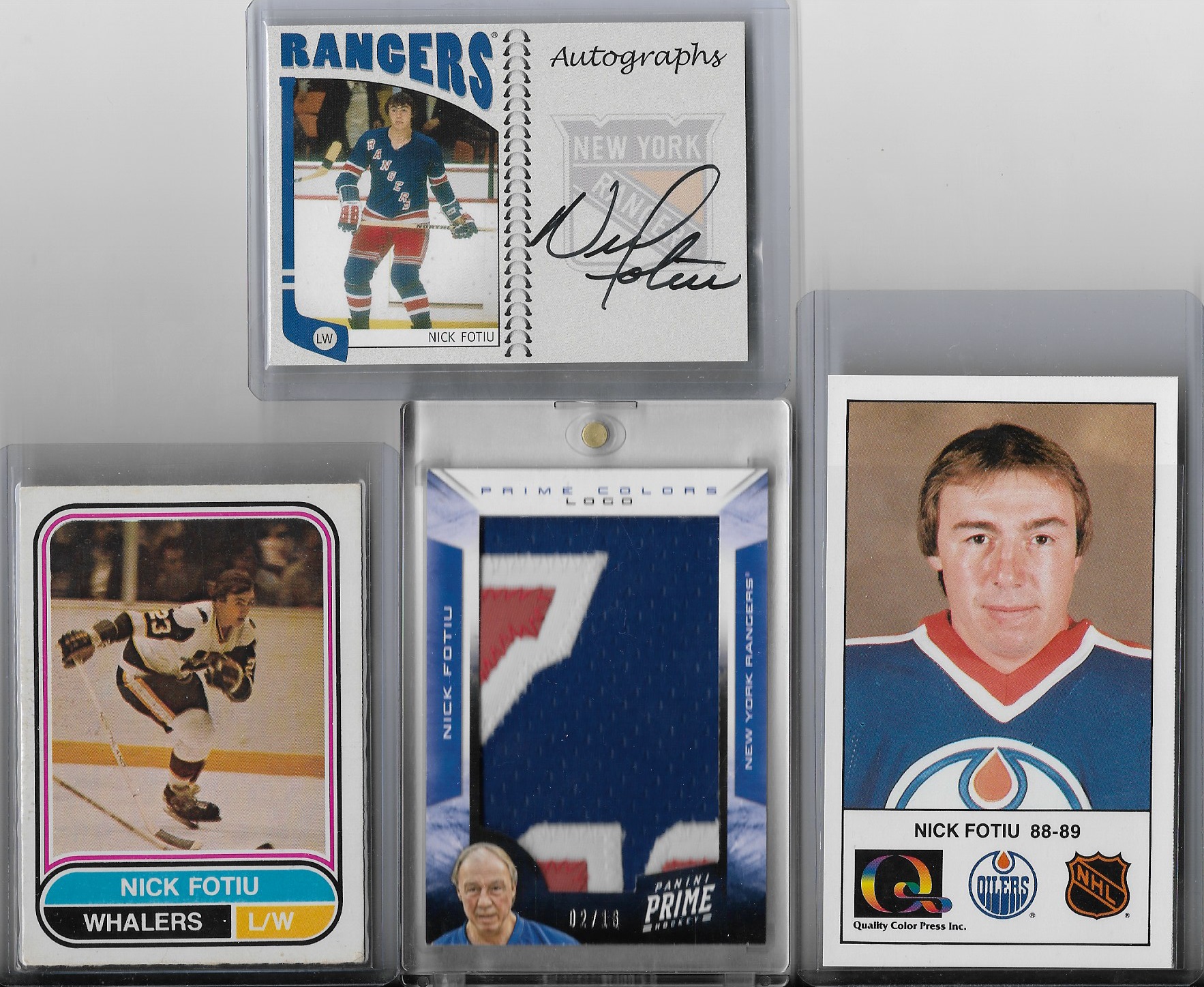
Nick Fotiu
An undrafted Left Winger, Fotiu began his career in the WHA with the New England Whalers in the 1974–75 season. Two years later, he signed with his hometown Rangers, where his role as an enforcer endeared him to Ranger fans. He was loved for his fighting style, which he picked up as a golden-gloves boxer, and that he was the first NYC-born Ranger. Fotiu played with the Rangers until 1979, when he was claimed by the Hartford Whalers in the 1979 NHL Expansion Draft. Fotiu's popularity as a Ranger was enhanced by his willingness to throw pucks up into the Madison Square Garden "blue seats" after pre-game warmups, where previously he sat as a young fan. The "blue seats" were the least expensive and farthest seats from the action, far beyond where pucks would normally land during game play.
Fotiu's second tour with the Whalers ended when he was traded back to the Rangers during the middle of the 1980–81 NHL season, where he remained for five seasons. He was traded to the Calgary Flames in 1986 and helped them get to their first Stanley Cup finals appearance. He played for Calgary again in 86-87, before skating in 23 games for Philadelphia in 1987-88. He'd play a single game for the Edmonton Oilers in 1988-89, before finishing his career with the New Haven Nighthawks in 1989-90.
Pictured are four cards of Fotiu: 1975-96 OPC WHA Rookie Card, his Oilers 10th Anniversary, an 04-05 ITG Franchises Autograph, and a 2012-13 Panini Prime Logos.
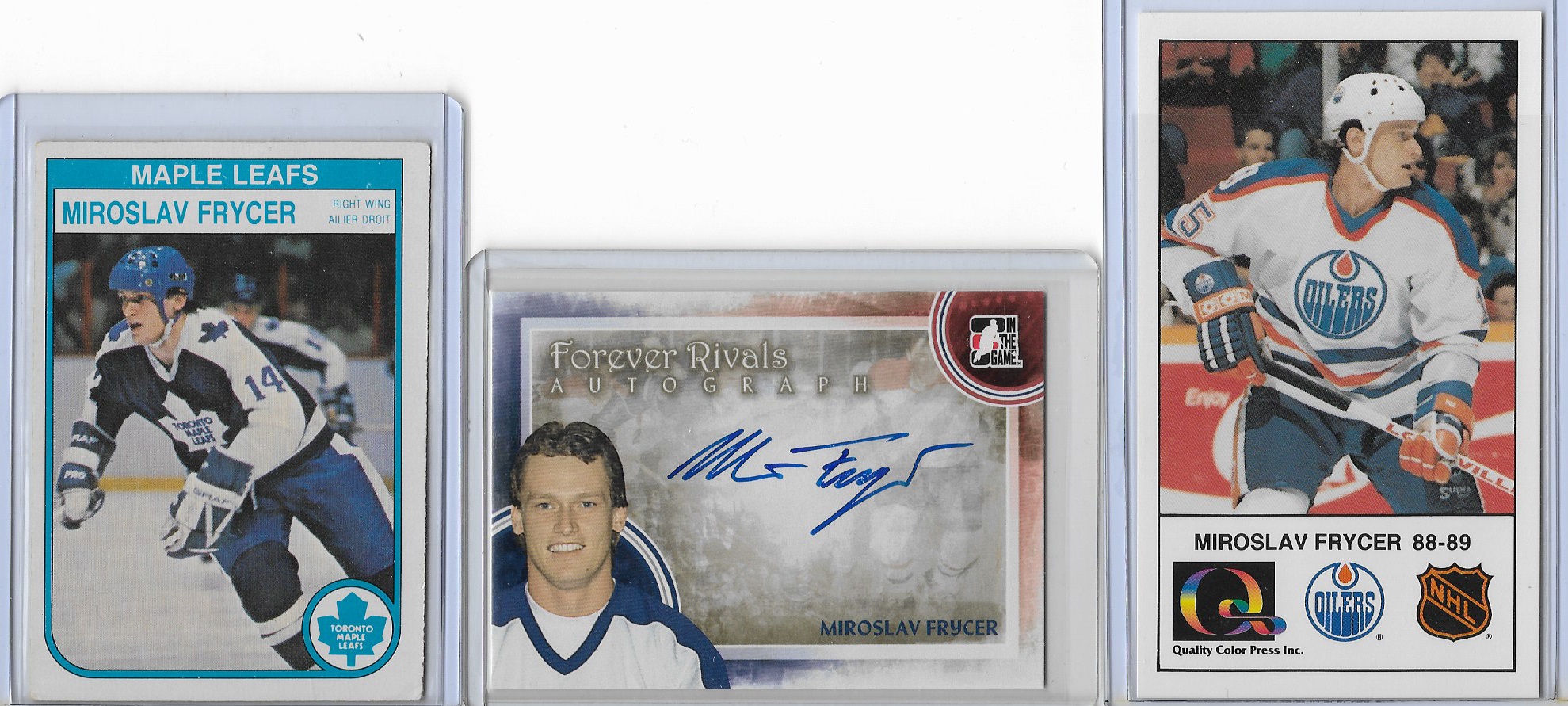
Miroslav Frycer
Miroslav Frycer defected from Czechoslovaki, and signed with the Quebec Nordiques. After some time in the AHL, he made is NHL debut in 1981, vs the Toronto Maple Leafs, and scored a hatrick.
He wouldn't last the season in Quebec. Despite impressive totals of 20 goals & 37 points in 49 games, the Nords shipped him to Toronto at the trade deadline for Wilf Paiement.
Frycer would spend the next seasons with the Leafs. He put up seasons with 25, 25, and 32 goals - but those three were his only "close to full" seasons. He couldn't beat the injury bug, and played in just 29 and 38 games in his final two Toronto campaigns.
The Leafs would trade him to Detroit during the summer of 1988. He scored 7 goals in 23 games for the Red Wings, but they shipped him to Edmonton. He played 14 games for the Oilers, scoring 5 goals and 5 assists.
Frycer would lreave the NHL after the 88-89 season, and went back to Europe. He'd play two seasons with Freiburg EHC in the German Budasliga, before retiring.
Pictured are Frycer's 82-83 OPC Rookie Card, an ITG Forever Rivals Autograph, and his Oilers 10th Anniversary Card.
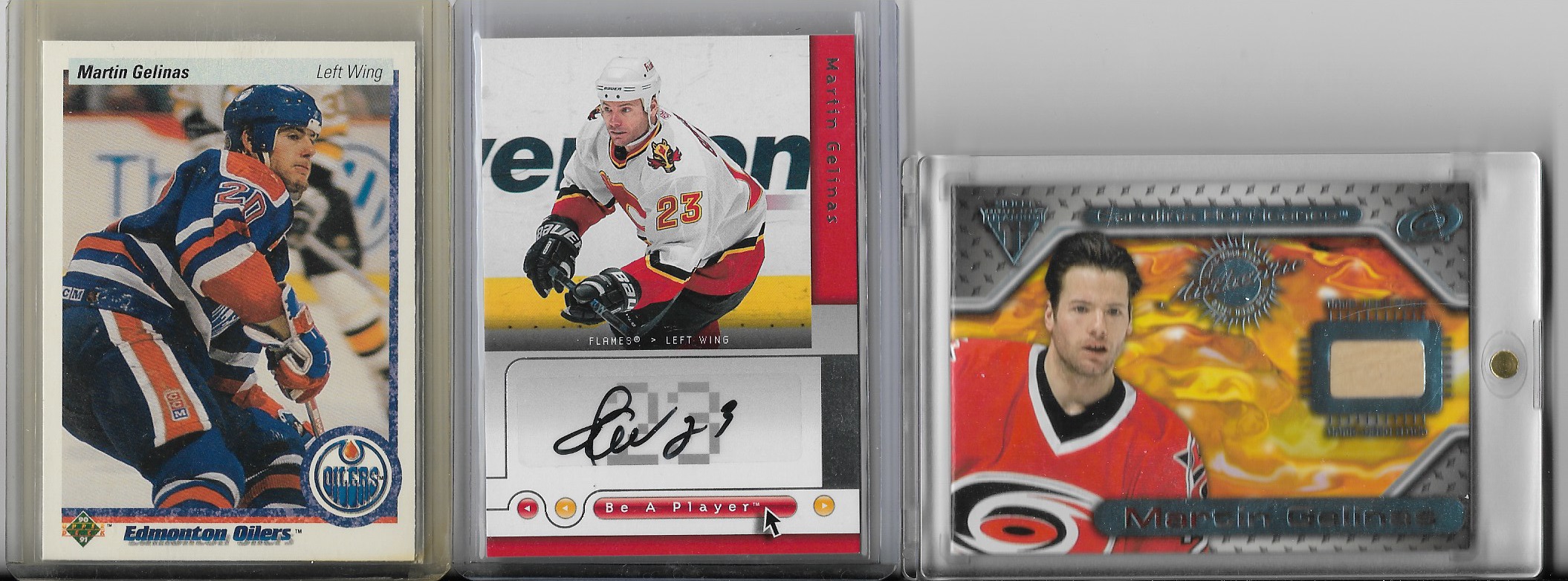
Martin Gelinas
The Los Angles Kings made Martin Gelinas the 7th overall pick in 1988, but he only lasted months in the organization. He was part of the packaged sent to Edmonton for Wayne Gretzky.
Gelinas scored a goal during his 6 games debut with the Oilers during the 88-89 seaosn, but he really hit his stride in 1989-90. He scored 17 times in 46 games, and popped another two in 20 playoff games - as Gelinas was part of the Oilers 1990 Stanley Cup winning team.
The Oilers dealt Gelinas to the Quebec Nordiques during the summer of 1993, for Scott Pearson. He played only half the season in Quebec before being waived, and calimed by the Vancouver Canucks.
The 1995-96 season saw Gelinas, still in Vancouver, score 30 - when his prior career high was 20. Fluke? Nope. He popped 35 more the next season.
In January of 1998, Gelina was part of a massive five player swap with the Carolina Hurricans. He was sent to Raleigh along with Kirk McLean, for Sean Burke, Enrico Ciccone, and Geoff Sanderson.
He'd play four more season in Carolina, before signing with the Calgary Flames. He played two seasons with them, before joining the Florida Panthers in 05-06, and the Nashville Predators in 07-08. He played the 08-09 season in Switzerland, before retiring.
Gelinas had fives seasons with 20+ goals, and has the distinction of making it to the Stanley Cup finals with four different teams: Edmonton, Vancouver ('94), Carolina ('02), and Calgary ('04). He tied a record in 2004 by scoring three series-winning goals in one playoff year, earning the nickname "The Eliminator"
Pictured are Gelinas' 90-91 Upper Deck Rookie Card, an 05-06 Upper Deck BAP Autograph, and an 00-01 Titanium Game Used Stick card.
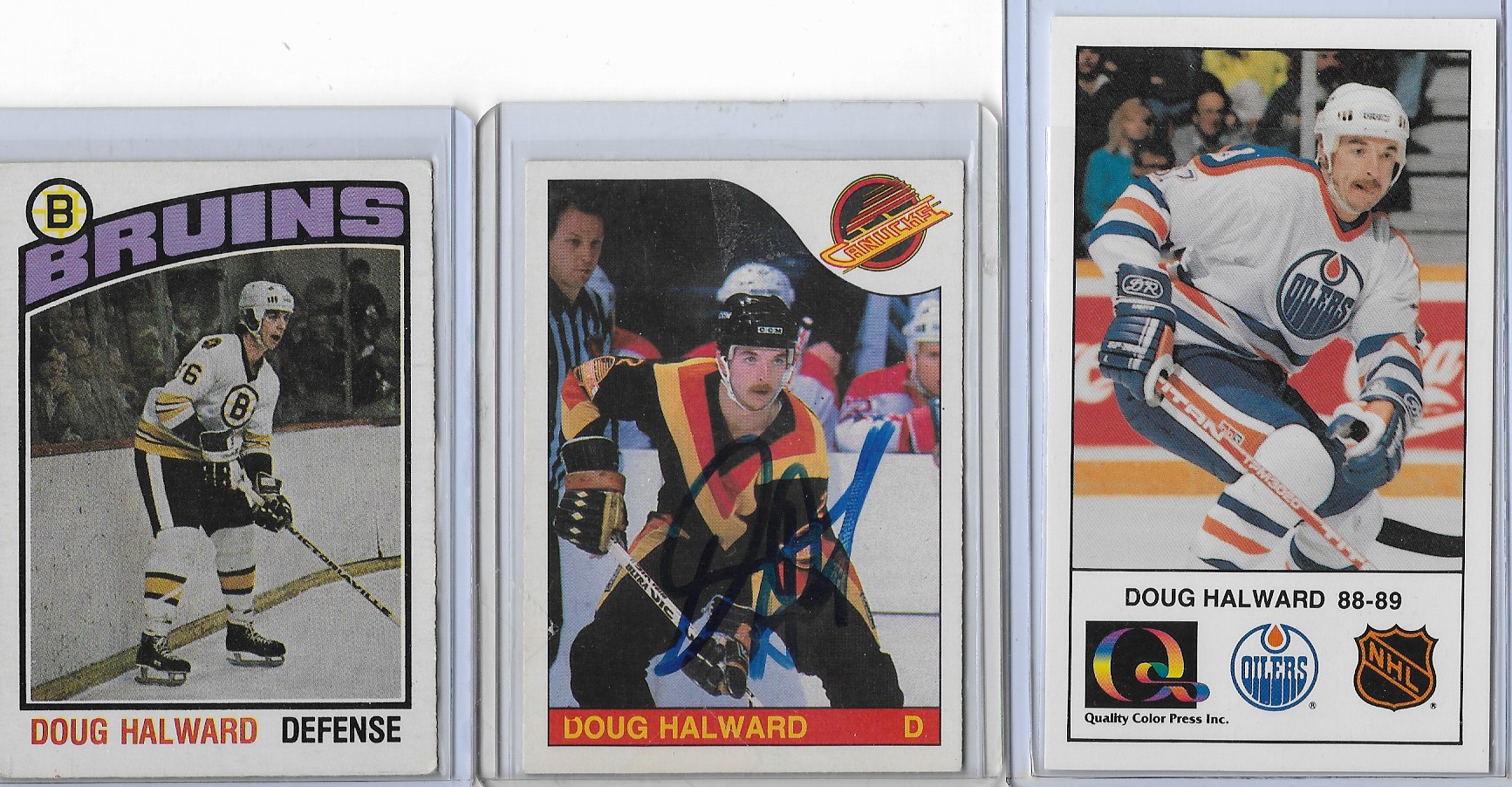
Doug Halward
1975 saw Dog Halward as the 14th overall pick in the NHL Draft (Boston) and the 29th overall pick in the WHA Draft (Quebec). He'd pick the NHL's Bruins, and his pro career started the following season.
After three season, Halward was traded to the Los Angles kings on the eve of the 78-79 season. Partway through the 80-81 season he'd be dealt tothe Vancouver Canucks.
He found a long term home in Vancouver. After 7 games at the end of the 80-81 season, he played there for another five seasons, and started a sixth. After 10 games in Vancouver in 86-87, he was traded to the Detroit Red Wings for a pick.
He'd play in Detroit until they trade him to Edmonton during the 88-89 season. Halwards' Oilers career was 24 games that season, where he recored 7 assists, and 25 PIMs. He'd retire following the 88-89 season.
Pictured are his 76-77 OPC Rookie Card, a signed copy of his 85-86 OPC, and his Oilers 10th Anniversary Card.
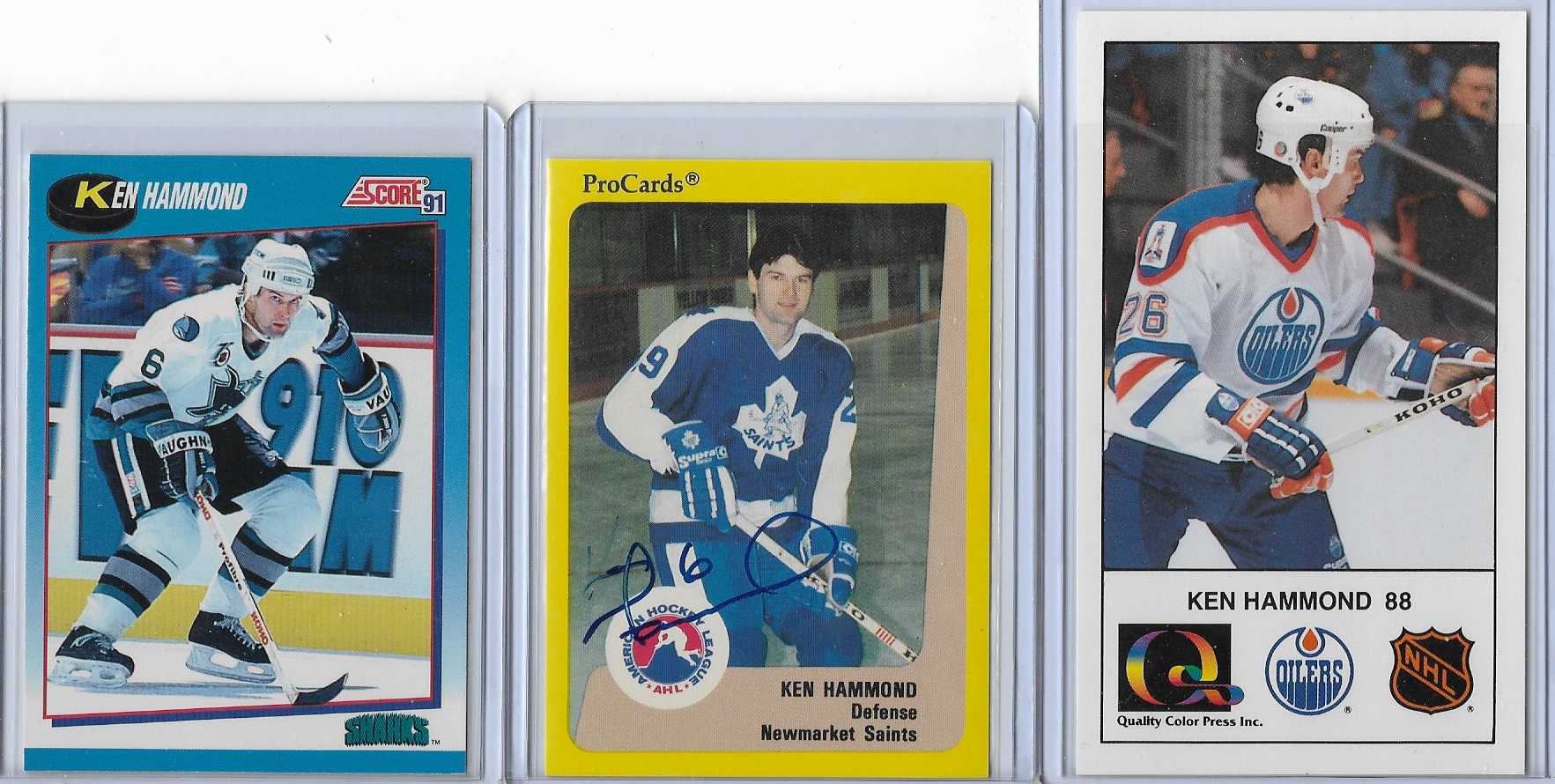
Ken Hammond
Ken Hammond was selected by the Los Angles Kings, 147th overall, in 1983. He'd make his debut with the Kings in 1984-85, playing three games, and scored his first career goal.
Hammond spent the next few seasons up & down between the Kings & the minors, playing a total of 16 NHL games in his first three seasons as a pro, but he spent the bulk of the 87-88 season in Los Angles, playing 46 games.
He'd be waived prior to the start of the 88-89 season, and he was claimed by the Oilers. He played just five games with Edmonton before being waived again, and was claimed by the New York Rangers.
After three games with the Rangers, and thirty-eight with their AHL club, he was traded to the Toronto Maple Leafs. He played 14 games with them that season - his 3rd NHL club in 88-89.
Hammond would spend the 89-90 season in Newmarket, with the Leafs' AHL club, and was traded to Boston in 1990. He'd play just a single regular season game for the Bruins, he was still mostly a farm hand, but he did skate in eight playoff games for them.
He joined the expansion San Jose Sharks in 1991-92. He'd play 46 games for them (his NHL career high, to that point) before being a deadline acquisition of the Vancouver Canucks. He didn't play in the regular season for them, but he did play in two playoff games.
He was claimed by Ottawa in the 1992 expansion draft, and played his final 62 NHL games for the Senators in 1992-93. He'd spend three more years in the minors, before retiring.
Pictured are three cards of Hammond: His 1991-92 Score Rookie Card, a signed AHL Card, and an Oilers 10th Anniversary card.
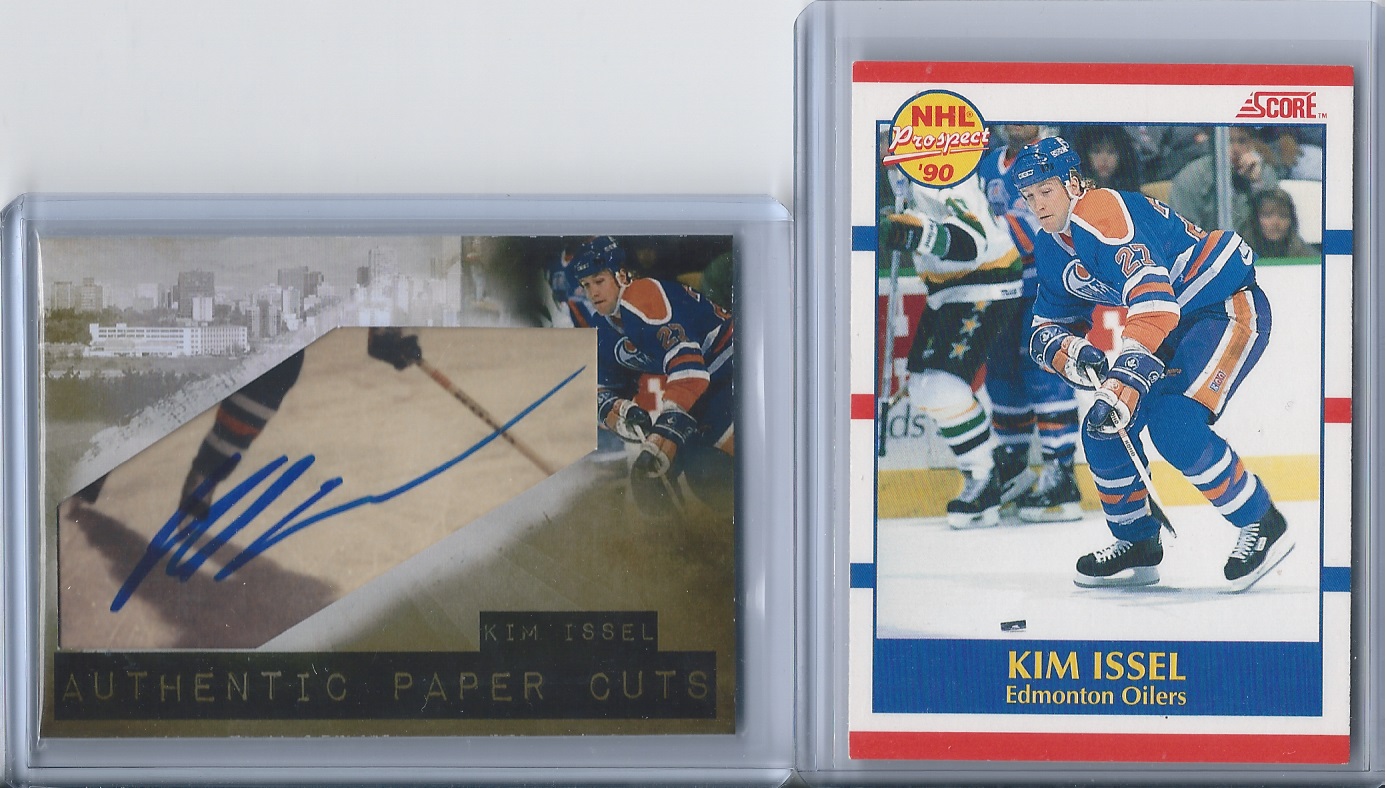
Kim Issel
Issel spent his junior career with the Prince Albert Raiders of the WHL, where he was an allstar. This led to him being selected in the first round of the 86 Draft, 21st overall, by the Edmonton Oilers.
From 87-88 through 90-91, Issel played mostly with the Oilers farm team in Cape Breton, but he did lace 'em up for four games in 88-89 - going scorless.
Despite multiple 30 goals seasons in the minors, he was just never able to crack a stacked Oilers roster. The Oilers traded him to Pittsburgh, for Brad Aitken, in 1991. He finsihed the season with Kansas City, then Penguins IHL affiliate at the time.
After the end of 90-91 season, Issel went across the Atlantic, where he played another nine seasons, in places like Austria, Italy, Germany, England, and Slovenia. He'd retire in 1999.
Pictured are Issel's 90-91 Score Rookie Card, and a cut signature card.
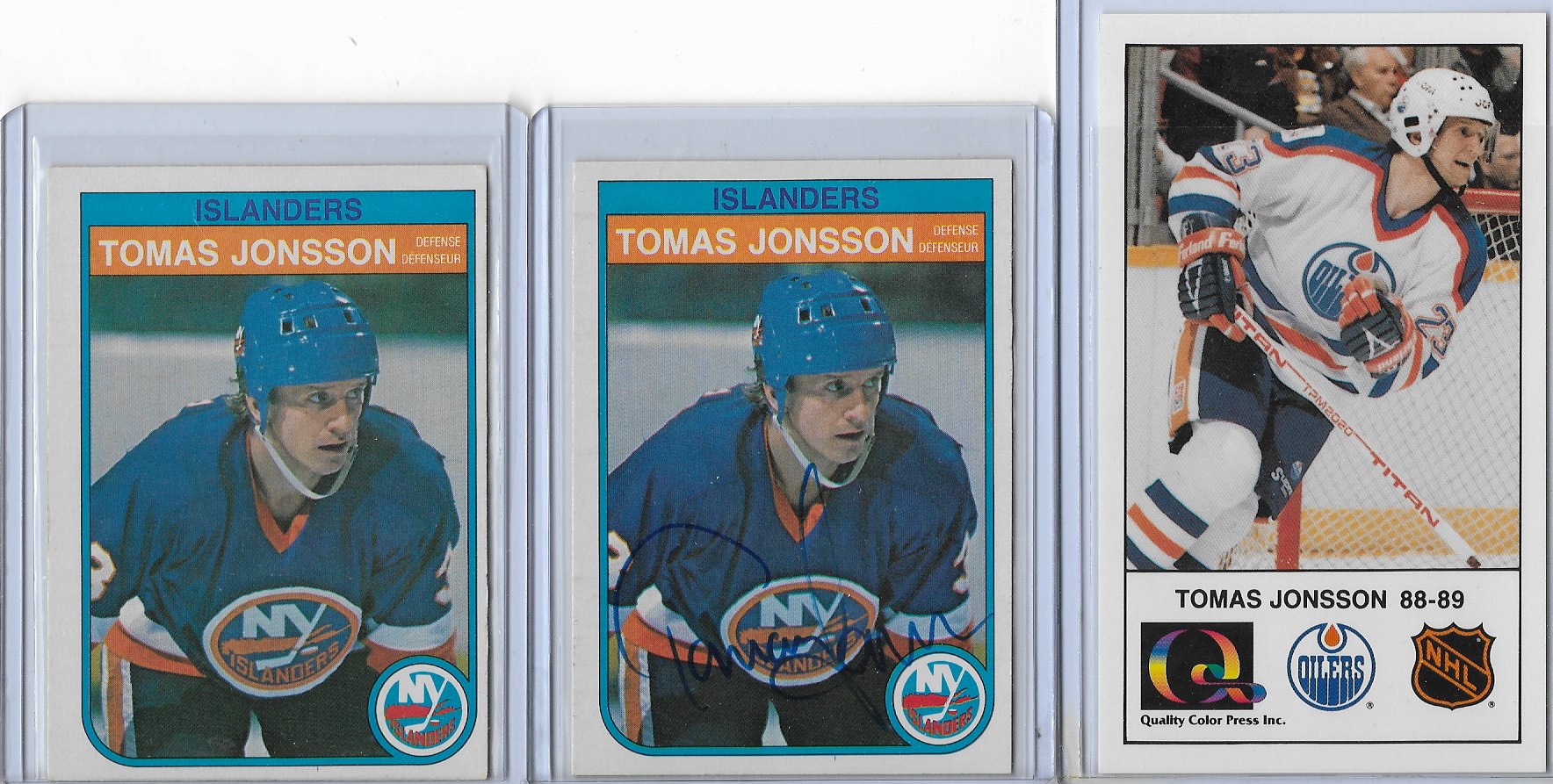
Tomas Jonsson
Jonsson was drafted by the New York Islanders in the 1979 NHL Entry Draft: 2nd round, and the 25th overall pick.
During the 1980 World Junior Championships he and Reijo Ruotsalainen were the media's picks as the best defencemen of the tournament.
Jonsson made his NHL debut with the Islanders in the 1981–82 season, winning a Stanley Cup championship, and helped the Islanders win their 4th straight in 82-83.
Jonsson played with the Islanders until 1989, when he was traded to the Edmonton Oilers for future considerations. He played 20 games for the Oilers, and 4 more in the playoffs, when the Oilers were bounced in the first round by the Kings.
He'd then return to Sweden, playing with Leksands IF until 1998. He was named Swedish Player of the Year in 1994–95.
In 1994 Jonsson won an Olympic gold medal. That made him one of the first three members of the Triple Gold Club, players who have won a Stanley Cup, a World Championship and an Olympic gold medal. Jonsson was inducted into the IIHF Hall of Fame in 2000.
Pictured are a pair og Jonsson's 82-83 OPC Rookie Cards. One signed, and one not, along with his Oilers 10th anniversary card.
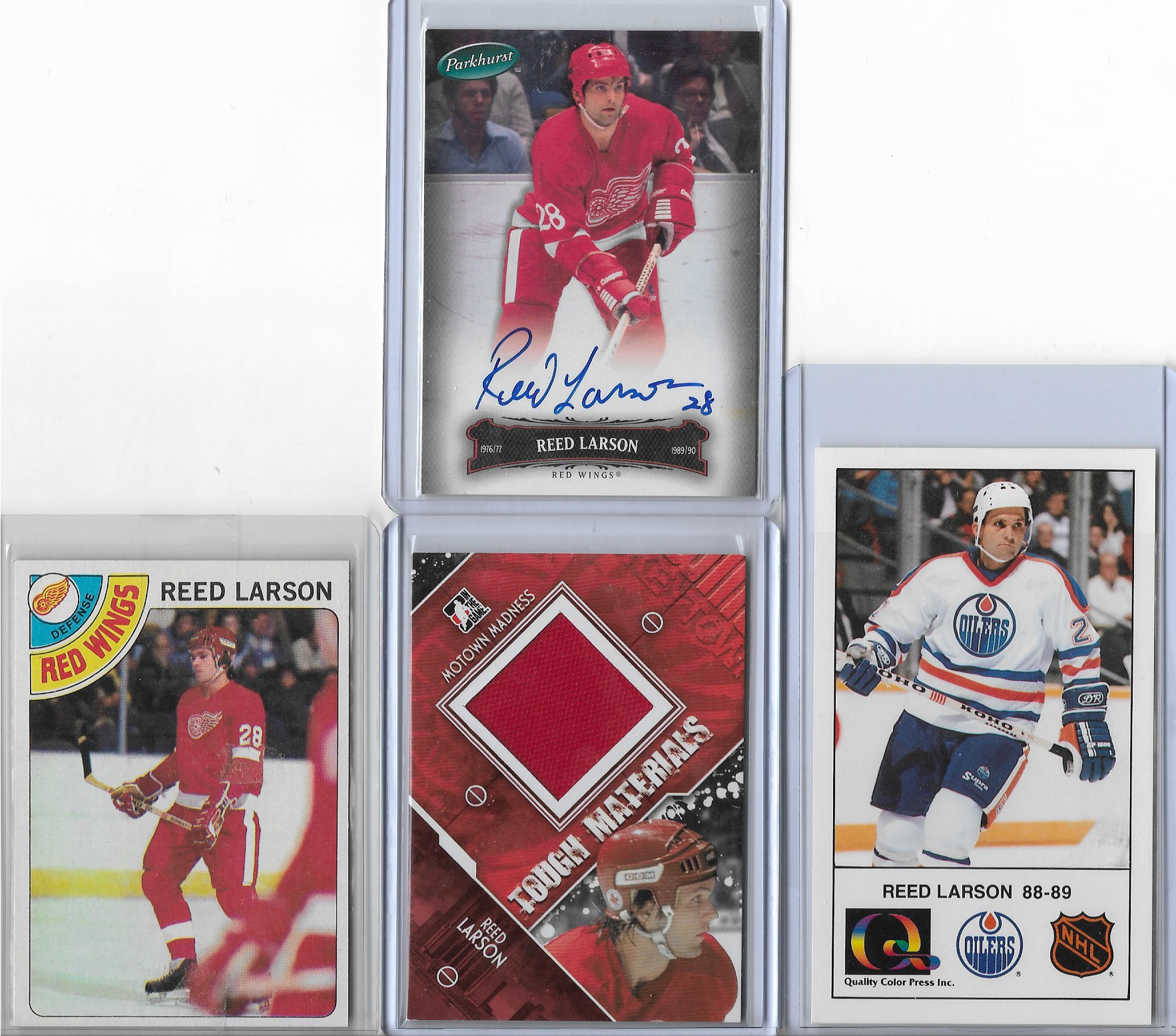
Reed Larson
Larson played three seasons with the University of Minnesota Gophers, under famed coach Herb Brooks. He'd then be drafted 22nd overall by the Detroit Red Wings in 1976. His hometown Minnesota Fighting Saints, of the WHA, had already drafted him in 1974, but he never joined the rebel league.
Reed would join the Red Wings late in the 76-77 season, after the Gophers suspended him for assaulting an official during a WCHA game. He made his NHL debut, playing 14 games for the Wings, and was supposed to be part of Team USA's contingent at the 1977 World Championships, but missed the tourney due to a shoulder injury.
His first full season in the NHL (77-78) was a great one. He was known for his toughness on the blue line, but also his offence. He lead all rookie defenseman with 60 points.
He'd become the first American born defenseman to score 200 goals, and was an NHL allstar in 1978, 1980, and 1981. He finally got to represent his country, playing for Team USA at the 1981 World Championships, and the 1981 Canada Cup.
The Red Wings would ultimatly deal him to the Boston Bruins during the 85-86 season. He played with them through the end of 87-88, and then signed with the Oilers.
He started the 88-89 season with Edmonton, but played only 10 games (scoring 2 goals, and adding 9 helpers) before being traded to the New York Islanders. After 33 games in Long Island, he'd be traded again, to his home town North Stars, where he finsihed the season.
Larson played his final NHL game with the Buffalo Sabres in 1989-90, logging just a single game with them, before going to play in Italy. He was a player-coach in Italy's top league through 1993-94, and played the 94-95 season with the IHL's Minnesota Moose before retiring.
The three time all-star is a member of the USA Hockey Hall of Fame, and was named one of the 50 greatest players in University of Minnesota hockey history.
Shown here are my four cards of Larson: His 78-79 OPC Rookie Card, an 06-07 Parkhurst Autograph, an ITG Motown Madness Tough Materials, and his Oilers 10th Anniversary card.
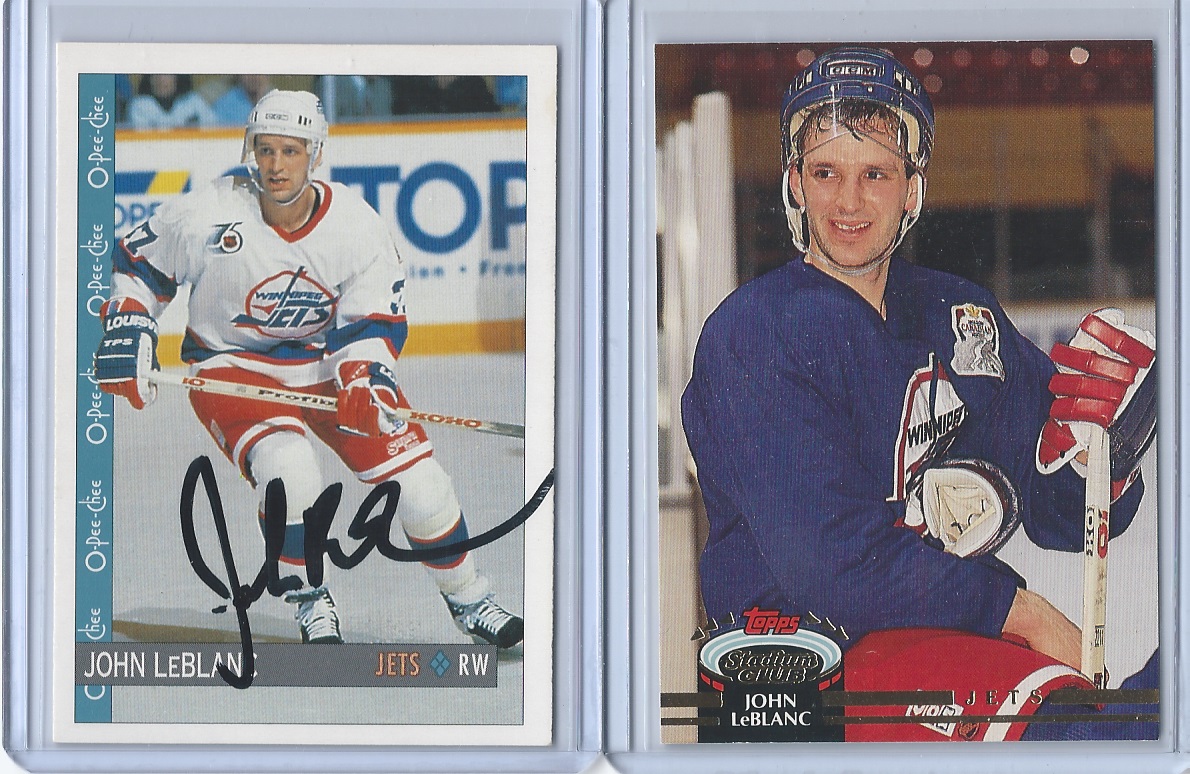
John LeBlanc
Undrafted, John LeBlanc played junior hockey with the Hull Olympiques, and then spent two seasons playing for the University of New Brunswick. He also played for the Canadian National team in 85-86.
He'd sign with the Vancouver Canucks, and spent the bulk of the 86-87 season with the AHL's Fredericton Express, but made his NHL debut playing twice for Vancouver.
He's split the 87-88 season between Fredericton & Vancouver, playing 41 NHL Contests.
The 88-89 season saw him play 61 games for the IHL's Milwaukee Admirals, before Vancouver shipped him to Edmonton at the 1989 trade deadline (along with a 5th round pick) for Greg Adams & Doug Smith. He'd play 3 games for the Oilers AHL club, 2 regular season games for the Oilers, and made his NHL playoff debut with Edmonton, playing a single post season game.
The 89-90 season saw LeBlanc back in the minors with Cape Breton, where he led the AHL in goals, with 54. He'd leave the Oilers organization, and sign with the Winnipeg Jets, but he was never able to stick in the NHL.
He had season of 16, 3, 17, and 2 NHL games with Jets, playing mostly with the AHL's Moncton Hawks. His last NHL games were the two he played with Winnipeg in 94-95, but he continued to play in the minors after that - retiring at the end of the 00-01 season.
Pictured are LeBlanc's 92-93 Topps Stadium Club RC, and a signed copy of his 92-93 OPC Rookie.
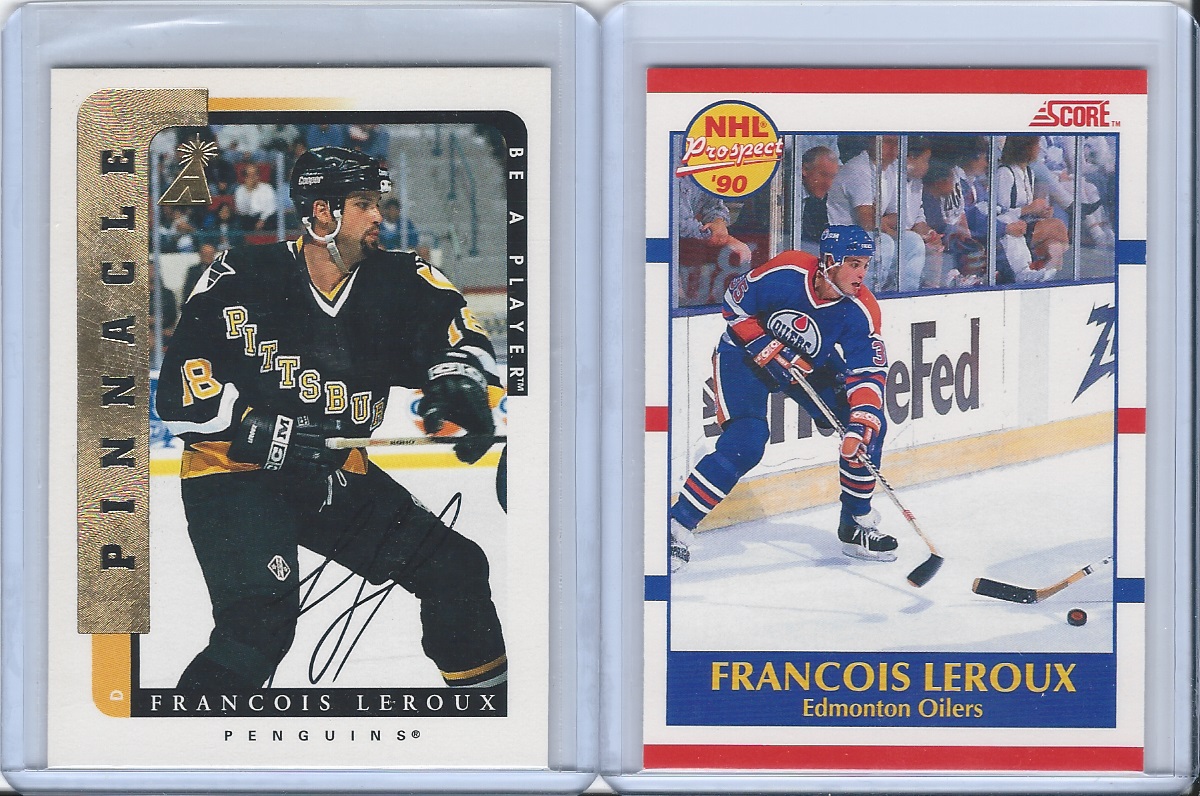
Francois Leroux
The Edmonton Oilers made Francois Leroux their first round pick, 19th overall, in 1988. The 6'6" defencemen was known to be tough as nails, coming out of the QMJHL.
He'd make his NHL debut in 1988 with Edmonton, playing two games for them, but spent most of the season back in junior. 89-90 saw the same arrangement. He played 3 games for the Oilers, but mostly in the Q.
1990-91 would be Leroux's first full season in professional hockey. He played just a single game for the Oilers, spending most of the year in Cape Breton, the Oilers' AHL affiliate.
The next two seasons would go the same way. He played another five games in the NHL in those two seasons, spending most the year in the AHL. He'd ultimately be claimed by the Ottawa Senators on waivers just before the start of the 93-94 season.
The 93-94 season saw Leroux split it between the NHL & AHL, but it was a much more even split. He skated 23 times for the Senators that season, after only playing 11 games for the Oilers over the prior five!
He'd start the 94-95 season with Ottawa's AHL club in PEI, playing 45 games, before the NHL lockout ended, and the season was ready to start. He'd be claimed on waivers by the Pittsburgh Penguins, and played in 40 games for them that season.
At this point, Leroux had become a fulltime NHLer. He played 66 & 59 games with the Pens over the next two seasons, before signing with Colorado and playing 50 for them in the 1997-98 season.
That was the end of Leroux's NHL career, but he contined to play in the minors. He had stops in the IHL (Grand Rapids), AHL (Springfield, Scranton), and the DEL (Berlin, Germany). He would sign again with the Pens, playing only for Scranton, and was traded to the Coyotes (along with Jan Hrdina) but never played in Phoenix.
Leroux would reitre following the 02-03 season, but was talked out of retirement to join the LNAH's St. Jean Cheifs in 2006-07. He play two seasons for them, also spending part of the 07-08 season with the ECHL's Wheeling Nailers, before reitring for good.
Pictued are Leroux's 90-91 Score Rookie Card, and his BAP Autograph.
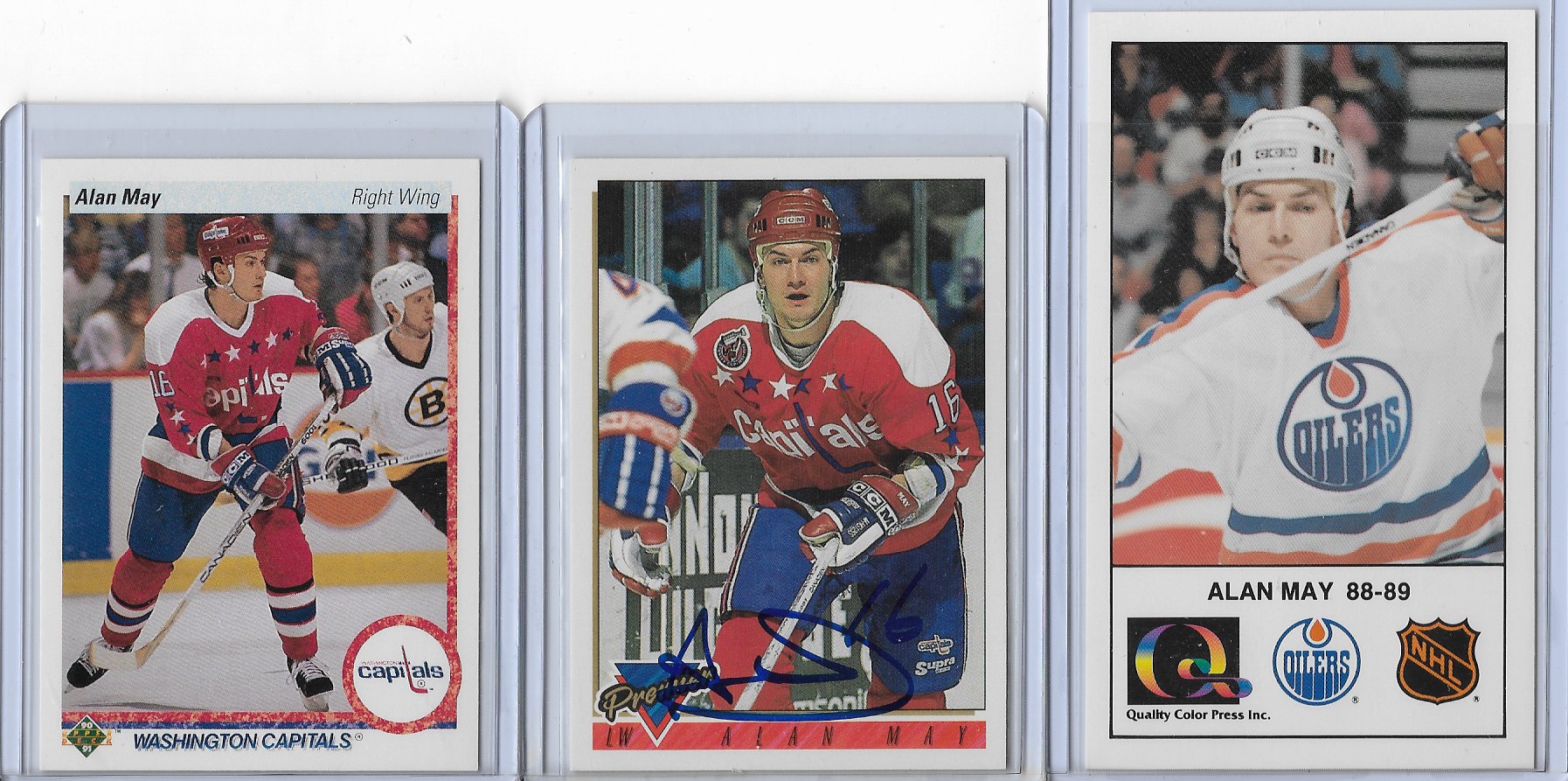
Alan May
Alan May was undrafted, before signing with the Boston Bruins. He played the bulk of the 86-87 season with Carolina Thunderbirds (of the, then, ACHL - now the ECHL) and holds the distinction of being the first ECHL (or ACHL) alumni to play in the NHL.
May played just three games with the Boston Bruins in 87-88, and was traded to the Edmonton Oilers at the deadline, for Moe Lemay.
Almost a year to the day later, after a mere 3 games with the Oilers, May would be involved in a deadline deal again. He was traded to Los Angeles (along with Jim Wiemer) for John English & Brian Wilks.
May never played for the Kings, just their AHL affiliate in New Haven. He was traded that summer to Washington, a trade that worked out great for the Capitals & for May.
1989-90 saw May hit his stride, after being given a better opportunity with the Caps. He'd play 77 games, and was a full time NHLer. This trend continued until March of 1994, when the Capitals traded him to Dallas. This marked the third trade deadline day that saw an Alan May trade!
Alan was a Dallas Star to being the (shortened) 94-95 season, but was traded to the Calgary Flames for a draft pick, at the trade deadline. His four deadline deals is an NHL record, that was matched by Tomas Vanek in 2018.
May never played in the NHL again, after his 7 games with Calgary. He played another three seasons in the minors, mostly in the IHL. May retired following the 98-99 season.
Pictured are May's 90-91 Upper Deck Rookie Card, a signed copy of his 93-94 Premier, and his Oilers 10th Anniversary.
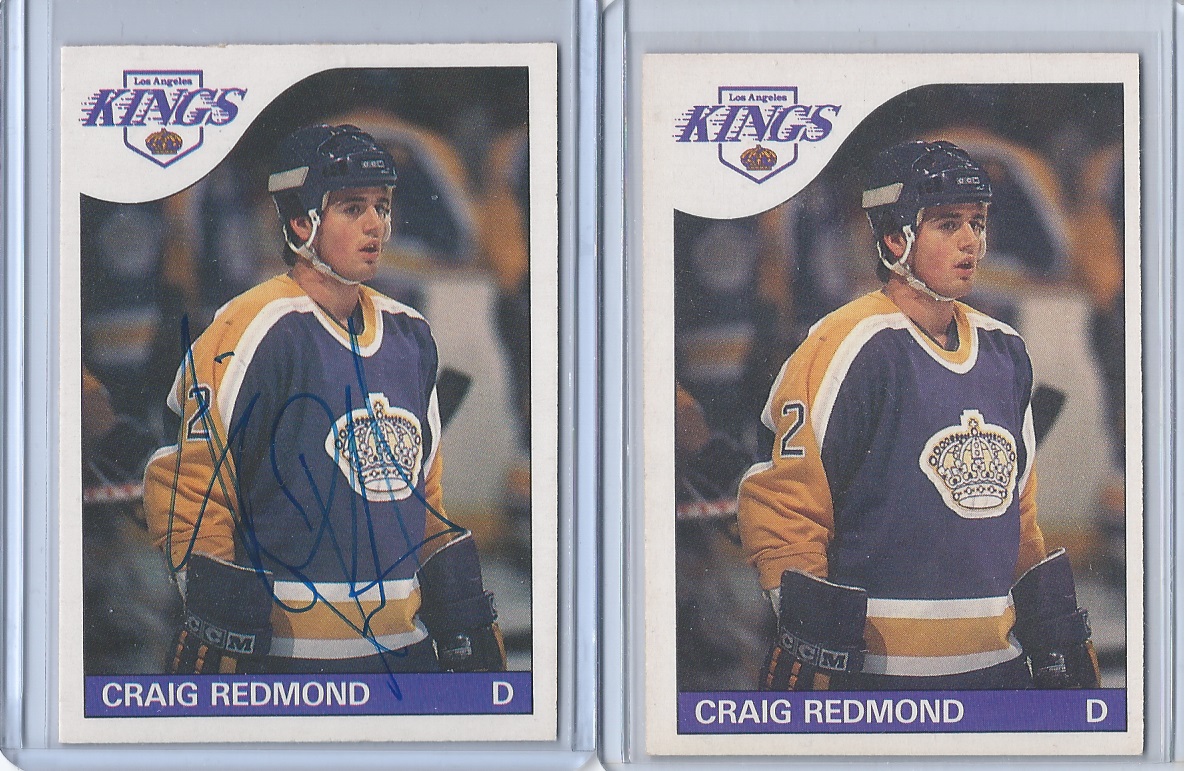
Craig Redmond
Craig Redmond finished fourth in scoring as a 16-year old defenseman, in the BCHL. He'd be named an all-WCHA defenseman at the University of Denver (as a 17 year old). He'd represent Canada at the 1984 Winter Olymlpics.
This all translated into the Los Angeles Kings drafting him 6th overall in 1984.
He played two full seasons with the Kings in 84-85 & 85-86, but had a brief stint in the minors in 86-87. The combination of a knee injury & inconsistant play in his own end, led to another demotion. One he wouldn't accept.
The Kings shipped him out of town (finally) in the summer of 1988. He was traded to the Edmonton Oilers for John Miner.
Redmond's career as an Oiler was breif. He played 21 NHL games fo the Oilers in 88-89. He was claimed off waiver by the New York Rangers, and then again by the Oilers from the Rangers. He played 44 games with the Cape Breton Oilers, and 10 with the Denver Rangers that season.
Craig would retire after the 88-89 season, but made a comeback in 95-96. He played another 43 AHL with the Cape Breton Oilers, and 25 with the IHL's Atlanta Knights.
Pictued are two copies of Redmond's 85-86 OPC Rookie Card, one of them signed.
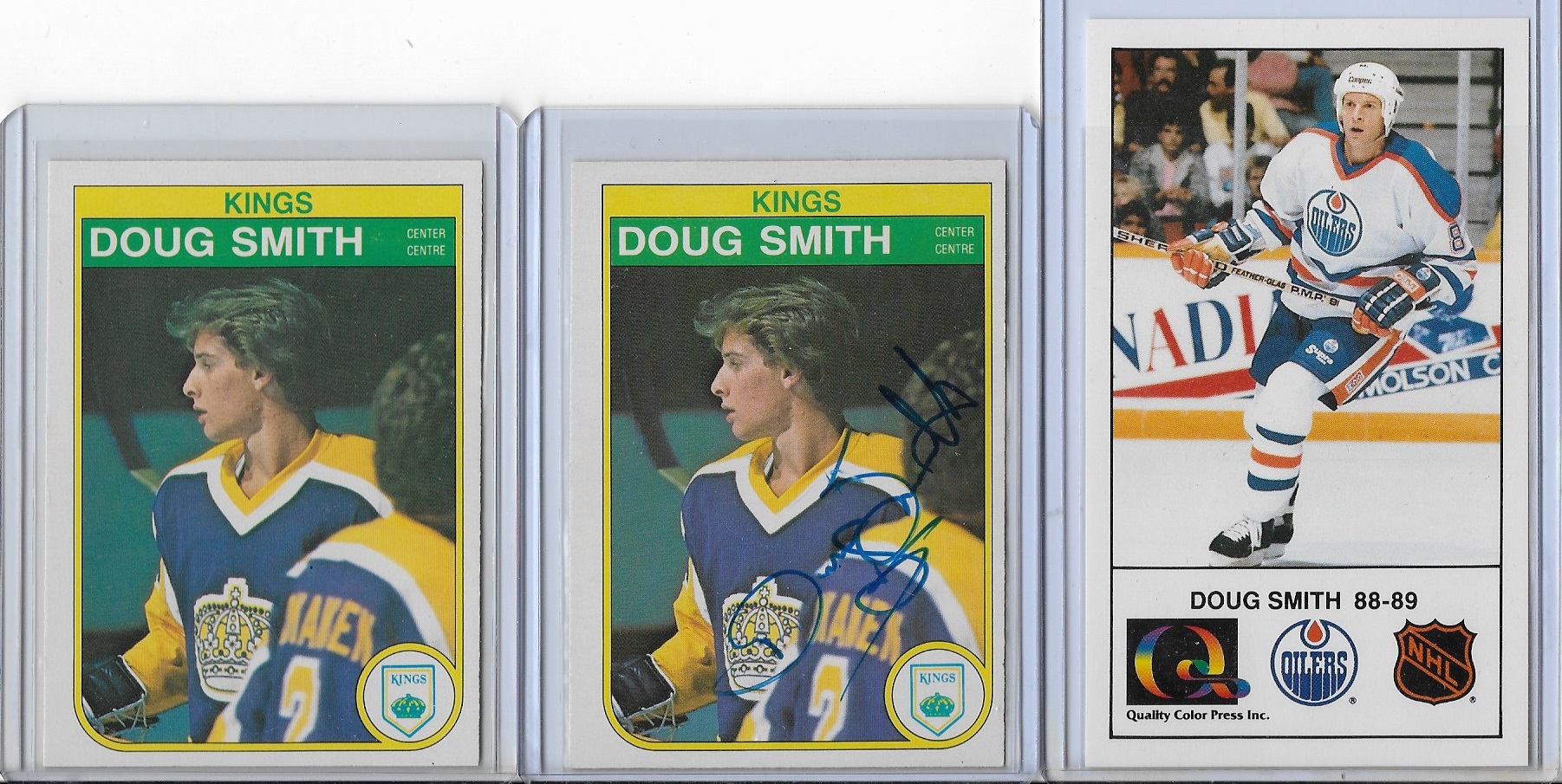
Doug Smith
Doug Smith was the 2nd overall pick in the 1981 Draft, by the Los Angeles Kings.
The Centre would make his NHL debut in 1981-82, playing in 80 games for the Kings. He spent a total of five seasons with the Kings, and scored 21 goals in the 84-85 season, but Smith never quite lived up to his hype, though never spent any time in the minors either.
He'd be traded to Buffalo in January of 1986. He'd finsih the season with the Sabres, and spent the next two NHL seasons there - with a brief stint in Rochester, BUffalo's AHL affiliate.
The Edmonton Oilers would come calling, claiming him in the 1988 waiver draft. He logged 19 games for the the Oilers in 88-89, and 24 games for their farm club.
He didn't last the season in Edmonton. He'd be traded to Vancouver at the deadline. He played close to half the NHL season with Vancouver in 89-90, before a trade to Pittsburgh. His 10 games with the Penguins were his last in the NHL, he head to Europe after that.
Smith spent the 90-91 & 91-92 seasons in Austria. During the 91-92 season, tragedy struck. Smith was injured in a collision, and became a quadriplegic.
Despite the initial prognosis, Smith would beat his diagnosis. He regained the use of all limbs, and was even able to play hockey again (though never professionally). He's since became an author, businessman, public speaker, an community leader in his hometown of Ottawa.
Pictured are a pair of Smith's 82-83 OPC Rookie Card (one signed) as well as his Oilers 10th anniversary card.
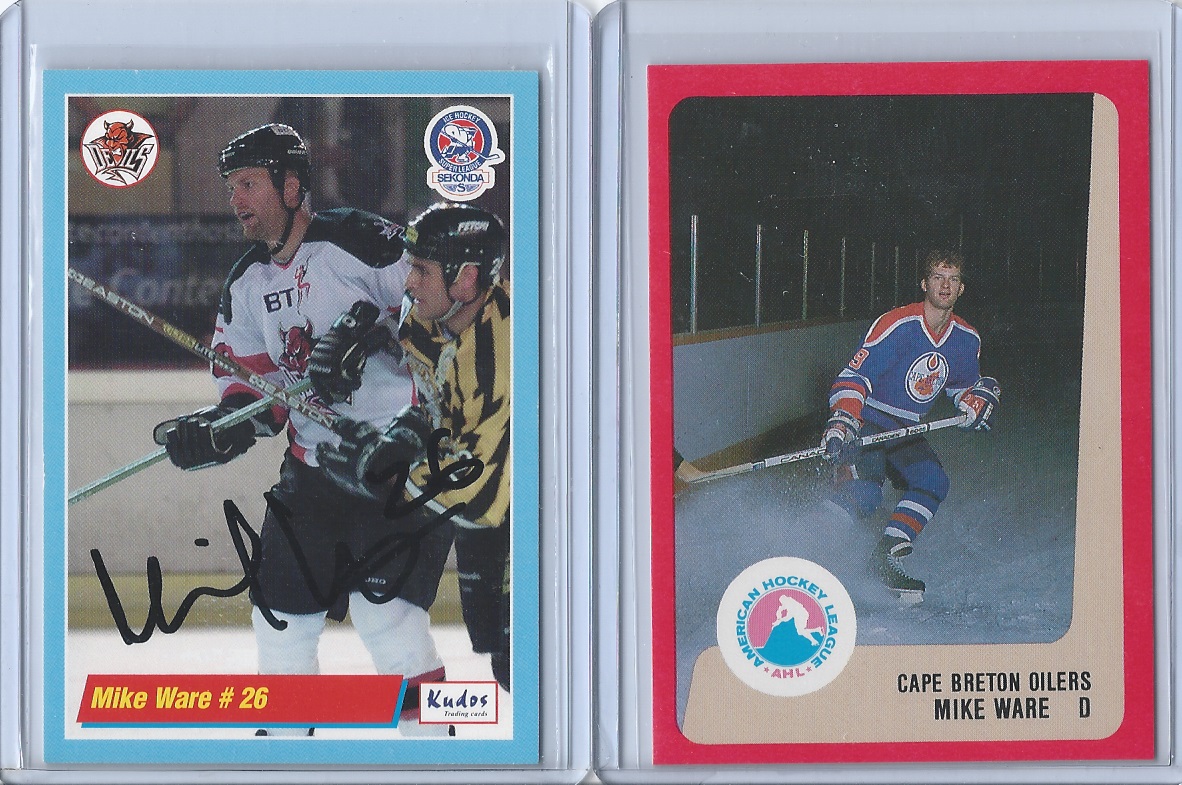
Mike Ware
Mike ware was a hard hitting defenceman, with the Hamilton Steelhawks of the OHL. He racked up 225 PIMs in 57 games in the 84-85 season, and the Edmonton Oilers made him the 62nd overall pick in 1985.
He'd turn pro in the 87-88 season, spending the year with the Oilers farm team in Nova Scotia, averaging nearly 5 PIMs a game (253 in 52).
The 88-89 season continued to see Ware try and fight his was into the NHL. He set a career high in PIMs with 317 (in 48 games) in the AHL, and he played his first two NHL games, getting 11 PIMs & 1 assist for the Oilers that year.
89-90 would see Ware play three more NHL contests, and those would be his last. Following the 90-91 season, he took his game across the pond, and played the next 12 seasons in Europe. Mostly in the British league (Murrayfield, Edinburgh, Cardiff, Sheffield, London), but he did play one season with Hannover in the DEL.
He'd retire following the 2003-04 season with the Cardiff Devils.
Pictured are Ware's first minor league card (never had an NHL card) his 88-89 Pro Cards, showing him with Cape Breton. Also a signed copy of his 00-01 British Superleague card.
1989-90
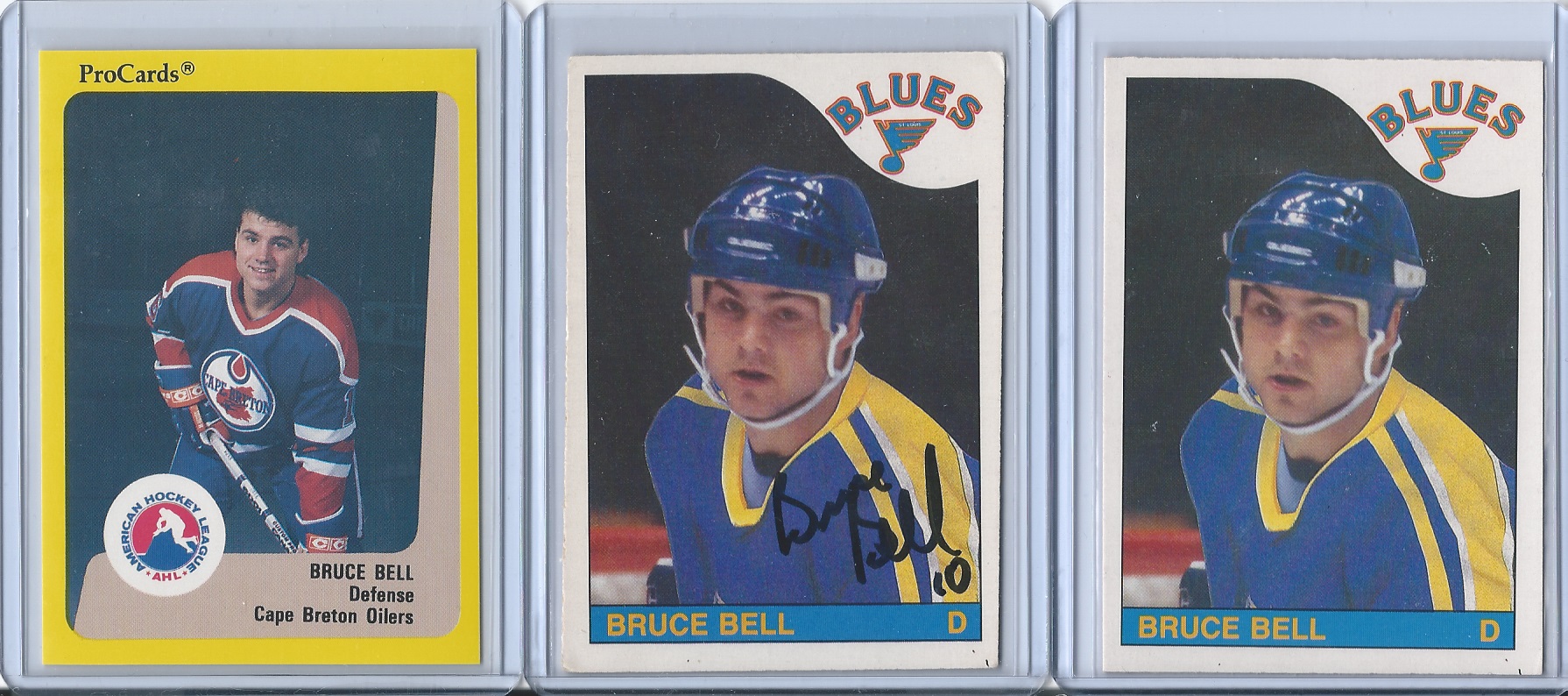
Bruce Bell
Bruce Bell was drafted in the 3rd round, 52nd overall, by the Quebec Nordiques in 1983. He'd make his NHL debut in 1984-85, playing 75 games for the Nords. Regarded as an offensive defenceman, he put up 37 points as a 19 year old that season for Quebec, and was named to the NHL's all-rookie team.
Bell was dealt to the St Louis build in October of 1985, and logged another 75 games for them. His 1986-87 season was cut short by a devastating hit from Leafs' forward Wendle Clark (if you've never seen this hit, look it up!). The Blue would deal Bell to New York Rangers in May of 1987: He'd play only 13 games for the Rangers before getting traded back to Quebec in August of 1988.
The Edmonton Oilers signed Bell prior to the 1989-90 season. He played just a single game for the Oilers (his final NHL contest) and spent most of the year with Cape Breton.
Bell would start the 1990-91 season with the Oilers' AHL club, but was dealt to Minnesota on November 22nd of 1990 - in what may be one of the most important trades in NHL history: The Takko Bell trade (when he was swapped for goalie Kari Takko).
The trio of Bell cards pictured are two copies of his 85-86 OPC Rookie Card (one signed) and a copy of his 89-90 ProCards, showing him with Cape Breton (closest thing to an Oilers card there is)
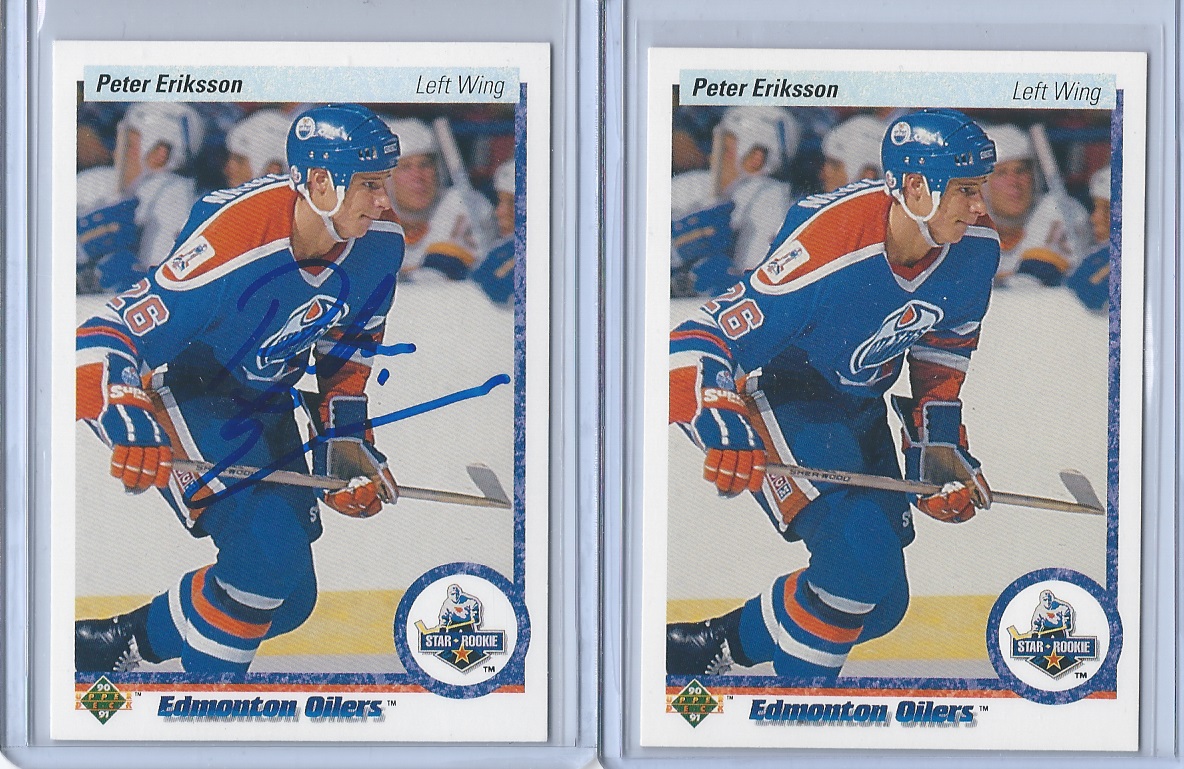
Peter Eriksson
The Oilers made Eriksson the 64th overall pick in the 1987 NHL draft, after he'd been playing for HV71 Jonkoping in the Swedish elite league.
He's spend a couple of more seasons in the SEL, and then joined the Oilers in 1989-90. He'd play 20 games, scoring three times & adding three helpers. He also played 21 games with Cape Breton.
After the 89-90 season, he go back to Sweden where he played another eight seasons. His last professional season was 1997-98, playing for Nurnberg in the German DEL.
Eriksson won a bronze medal with Sweden at the 1988 Winter Olympics.
Pictured are three cards: A signed & unsigned copy of his 90-91 Upper Deck Rookie Card, and his 1995-96 Swedish UD First Division Stars card. Normally I would not add that third card (have the RC, have the auto) but the Rookie Card is NOT actually Peter Eriksson! It's Tommy Lehmann pictured on the card, so picked up a copy of the one card actually made with Peter Eriksson on it. I`m actually surprised he signed it.....
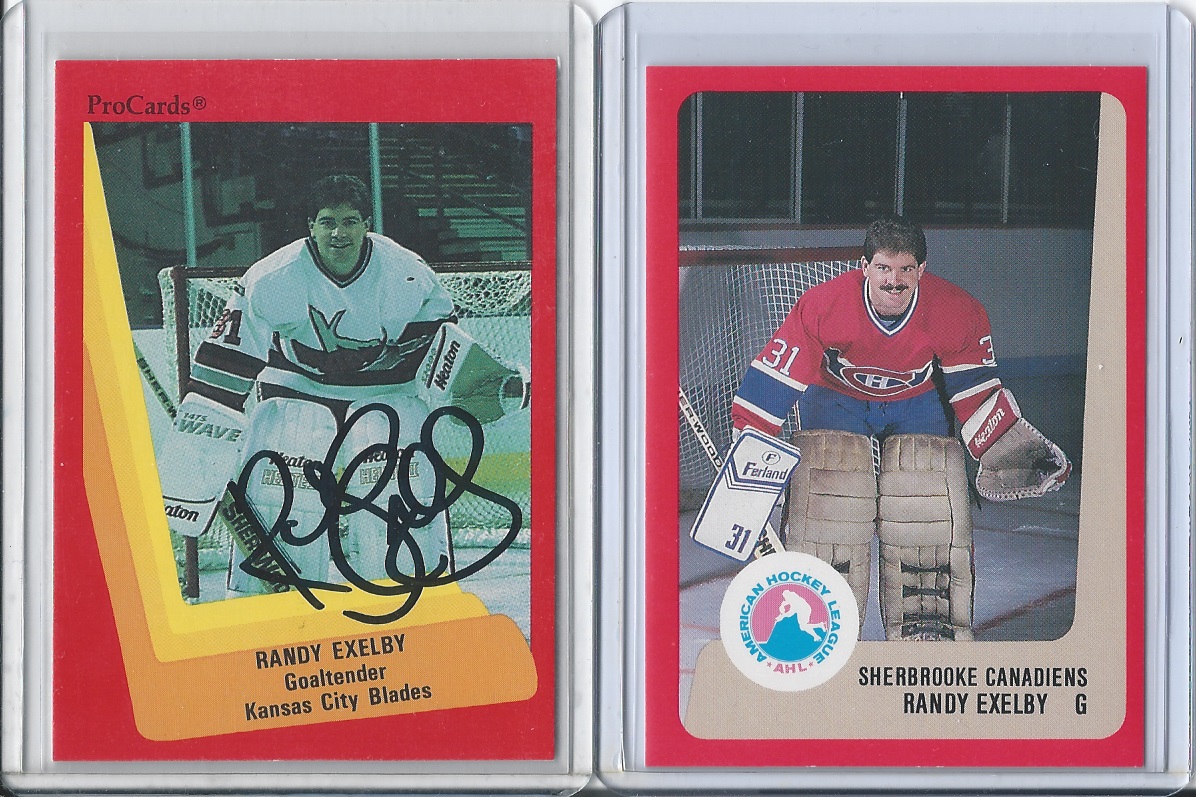
Randy Exelby
Randy Exelby was selected by the Montreal Canadiens in the 1996 Supplemental Draft, after a pair of standout seasons with Lake Superior State University.
Exelby made his NHL debut on January 27, 1989, with the Habs, in a rather unusual way. He entered the game in the 2nd period, because Patrick Roy needed to use the washroom. Once Roy was finsihed, he came back into the game - Exelby made one save in three minutes, and was now in the record book!
He'd be traded the Edmonton Oilers for future considerations the following October. He started a single game with the Oilers, taking the loss, in a 6-3 defeat in Pittsburgh.
Exelby retired following the 90-91 season, after bouncing around in the minors a bit. In 1994 he started a chain of hockey equipment stores in Phoenix, called "Behind the Mask", which is still running strong with three locations in the Phoenix area today!
Pictured are a pair of Exelby Minor League (Procards). His first, 88-89, and a signed copy of his 90-91. He was kind enough to sign this for me TTM.

John Garrett
John Garrett was the 38th overall pick by the St. Louis Blues in 1971. After a couple of seasons in the minors, he'd join the WHA's Minnesota Fighting Saints.
He played in the final six WHA seasons. Along with Minnesota, he also played for the Toronto Toros, Birmingham Bulls, and the New England Whalers. His 148 WHA wins were the most of any goalie in the League's history.
When the NHL & WHA merged, he was tagged as one of the three Priority selections for Hartford, so he remained a Whaler, instead of going back to the St. Louis Blues.
He played two full seasons as Hartford's #1 goalie, and was dealt mid-season in 81-82 to the Quebec Nordiques. He'd be traded again in 82-83 to the Vancouver Canucks. He played his last NHL games in 84-85, before a brief stint with the AHL's Fredericton Express in 85-86.
Garrett then retired. He took the job of assistant GM with the Vancouver Canucks for the rest of the 85-86 season, but joined the CBC as a colour commentator in 1986-87. He has been one of the faces of Canada's national broadcast of the NHL ever since.
So why would John Garrett be in this thread? On February 14th 1990, more than 5 years removed from his last professional game, Garrett was working the Oilers / Capitals game. Grant Fuhr was out due to an appendectomy. Starter Bill Ranford got hurt and was replaced by backup Pokey Reddick. Reddick had hurt himself, but was playing through it. The Oilers were scrambling to find another backup, and Garrett left the broadcast booth to join the team.
Pictured are Garrett's 1975-76 OPC Rookie Card, and ITG Decades 80s Autograph, and a BTP Patch card.
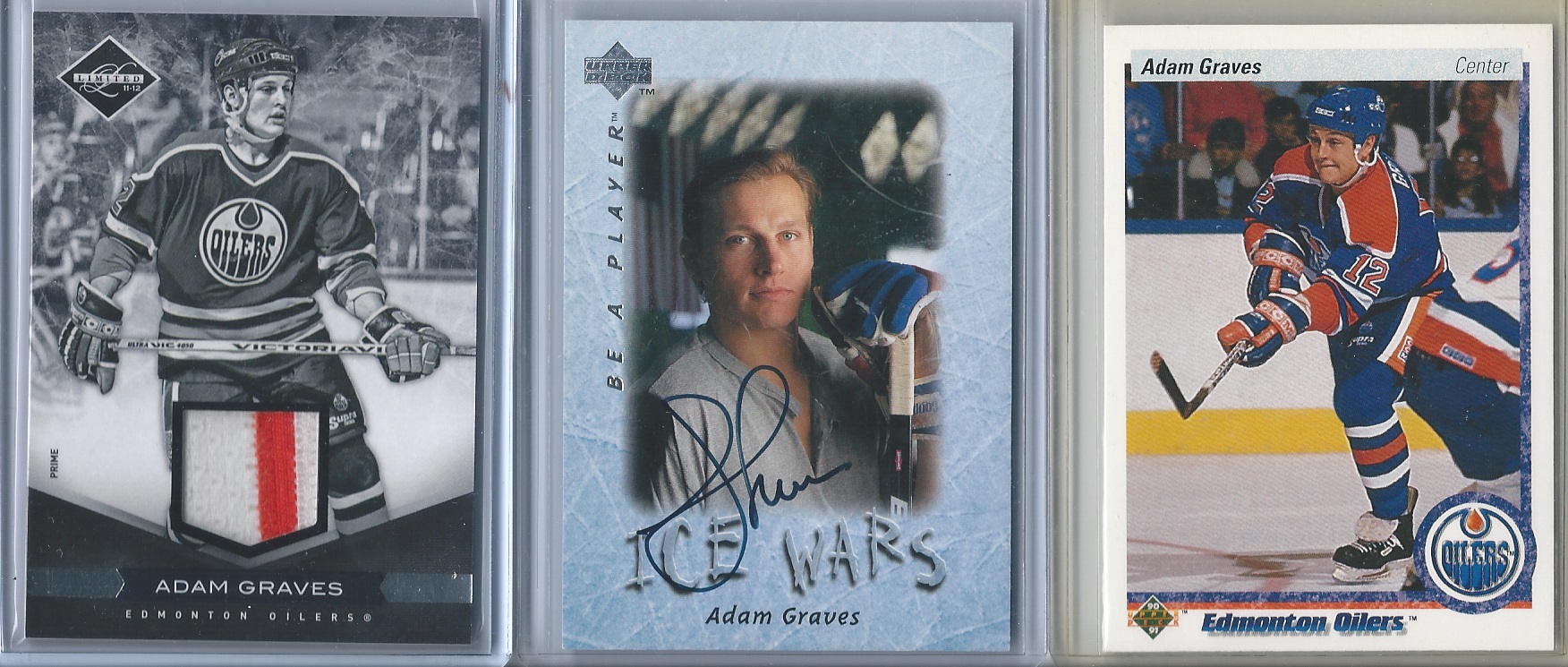
Adam Graves
The 22nd overall pick in the 1986 NHL Entry Draft, Adam Graves was thought to be a building block of the future for the Detroit Red Wings. Things didn't turn out that way.
Graves would make his NHL debut in 1987-88 with the Wings, and spent the bulk of the 88-89 season with them, scoring his first 7 NHL goals, over 56 games.
The 1989-90 season started with Graves going scoreless in 13 games, and then he was included in a blockbuster!
Disgruntled Jimmy Carson was dealt from Edmonton, along with Kevin McClelland & a draft pick, for Petr Klima, Joe Murphy, Jeff Sharples, and Graves.
Graves became a regular with the Oilers, and scored nine times for them that year, adding five more in the playoffs, helping the club win its 5th Stanley Cup in seven years.
Graves would only play one more season in Edmonton, 1990-91, scoring 7 times over 76 games.
He'd sign an offersheet with the New York Rangers, signing a 5 year deal worth 2.44 million. The Oilers declined to match, and were awarded Troy Mallate as compensation.
Was it a good move for Graves? He'd join the Rangers in 1991-92. He was already a veteran of 217 NHL games, scoring 26 times. In 91-92 he matched his career total, scoring 26!
Graves would add 36 the following season, and then had a career high 52 in 1993-94. He added 10 more in the playoffs, and became a two-time Stanley Cup winner, when the Rangers ended their 50 year drought.
Graves played with the Rangers through the end of the 00-01 season, breaking the 20 goal mark eight times, with four of those being 30+, and one of those being the 52 goal season. Safe to say that going to New York was a good move.
He'd end his career with the San Jose Sharks, playing the 01-02 & 02-03 seasons there.
He retired with 1152 NHL games played, and 329 goals. His #9 would be retired by the New York Rangers.
Graves already represented Canada four times: Winning Gold at the 1988 WJC, finishing 4th at a pair of World Championships (1993, 1999), and he was part of the silver medal winning team at the 1996 World Cup of Hockey.
Pictured are his 90-91 Upper Deck Rookie Card, his 1994 BAP Autograph, and an 11-12 Panini Limited Materials.
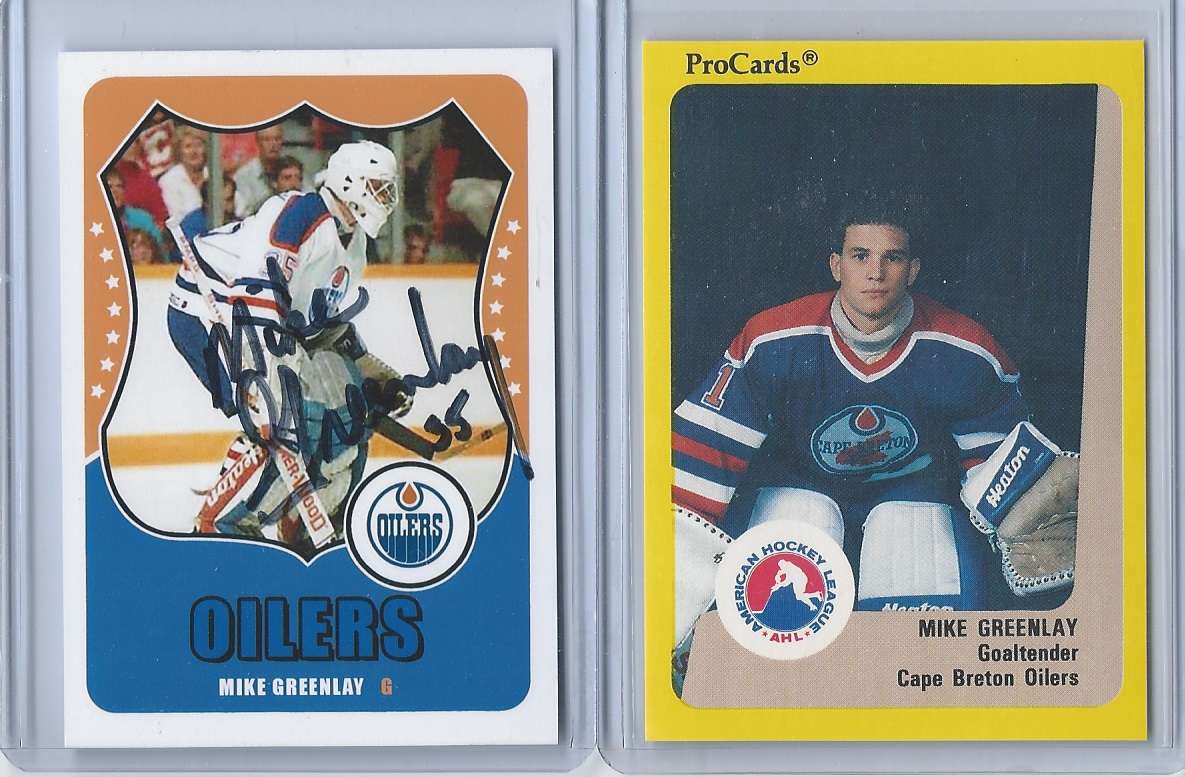
Mike Greenlay
Mike Greenlay was drafted 186th in the 1986 Entry Draft by the Oilers, after playing for the Calgary AAA Midgets.
Instead of going pro immediately, he'd play three seasons with the Lake Superior State, in the NCAA, where he (and future Oiler, Jim Dowd) helped the Lakers win the 1988 NCAA Championship.
Greenlay started two games for the Oilers in 1989-90, becoming the first Brazilian born player to make the NHL (only Robyn Regher has added to that list since).
Those would be Greenlay's only two NHL games, but he had a stellar career in the minors. Along with Edmonton's AHL club in Cape Breton, he had stops with Knoxville & Louisville in the ECHL, Atlanta & Houston in the IHL, and Hershey in the AHL.
His minor league career was highlighted in 1994, when he shared the James Norris Memorial Trophy with teammate JC Bergeron, for allowing the fewest goals in the IHL. He also led all post-season goalies in wins, helping the Atlanta Knights win the Turner Cup.
After retiring, Greenlay got into broadcasting. He's currently the colour commentator for the Minnesota Wild.
Pictured are Greenlay's 1989-90 Procards (his first minor league card), and a signed custom card he was kind enough to return to me TTM.
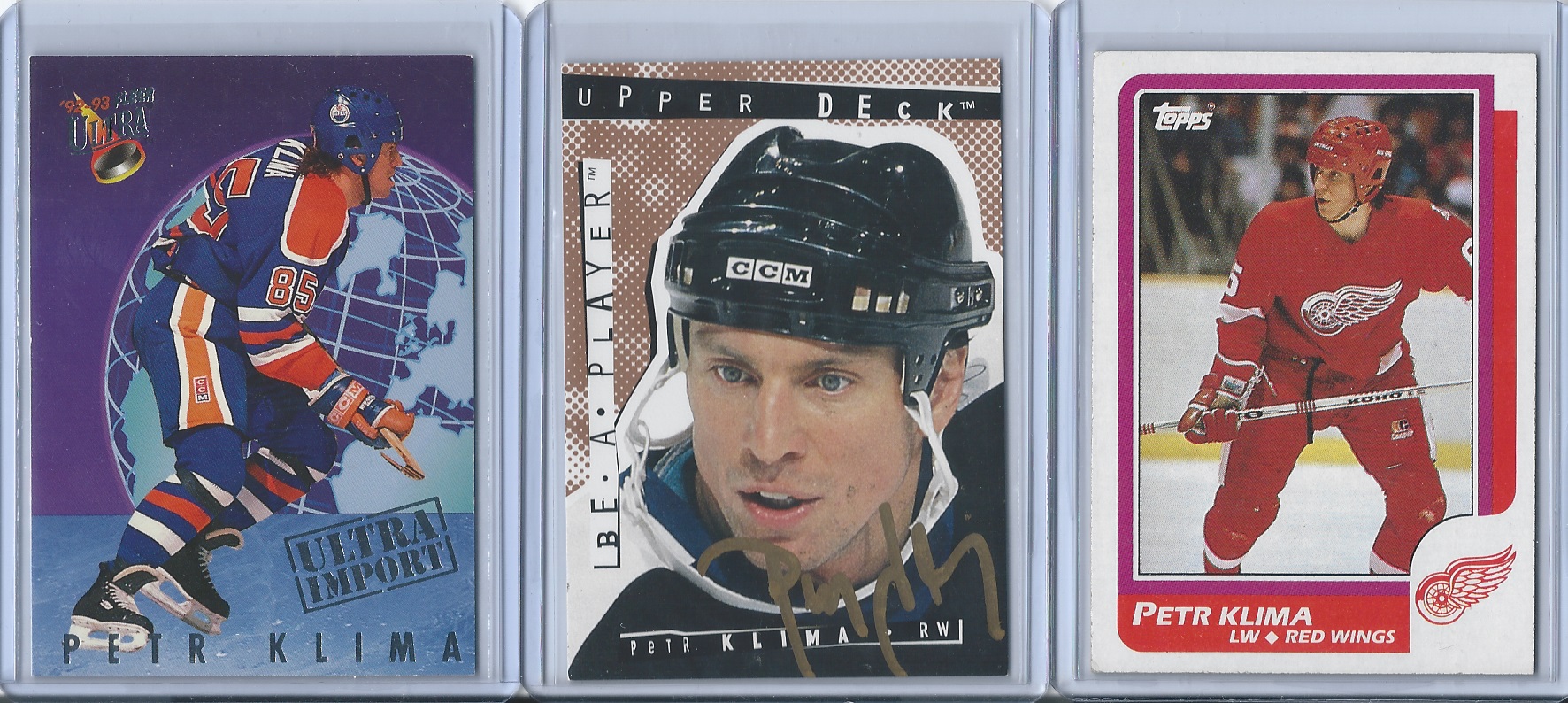
Petr Klima
The Detroit Red Wings select Petr Klima in the 5th round of the 1983 NHL Entry Draft. In 1985 he became the first Czechoslovakian born player after the Stastny brothers to defect straight to an NHL team. He scored 32 goals in 74 games as an NHL rookie (with Detroit) in 1985-86, and followed that up with 30 & 37 goal seasons.
Injuries held Klima to 25 goals in 88-89, but he started the 89-90 season with Detroit, scoring 5 in 13 games: Pacing himself to break 30 again. He was traded to the Edmonton Oilers on November 2nd, along with Adam Graves, Joe Murphy, and Jeff Sharples - for disgruntled centre Jimmy Carson, tough guy Kevin McClelland, and a draft pick.
Klima would score 25 goals for Edmonton in 89-90, giving him 30 on the season - breaking that mark for the 4th time in his 5 year career. In Game 1 of the Stanley Cup finals, Klima would score the most important goal of his career: The triple overtime winner, in what was the longest Stanley Cup Final game ever played (still is, today).
1990-91 was the highest scoring season of Klima's career, when he scored 40 goals. Injuries limited him to 21 in the 91-92 season, but he scored 32 in 92-93. He'd be traded to the Tampa Bay Lightning in the summer of 1993, where he scored 28, 13, and 22 goals in his three seasons. The 1996-97 season saw Klima bounce around: He was traded to LA during the summer, but was then dealt to Pittsbrugh midseason. He was waived, and calimed by the Oilers: He played 16 games in his second Oilers stint, scoring just once.
Klima would play in Germany for the 97-98 season, but returning to Detoit (and their AHL club) for the 98-99 season, when he played his final 13 NHL games, scoring just once. He'd take a couple of years off before joining Litvinov HC in the Czech republic. He was in his late 30s, but still put up 37 goals across two seasons. He retired following the 2002-03 season.
Pictured are three cards of Klima: His 86-87 OPC Rookie Card, his 92-93 Ultra Imports Insert, and his 94-95 BAP Autograph.
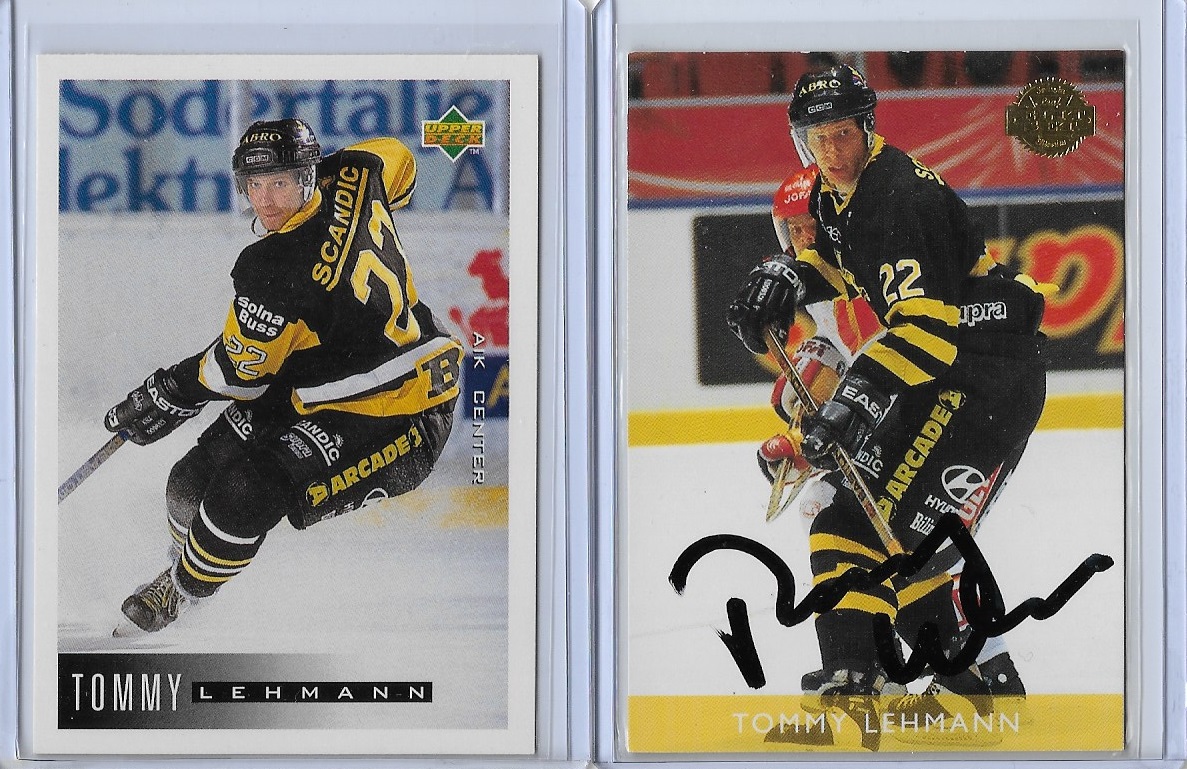
Tommy Lehmann
Tommy Lehmann was drafted in 1982, by the Boston Bruins, 228th overall. He'd play five seasons for AIK in the Swedish Elite League before joining the Bruins for the 1987-88 season.
He'd play 35 games for the Bruins over two seasons, spending most of the 87-88 and 88-89 seasons with their AHL club, the Maine Mariners. In the summer of 1989, the Edmonton Oilers would trade a draft pick for Lehman. He played a single game for the Oilers in 89-90, splitting the rest of his time between Cape Breton (19 regular season, and 6 playoff games) and AIK in Sweden (22 regular season, 3 playoff games). He was done in North America after that, and played another six seasons in the SEL.
Pictured are two cards: Lehmann's 1995-96 Upper Deck SEL (closest thing to a RC that's out there) and a signed copy of his 95-96 Leaf SEL. Want to see more of Lehmann? Scroll back up and read Peter Eriksson again!
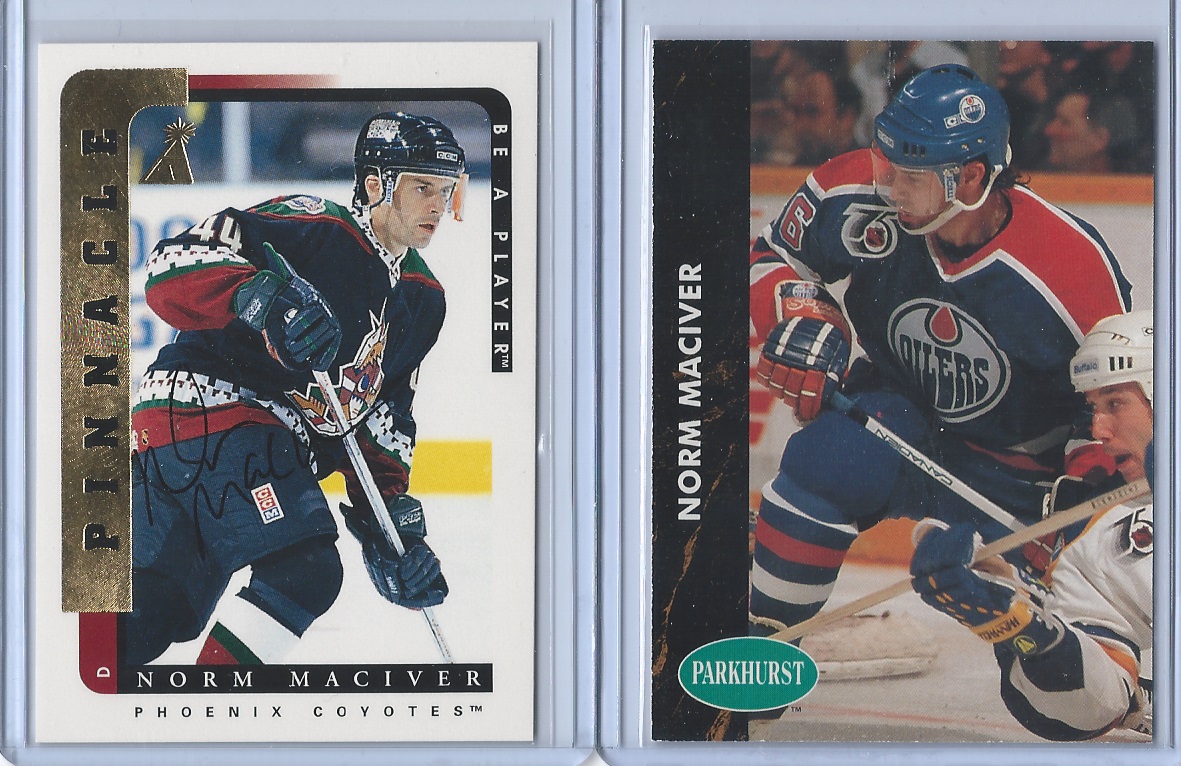
Norm MacIver
Norm MacIver was not drafted by an NHL franchise and instead took the university route in order to reach the NHL. The defenceman played four seasons with the University of Minnesota Duluth, where he was a two-time All American and a finalist for the Hobey Baker Award. He signed as a free agent with the New York Rangers upon graduation, and made his NHL debut in 1986-87.
After a couple of seasons in the Rangers organization, MacIver was traded to Hartford in December of 1988. He'd start the 89-90 season with Binghamton (the Whalers' AHL affiliate) but after just two games was traded to the Edmonton Oilers for Jim Ennis. He spent the bulk of the season with Cape Breton, but made his Oilers debut on October 28th of 1989 - the only NHL game he played that season.
MacIver's role expanded with the Oilers the following year. He played 21 games for them in 1990-91, and in 91-92 he played 57 games (without an assignment to the minors). The Ottawa Senators would select him at the league's annual waiver draft in 1992, and he played in all 80 games for the Sens that season. Ottawa would later trade him to Pittsburgh in 94-95, and the Penguins dealt him to Winnipeg a year later. He moved with the Jets to Phoenix, and his last NHL game in 1997-98 was as a member of the Coyotes. He'd play one more season with the Houston Aeros of the IHL in 98-99, before retiring.
Since haning up his skates, MacIver has gone into coaching & management. He was an assistant coach from 2000-2003 with the Springfield Falcons in the AHL, and then from 2003-2006 with the Boston Bruins in the NHL. The Chicago Blackhawks made him their director of player development in 2006, and then of player personnel in 2011. He's been the 'Hawks assistant general manager since the 2012-13 season.
Pictured are MacIver's 1991-92 Parkhurst Rookie Card, and his 97-98 BAP Autograph.
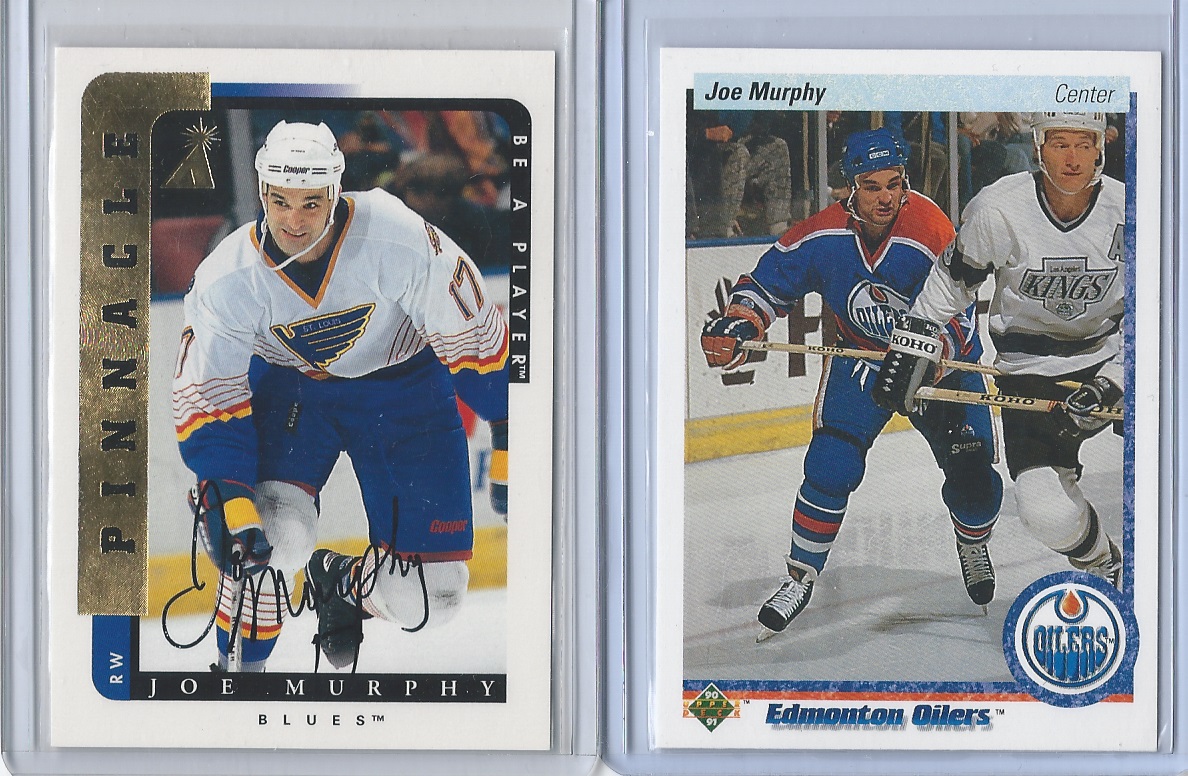
Joe Murphy
At the 1986 NHL Entry Draft, the Detroit Red Wings made Joe Murphy the first NCAA player to be selected 1st overall. He's one of very few players to have won a Stanley Cup (Edmonton, 1990), a Calder Cup (Adirondack, 1989) and an NCAA Championship (1986). He played 8 games for the Canadian National Team in 1985-86, before he was even drafted.
Murphy turned pro right after the draft, and played 71 games for the Red Wings farm team in Adirondack the following season, popping a pretty respectable 21 goals & 59 points. He had a single assist in his 5 game call up with the Red Wings that season, but the #1 pick made his NHL debut.
The next two seasons were split between the Wings, and the baby Wings. He scored 10 goals for Detroit in 50 games, in the 87-88 season, and once in 26 games during the 88-89 season.
1989-90 saw Murphy finally make it as a full time NHLer. He never spent another day in the minors, however nine games into the regular season he was traded from Detroit to Edmonton.
Murphy was part of the bounty that the Oilers received for disgruntled Jimmy Carson. He scored 7 times for the Oilers in 62 games, but nearly matched that total with 6 in 22 playoff games, helping the Oilers win their 5th Stanley Cup in 7 years.
Murphy spent two more seasons in Edmonton, scoring 27 time in 90-91, and a career high 35 (82 points) in 1991-92.
Looking for a new contract, Murphy held out to begin the 1992-93 season. Eventually the Oilers traded him, rather than paying him what he wanted. He was sent to Chicago for Dean McAmmond and Igor Kravchuck. The trade was in February, so he was only able to play 19 games that year, but he did score 7 times, and added 10 helpers.
The next two seasons saw Murphy continue to score at the same near-ppg clip. He had 70 points in 81 games, and then 41 in 40. The 1995-96 season his production tailed off a bit, but he still broke the 50 point mark.
He was without contract again, and this time a UFA. He'd opt to sign a 3 year / 10 million contact with the St. Louis Blues. His 20 goals / 45 points in 1996-97 were a little less than what the Blues expected, and after scoring just 4 times in 27 games in 1997-98 season, he was traded to San Jose for Todd Gill.
With the Sharks in 98-99, Murphy had his highest goal total since 1993-94, when he scored 25. He'd leave at the end of the season and sign a deal with the Boston Bruins.
Murphy played just 26 games for Boston, scoring 7 times, before he claimed on waivers by the Washington Capitals. He played 29 games for the Caps that year, and another 14 in 2000-01, before retiring.
Murphy's stat line may not read like the bonafide scorer he was expected to be with a #1 pick, but 779 GP, 223 G, 296 A, 528 P, over a 15 year NHL career is pretty solid.
Murphy worked in minor hockey for a while, but sadly ended up homeless. Multiple concussions have lead to personality changes, headaches, and substance abuse. A TSN documentary was done on him, called "Finding Murph". He acknowledged that despite earning over $15 million playing hockey, he was homeless. Like many with mental health issues, he refuses help, and is still struggling with this today.
Pictured are Murphy's 1990-91 Upper Deck Rookie Card, and his '97 BAP Autograph
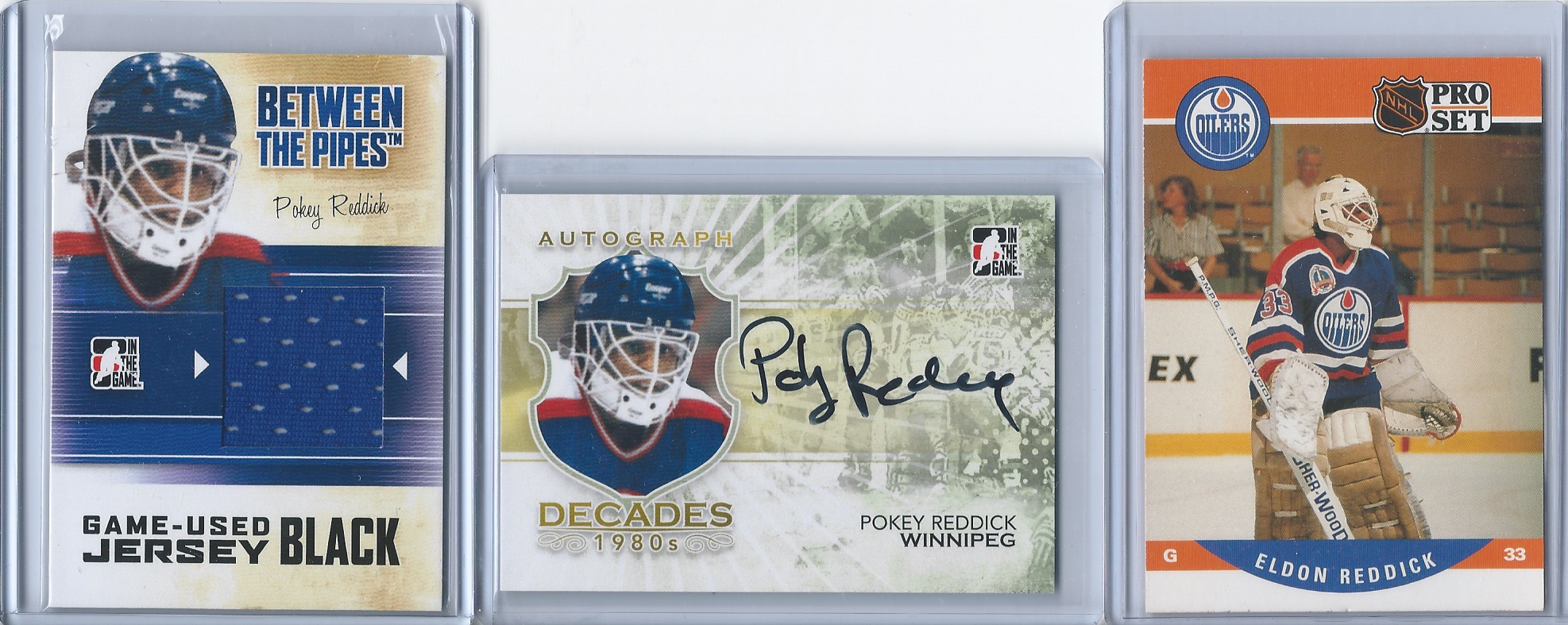
Pokey Reddick
Eldon "Pokey" Reddick played a single game of Major junior in 81-82 for the WHL's Billings Bighorns, and then bounced from Nanaimo, to New Westminster, to Brandon for the next three season. Was always the started, but played only a single season in each city.
He wasn't drafted, and joined the Fort Wayne Komets of the IHL for the next two seasons, along with a short stint with the Sherbrooke Canadiens.
He signed with the Winnipeg Jets, and joined them for the 1986-87 season, going 21-21-4 as a rookie. He & fellow goalie Daniel Berthiaume were nicknamed "Pokey and the Bandit".
In September of 1989, he was traded to the Edmonton Oilers. He joined the Oilers to backup Bill Ranford - his old teammate (and backup) from New Westminster. He played 11 games that year, and was part of the the 1990 Stanley Cup winning team. He'd play two more games for the Oilers in 1990-91, spending most of that season with Cape Breton in the AHL. He was eventually cut lose during the 91-92 season (after playing more for Cape Breton) and signed with the Fort Wayne Komets of the IHL.
With Fort Wayne, he became the only goalie to go undefeated through a three-round playoff system. The 1992-93 playoffs saw him go a perfect 12-0, with a 1.49 GAA, leading the Komets to their first championship in 20 years.
He'd play in his two final NHL games in 1993-94 with the Florida Panthers, but kept his pro-career going. He had stops in Cincinnati, Las Vegas, Grant Rapids, San Antonio, Kansas City, and another year in Fort Wayne (all in the IHL) through the end of the 1998-99 season. He'd head across the pond and play three season with the Frankfurt Lions in the German DEL, before one finals season with Fort Wayne in 2002-03
Pictured are three cards of Pokey: His 1990-91 Pro Set Rookie Card, and ITG Decades autograph, and an ITG Between The Pipes jersey card.

Vladimir Ruzicka
Vladimir Ruzicka begame his pro-career with Litvinov, in Czechoslovakia in 1979-80, turning pro at the age of 16. Too young to play? He scored 10 seconds into his first game. He'd be drafted by the Toronto Maple Leafs in 1982, but the communist government in Czechoslovakia wouldn't let him leave.
Playing for his country in the 1980s, Ruzicka helped Czechoslovakia win gold at the worl championships in 1985 (he was a tournament all-star), and would later be part of the Czech Republic's gold medal winning Olympic team in 1998. He was twice named player of the year ('86 and '88) in the Czechoslovakian league.
He would make his way to North America in 89-90, but it would it wouldn't be with the Leafs who drafted him. They flipped him to the Edmonton Oilers for a draft pick. Ruzicka played 25 games for the Oilers that year, and scored 11 times. He was given a Stanley Cup ring that season, but his name was not engraved on the cup, due to his limited regular season, and no playoff games.
The Oilers would trade him to Boston the following season, where he'd play for three more years. He joined the Ottawa Senators in 93-94, his final season in the NHL.
After that, he went home to the Czech Republic and played six seasons for Slavia Praha, a team that he's since gone on to become the head coach of.
Pictured are Ruzicka's 1990-91 Topps Rookie Card, and a signed copy of his 92-93 Upper Deck.
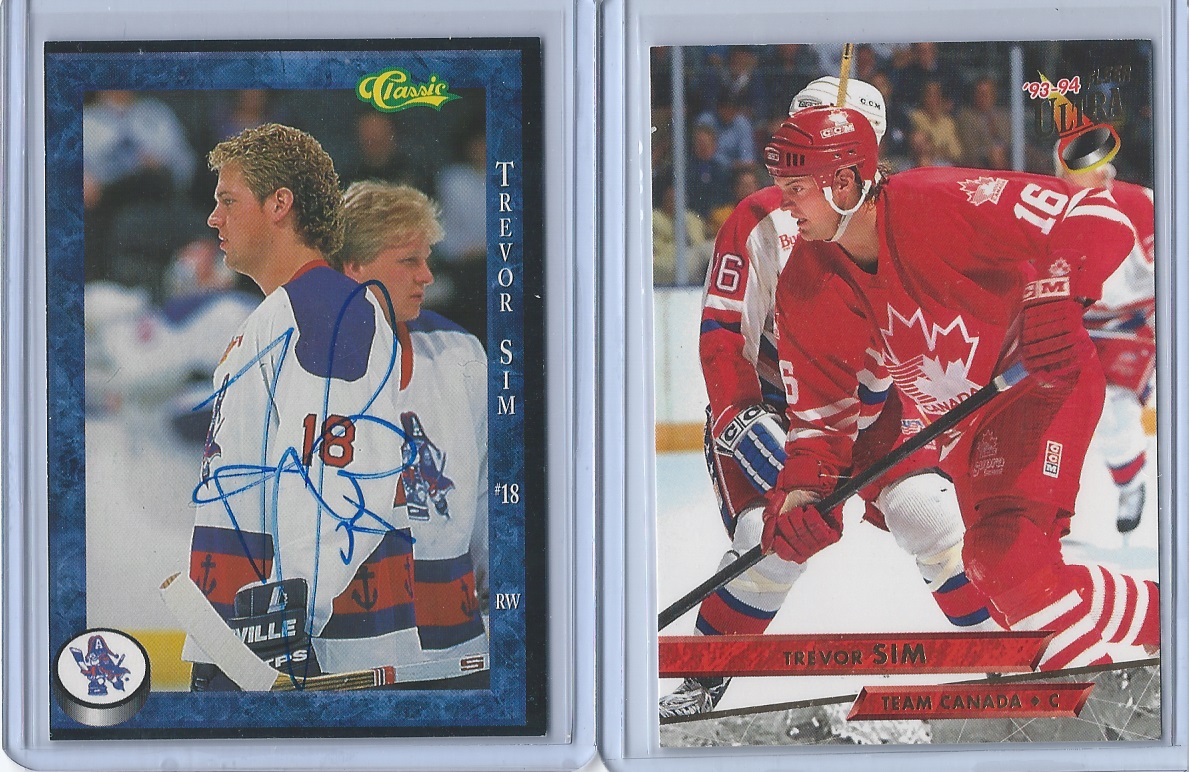
Trevor Sim
Trevor Sim played junior hockey for four different Western Hockey League teams and was part of the Swift Current Broncos team that won the 1989 Memorial Cup. He was selected by the Edmonton Oilers in the third round of the 1988 NHL Entry Draft, and made his National Hockey League debut in the 1989–90 season. Sim played in only three games with the Oilers and scored one assist. He was assigned to the minor league affiliate Cape Breton Oilers for the following season.
Sim played for the Canada national men's ice hockey team from 1992–94 and participated in the 1994 Winter Olympics. He spent the remainder of his career playing for teams in the AHL, ECHL, IHL, and had a brief stop in Asiago, Italy.
Pictured are a pair of Sim's cards: his 1993-94 Fleer Ultra Rookie Card (showing him with the Canadian Olympic team) and a signed copy of his 1994-95 Classic Milwaukee Admirals card.
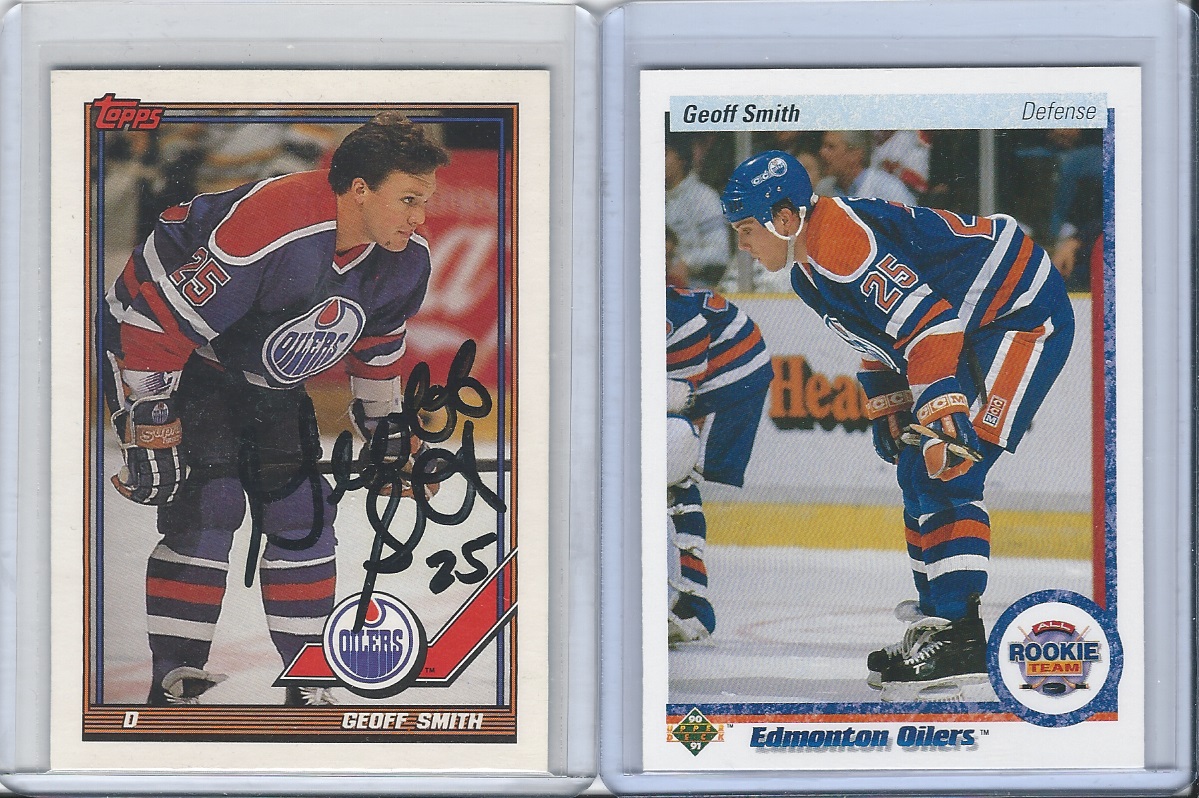
Geoff Smith
Geoff Smith was drafted in the third round, 63rd overall, in the 1987 NHL Entry Draft by the Edmonton Oilers. He'd make his NHL debut in 1989-90, logging 74 regular season games, and helping the club with it's 5th Stanley Cup.
He was a mainstay on the Oilers' blueine until mid-way through the 1993-94 season, when they dealt him to the Florida Panthers for a draft pick. He'd play the next three seasons with Florida, and then signed as a free agent with the New York Rangers. He spent the 97-98 & 98-99 seasons back & forth between the NHL & the minors. The Rangers would eventually deal him to St Louis, though he never suited up for the Blues.
Smith also represented Canada twice internationally: He was on the 4th place Canadian squads at both the 1989 World Junior Championship, and the 1993 World Championship.
Pictured are Smith's 1990-91 Upper Deck Rookie card, and a signed copy of his 1991-92 Topps.
And with that, we're at the end of the dynasty Era. I hope it takes me well under a year to make my next post in this series!
-

















 Reply With Quote
Reply With Quote




